
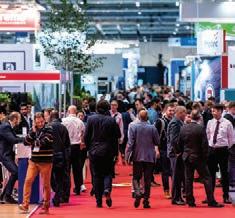





FACILITIES MANAGEMENT JOURNAL VOLUME 30 | 04 APRIL 2022 INTERVIEW Rory Murphy on the RICS’ new working group FACILITIES SHOW A look ahead to May’s big event 40 28 CASE STUDY Bringing NHS catering back in house 24 O cial magazine FM Clinic: How is the FM sector meeting calls for the provision of inclusive washrooms? WINDS OF CHANGE Built environment on the road to net zero
Our 5th generation HydroTap can help workplaces to achieve their sustainability goals while providing users with pure tasting instant filtered boiling, chilled and sparkling drinking water.

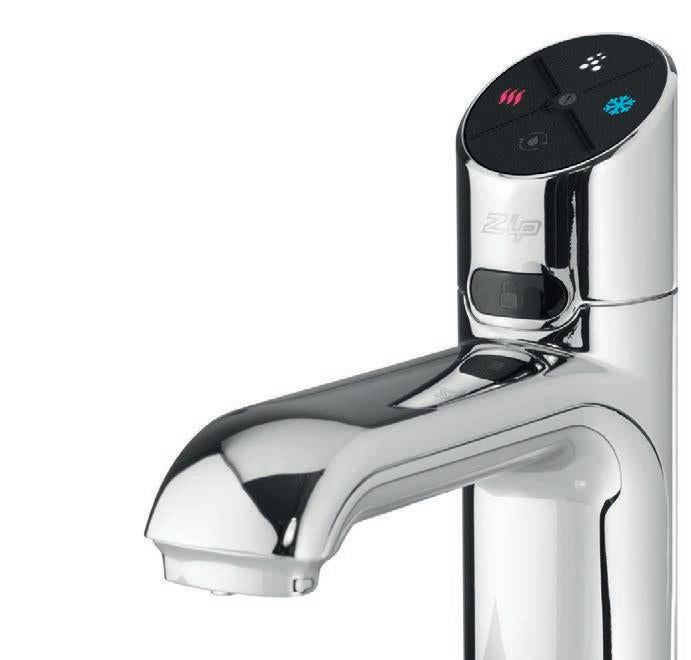
Reduce reliance on single-use plastic water bottles with instant access to pure-tasting filtered water due to 0.2 micron MicroPurity filtrationTM


No water wastage in the cooling process due to the air-cooled system
Features such as the LUX (light) sensor, programmable timer and sleep mode help to conserve energy during periods of low or non usage.
Reduce environmental impact due to the use of R290 refrigerant gas that has a low Global Warming Potential (GWP).










Choose
NEW: Classic Plus tap With SteriTouch
touchpad
kill 99.99%
a choice
or
Call 03456 005005 for more information Scan the QR code to find out more
sustainable drinking water with the Zip HydroTap G5
embedded on the
to
of bacteria. With
of hygiene-centric tap designs, the Classic Plus
Touch Free Wave, you can be sure all users are kept safe.
Why choose HydroTap G5?
kpm media Unit 1 Mill Place, Platt Business Estate, Maidstone Road, Sevenoaks, Kent TN15 8TB Tel: 01322 662289
Editor Sara Bean sara.bean@kpmmedia.co.uk
Assistant Editor & Social Media Development Sarah O’Beirne sarah.obeirne@kpmmedia.co.uk Tel: 01322 476815
Director & Designer Warren Knight warren.knight@kpmmedia.co.uk Mob: 0780 1947757
Sales Director Danny Grange danny.grange@kpmmedia.co.uk Mob: 07867 418994
Business Administrator Sami Smith sami@kpmmedia.co.uk
Accounts Trish Boakes accounts@kpmmedia.co.uk Group CEO Nigel Copp nigel.copp@kpmgroup.co.uk

Editorial steering committee
Alan Hutchinson, Facilities Director, Howard Kennedy LLP
Charles Siddons, Head of Operations, NHS Property Services
Darren Miller, Head of EMEA Facilities Operations, PayPal
Ian Wade, Head of UK Estates, British Medical Association
Lucy Hind, Senior FM Lecturer, Leeds Beckett University

Marie Johnson, Head of Workplace & Wellbeing, Nominet
Russell Wood, Facilities Manager at Dentsu Aegis Network
Russell Burnaby, Head of FM, Regeneration and Environment, Brent Council
Simon Francis, Principal Lead, Estates and Masterplanning, ZSL
Simone Fenton-Jarvis, Workplace Consultancy Director at Relogix
Stephen Bursi, Facilities Lead, BAE Systems
Stephen Vagg, Head of Estates and Strategy, National Express Group PLC
Vicky Thorp, Head of Facilities Management, CLSH Management
kpm media adopts a sustainable policy of using paper from managed forests. Printed in the UK by The Gemini Print Group www.gemini-print.co.uk
© Copyright 2022 kpm media
The publisher does not necessarily agree with the views and opinions expressed by contributors. No material may be reproduced in part or whole without written permission from the editor. Editorial contributions are accepted on an all-rights basis only. Letters to the editor may be published in their entirety or in edited form and remain the property of kpm media. While due care is taken to ensure the accuracy of information contained in this magazine, the publishers cannot be held responsible for any errors in editorial articles or advertisements. Subscriptions are available to non-qualifying and overseas readers at £120 p.a. (UK), £160 p.a. (EU countries) and £240 p.a. (overseas-other).
this month...
comment

You can begin to sense a return to normality with – after three years - the long-awaited return of the Facilities Show (see preview page 28) in May. To discover the challenges and opportunities FMs anticipate for the future, FMJ and show organisers Informa teamed up to conduct a survey on how FMs and their organisations have responded to the disruption and their plans are the future.
Were they asking workers to return to the o ice on a hybrid home/o ice work basis? Did they intend to redesign workspaces to enable more flexible ways of working? And have their workplace strategies, including wellbeing and engagement had to be radically rethought? We’ll do a deeper dive into the results next month, but so far there have been some fascinating insights into the realities of supporting new ways of working.
One respondent noted that open plan workspaces aren’t always a practical option when you consider the number of zoom/team’s meetings required to enable hybrid working.
Another has put plans to relocate to a new workspace on hold until they have gathered a full six months of data in o ice space requirements.
Echoing many of the discussions at the world’s leading real estate conference MIPIM (page 36) another respondent felt that COVID has brought the FM/CRE agile workplace agenda forward. As with many in FM and CRE, they aim to improve utilisation in their portfolio and look at ways of reducing their o ice footprint to drive cost savings and improve environmental credentials.
Yet no matter how much has shi ed over the past two years, the facilities management remit remains largely unchanged. The survey found that health and safety, compliance, building maintenance management, strategic planning & project management, security and cleaning remain the top six priorities for FMs. Get those key areas right and sustainability, wellbeing and improved organisational performance should follow.
As always, we’d welcome your feedback about any aspect of the magazine, together with your insight into what’s happening in the FM sector.
sara.bean@kpmmedia.co.uk
APRIL 2022 3 FMJ.CO.UK
Total Average Net Circulation 10,641 July 2020 to June 2021 SUPPORTED BY
FACILITIES MANAGEMENT JOURNAL JOBS Find your next role with the FMJ Jobboard Visit jobs.fmj.co.uk for hundreds of roles in FM and associated industries jobs. fmj.co.uk EDITORIAL COMMENT

















Fast • Effective • Clean Our most advanced and exciting FloorCare technology has arrived... Find out more visit: numatic.com/244NX 70% Saving in Cleaning Costs 80% Lower Water Usage *70% saving in cleaning costs and 80% lower water use vs traditional mopping, see website for more details. ©Numatic International Limited 2022. Specification subject to change without prior notice. numatic.com
NEWS & ANALYSIS
FMJ NEWS


06
ASSOCIATION NEWS

08
EVENT REPORT
10
Environmentally friendly deliveries and supply chains play an important part in building a sustainable future argues Rosie Bailey, Commercial Director at CitySprint.


COMPLIANCE
‘Act responsibly or face he y financial and legal consequences’ is the message from the government in the latest amendments to The Building Safety Bill says Conor Logan Technical Director, Colt.
FAST FACTS
Stefano Bensi, General Manager EMEA at So Bank Robotics, on the results of a recent study to establish the e ects of vacuuming on airborne particulates.


BLOG & SOCIAL MEDIA

Louise Hosking Director of Hosking Associates and IOSH President says it is time to catch the wave with IOSH – or risk getting le behind.
FM CLINIC
We asked a group of experts, what more should the FM sector be doing to ensure that calls for more inclusive toilets in both workplaces and public buildings are being met?
FACILITIES SHOW PREVIEW


and
as they’re front and centre in ensuring a safe return to the workplace
CORPORATE REAL ESTATE
36 The world’s leading real estate conference MIPIM returned in March, and the need to meet ESG objectives formed the backdrop for much of the discussions.
INTERVIEW
Rory Murphy, Commercial Director at VINCI Facilities and a fellow of RICS on his chair of the institute’s new member engagement, experience and value (MEEV) working group.
ENERGY MANAGEMENT




44 Embodied carbon is an important barometer through which to strategise and measure net zero action says Kevin Mcguane, Sector MD, DMA Group.
WASHROOMS
46 Paul Mulready of Northwood Hygiene Products advises that with a return to o ices and public spaces, it’s vital to ensure that washrooms are clean, hygienic and e iciently run.
HEALTH & SAFETY
Air purification systems can help to safeguard against germs and viruses, and could o er wider benefits for the wellbeing of occupants says Tim Browning of Fellowes.
MIFM
New product and service launches and company news from the FM industry.







Next Edition
In May, don’t miss our in-magazine coverage of the Facilities Show 2022, which includes an informative guide to the highlights of the show, including the latest solutions on the stands and a who’s who of speakers at the seminar theatres. We present the results of the fi h FMJ/Grundon survey into how FMs approach their waste management and recycling responsibilities; how facilities managers can ensure they are making environmentally responsible purchases in supporting the circular economy; and assess the challenges and opportunities for FMs in integrating ESG into their organisations. We’ve an interview with Despina Katsikakis, Global Head of Workplace, Cushman & Wakefield on the ways the workplace is evolving and present a case study on the brand-new international HQ in Dublin for the global sports betting and gaming company Flutter Entertainment.
sara.bean@kpmmedia.co.uk
To register for your free copy of FMJ visit fmj.co.uk

APRIL 2022 5 FMJ.CO.UK
THIS MONTH...
40
PEOPLE 59 Find out who’s moving where in the facilities management profession. RECRUITMENT 60 Over the last few years, enthusiasm for switching to a four-day work week has grown. Hannah Jackson of Henley Training asks, is this style of working beneficial for the FM sector? TRAINING 61 AI is making its way into learning and development, allowing companies to further invest in their greatest asset – their people, says Cornerstone’s Michael Baker. CAREERS NEWS 62 A brief roundup of the latest careers news in the facilities management sector. CASE STUDY 24 Ashford and St Peter’s Hospitals NHS Foundation Trust partnered with FM consultants Neller Davies and workplace caterer BM to bring catering services back in-house.
28 The return of the Facilities Show to London’s ExCeL in May, o ers delegates a range of ideas and solutions for making the profession more sustainable and drive transformation. CLEANING 34 Cleaners are essential workers says James Carver, Managing Director of OSC,
48
FEATURES 28 FM CAREERS 61
50
COMMENT 12
14
16
18
20
ADVICE AND OPINION 12
This month’s summary of everything that has hit the headlines in the FM sector.
The latest news and views from RICS and IWFM.
CONTENTS Follow us on Facebook
Twitter @FMJtoday
Workplace Trends Research Summit 2022 presented the latest research into work and the workplace.
LEGAL VIEW
HALVING RESIDUAL WASTE BY 2042: WHAT CAN FMS DO?



 Dr Stephen Wise, Chief Strategic Development Officer of environmental biotechnology company Advetec
Dr Stephen Wise, Chief Strategic Development Officer of environmental biotechnology company Advetec
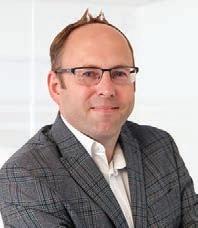
On 16 March, the UK Government announced plans to halve the amount of Mixed Residual Waste (MRW) that goes to landfill or incineration by 2042.
Proposed by Defra as part of the Environment Act – which became law in November 2021 – the target ensures it takes a ‘holistic’ view of waste, which avoids incentivising substitution materials for those with ‘worse environmental impacts’ through material-specific targets.
Described as ‘ambitious’, plans will require ‘significant behavioural’ change to achieve, but what does this mean for FM – an industry becoming increasingly aligned with waste management and aware of its impact on wider ESG goals?
While the proposal presents a new set of considerations, it’s an opportunity to get ahead and reduce cost and carbon emissions immediately.
Finally Mixed Residual Waste (MRW) – or forgotten waste as we call it – has been brought into the spotlight.

MRW exists largely because of human behaviour and lack of knowledge about how our actions determine where waste goes. Twenty-seven million tonnes of this waste goes to landfill or incineration each year – even though there are technologies available to treat the stream that have a smaller environmental impact and deliver bigger cost and carbon savings.
MRW is waste that can’t be recycled because of the presence of organic matter and other contaminants – a discarded plastic bottle containing liquid, or a cardboard sandwich box containing crusts. When these are thrown away, the presence of organic matter means this waste can’t be sorted, so it isn’t recycled.
Education of the public as well as the waste industry must go hand-in-hand with the uptake of new technology. Defra’s spotlight on MRW will, I hope, create the optimum conditions for greater adoption of the UK’s alternative technologies and innovative treatments.
FMs can reduce the reliance on the mainstream landfill or EfW options by researching and talking with innovators in the market place – there has never been a better time to investigate and embrace green-technologies.
For businesses with large quantities of food waste going to EfW or landfill, anaerobic digestion – which can be used to produce biogas – could be a more sustainable alternative. For mixed residual waste –biotechnology can be used as a means to process it on site, remove the organic fraction and reduce its mass and volume by 50 per cent and 70 per cent respectively, which means the need for fewer collections. Plus, the floc that’s created by this process is well suited for processing as a solid recovered fuel (which benefits the circular economy) and costs 40 per cent less to dispose of, compared with landfill or conventional mass burn EfW.
This need for greater environmental responsibility is set against a backdrop of increasingly onerous fiscal pressures. The imminent 55 per cent price increase to red diesel, which most waste producers run their plant and equipment on, means FMs can expect to see significant cost increases for waste services, almost overnight. Plus, as the push for Net Zero is now a key boardroom consideration, there’s increasing internal pressure for change too.
Recent announcements demonstrate that FMs cannot simply sit back and hand over responsibility for their waste to management companies – only those that are proactive in auditing their processes and adopting greener solutions will reduce their carbon footprint and overall costs.
I believe this proposal creates a compelling reason to embrace change now. Biotechnology is already proving its worth as a highly effective, carbon efficient alternative and one that can deliver much-needed cost certainty. Defra has sent a very clear message – mixed residual waste can’t be ignored and we welcome this wholeheartedly.
ISS SUPPORTS OPENING OF GATWICK’S SOUTH TERMINAL
ISS has provided support to the reopening of Gatwick Airport’s South Terminal which has been closed for almost two years due to the pandemic.
Flights from the airport have been operating solely from the North Terminal since 15 June 2020 and ISS placemakers have been keeping the terminal operational and safe for passengers to use.
As the furlough period ended, Gatwick Airport in collaboration with ISS, agreed to retain all employees to begin the preparation for the reopening of the South Terminal. These ISS placemakers have deep-cleaned the entire terminal, recruited and trained new employees, procured over 200 sanitiser stations, repaired or replaced all dormant machines and re-engaged specialist hygiene and scent suppliers.
As part of the mobilisation, ISS is running a bold recruitment campaign to provide the local community with career opportunities at the site.
ISS provides cleaning, portering and property services to Gatwick Airport, and has done for the last seven years.


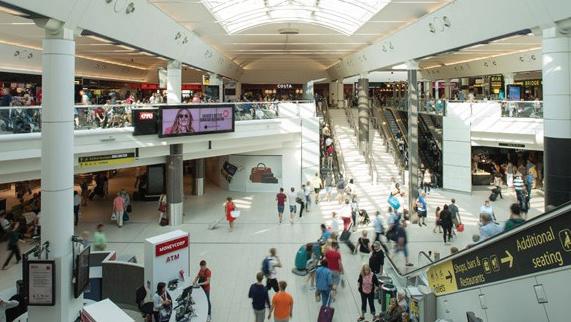
SUPPLY CHAIN SUSTAINABILITY SCHOOL LAUNCHES FAIRNESS, INCLUSION & RESPECT GROWTH ASSESSMENT TOOL
The Supply Chain Sustainability School has joined forces with major construction clients and contractors, to develop and launch the Fairness, Inclusion & Respect Growth Assessment.
This freely available web-based tool has been specifically designed for the construction industry and allows organisations, large and small, to benchmark their Fairness, Inclusion & Respect knowledge.




The Assessment helps leaders and managers to recognise their best practice and highlights areas for improvement. On completion of the Assessment, a tailored learning plan is automatically created for companies, providing direct free access to the best-in-class learning resources of the FIR Programme, helping them to further develop and improve their business.
The Fairness, Inclusion & Respect Growth Assessment tool is endorsed by the CLC (Construction Leadership Council) as part of its Skills Plan objective of developing a more diverse & innovative industry that is better for all. Use of the tool will help organisations to accelerate the process of embedding a culture change and will help deliver CLC’s commitment to support 3,000 construction companies in developing a culture of Fairness, Inclusion and Respect by 2025.
Organisations are becoming more conscious of Fairness, Inclusion & Respect and its benefits to people, profit and enabling a sustainable business model. In a survey of 811 people who have participated in the Fairness, Inclusion & Respect programme, 55 per cent said it helped them win new business, 58 per cent said it improved productivity and 62 per cent said it helped them to retain talent.
In partnership with SEE Things and CHAS, Supply Chain Sustainability School members can also get accredited for taking the Fairness, Inclusion & Respect Growth Assessment and embedding practices within their company. Accreditation is valid for two years and gives members access to ongoing support and the assurance that they are continuing to practice Fairness, Inclusion & Respect to current standards and guidelines. NOCN will be the Quality Assurance of the training provided by the Supply Chain School to the Licensed Assessors.
APRIL 2022 6
NEWS & ANALYSIS FMJ.CO.UK
Corporate Real Estate is being driven by ESG and adoption of hybrid working, finds JLL report




Corporate owner occupiers and potential investors, are being increasingly driven by ESG factors and the adoption of post-COVID hybrid working patterns. This is according to the latest issue of JLL’s annual – ‘Raising Capital from Corporate Real Estate’ report – that reveals 2021 was another bumper year for occupier sales despite the pandemic, with corporates generating EUR 29.2 billion across more than 670 disposals.
It marks the third consecutive year in which the total value of corporate disposals exceeded EUR 25 billion. And it came as the sale of industrial and logistics properties raised more than office disposals for the first time.
The report remarks that corporates are looking to divest older offices that are often too big for their occupational needs, and too energy inefficient to support their sustainability goals.
Firms are also rethinking the types of space they need in light of the pandemic and reviewing where their offices should be located to support employee aspirations about flexible working patterns. An increasing number of corporates are also partnering with investors to forward fund new state of the art facilities to better meet their environmental ambitions.
Office sales totalled EUR 8.4 billion in 2021, with British motorsport firm McLaren selling its global headquarters for EUR 197 million to sale and leaseback specialist Global Net Lease. Dutch bank ABN Amro sold its headquarters for EUR 765 million to Victory Group.
BRITISH BUSINESSES ARE STILL UNAWARE OF PLASTIC PACKAGING TAX
According to new research conducted by YouGov, on behalf of environmental solutions company, Veolia, 77 per cent of British retail and manufacturing businesses are still unaware of the impending Plastic Packaging Tax, which will come into force from 1 April 2022.
The research explored the views of British-based senior decision makers across retail and manufacturing businesses on the incoming Plastic Packaging Tax, which places a £200 per tonne levy on producers or importers of plastic packaging if they do not include 30 per cent recycled content.
The survey found that only a fi h (22 per cent) of the manufacturing and retail businesses asked had already opted for recycled content in their packaging.
To reach the UK’s Net Zero goals, far more businesses must reduce their reliance on virgin materials. The majority of British retail and manufacturing businesses also support an escalator in percentage of recycled content threshold (63 per cent) and cost charge (50 per cent) as an incentive to use recycled content.
The British retail and manufacturing businesses who had made changes to their plastic packaging reported:
Two thirds (66 per cent) have reduced the amount of unnecessary or avoidable plastic packaging
Over half (58 per cent) now use recycled content
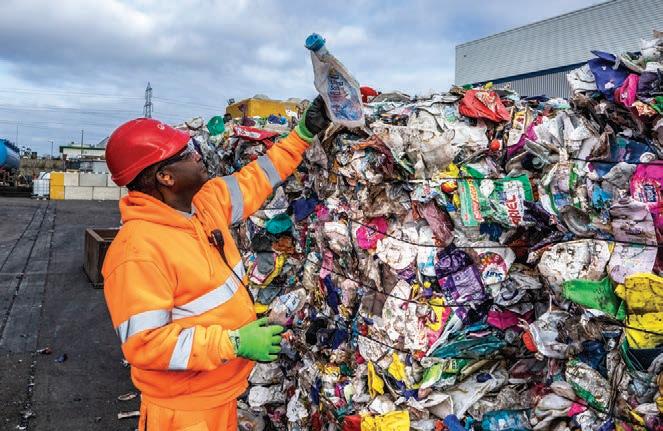
54 per cent have changed the packaging design to make it more recyclable
39 per cent have chosen alternative materials to plastic for their packaging
Gavin Graveson, Veolia Northern Europe Zone Senior Executive Vice President commented: “The UK’s Plastic Packaging Tax is the right way to start getting businesses to push sustainability up the agenda, but it needs to go further. A tax escalator would make choosing to incorporate recycled content in packaging both economically and environmentally preferable to using virgin materials.
“Not only could the UK save up to 2.89 million tonnes of carbon emissions every year if all plastic packaging included 30 per cent recycled content, it would also incentivise investment in domestic infrastructure which could make the UK a world leader in plastics recycling.”
03-05 MAY 2022 UK Construction Week London ExCeL, London https://www.ukconstructionweek.com/ 10-13 MAY 2022 Interclean Amsterdam RAI Amsterdam, The Netherlands www.intercleanshow.com/amsterdam 11-13 MAY 2022 Health Estates and Facilities Management Association Forum 2022 Stadium MK, Milton Keynes https://www.hefmaforum.co.uk/ 01-02 JUNE 2022 World Workplace Europe Hybrid Event https://worldworkplaceeurope.ifma.org/ 07-09 JUNE 2022 FOOTPRINT+ A zero carbon future Brighton https://www.footprintplus.com/ 08 JUNE 2022 IWFM Conference 2022 30 Euston Square, London, NW1 2FB www.iwfm.org.uk/iwfmconference.html 27-28 JUNE 2022 Facilities Management Forum Radisson Blu Hotel, Manchester Airport www.facilitiesmanagementforum.co.uk 14-15 SEPTEMBER 2022 RWM & Letsrecycle Live NEC, Birmingham www.rwmexhibition.com 20-21 SEPTEMBER 2022 Workplace & Facilities Expo RDS Dublin, Ireland www.workplaceandfacilitiesexpo.com 17-19 MAY 2022 www.facilitiesshow.com DATES FOR THE FM DIARY APRIL 2022 7
you
any knowledge of FM news from across the world, please feel free to get in touch with our assistant editor Sarah O’Beirne
If
have
email sarah.obeirne@kpmmedia.co.uk
FMJ.CO.UK NEWS & ANALYSIS
ESG IS GOING TO PLAY A MAJOR ROLE IN PROPERTY AND FM
The RICS Facilities Management Survey results for the first quarter of this year reveals that three-quarters of respondents feel that data is not currently used e ectively enough within the FM industry, and that better benchmarking of performance is needed.

aspect alongside critical data on compliance and cost.

Looking at the recent employment picture over half of contributors cited an increase in headcounts during the first quarter of this year. Although this is slightly more modest than that of nearly 70 per cent in the previous survey, it remains consistent with a continued improvement.
to come. Regarding the outlook for total FM workloads, the majority of envisage continued positive growth in the year to come.
As all organisations wrestle with the challenge of creating vibrant and flexible workplaces that will be productive and high performing the need for FM services to innovate and engage at senior level has never been greater.
Bagust - RICS Head of Property Standards




This underlines the important role IBOS (International Building Operational Standard) can play in helping firms and organisations to better understand how their building is performing, by creating consistency on cost elements for workspaces, people and technology in order to optimise the value for all concerned.
The ability to collect vast amounts of data is no longer in doubt. The challenge that the profession must face is ensuring that we collect the right data consistently and that we use that data to develop a strategic approach to buildings that we can measure, benchmark and utilise to improve performance. The intention of IBOS is to ensure that this data includes the human experience
Respondents continue to note di iculties sourcing workers in certain areas. Around three-quarters of contributors cite issues finding suitable building operation and maintenance workers, while 60 per cent signal similar di iculties with sta for support services and property management. For property management, the share of respondents reporting recruitment problems has increased steadily in each of the last five quarters.
However, the survey has some positive news for the sector, reporting solid growth across many areas. While healthcare remains the strongest performer, there’s been a marked acceleration in demand for serviced business space over the past three quarters.
Respondents also foresee workplace and relocation management being a strong area of expansion for the FM industry in the year
But the area of FM that is anticipated to see the strongest growth over the coming 12 months is sustainability management (the second successive quarter in which this has been the case). Given the current energy crisis, survey participants are also increasingly of the view that energy management will attract a strong increase in investment over the next year, with 63 per cent now expecting energy management to be the fastest growing area of sustainability during the next 12 months.
It is clear that ESG is going to play a major part in all property and FM decision making as we look forward. Again, it is critical that this is positioned as a central part of decision making alongside other data sets so that a clear and deliverable strategy can be set out, understood and delivered.
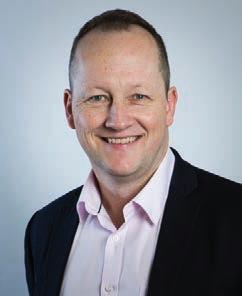
KEEPING PEOPLE AT THE CENTRE OF OUR PROFESSION

s the most critical touchpoint between an organisation and its customers, recognition of the importance of customer experience to the workplace and facilities management profession has been a gradual evolution. This evolution corresponds with the ascendency of our profession’s role as a people-centred, empowering discipline over the past few decades.
Through our Awards you can trace an arc for FM from a profession whose identity with building management was total, to one about enabling people and enabling work, wherever it happens. This is represented across the Awards categories, such as workplace experience, collaboration, social value, wellbeing, equity, diversity and inclusion, and new for this year, excellence in customer experience. The importance of FM team engagement with their own or their client’s end-user customers is
Agrowing as those same end user customers become ever more willing to compare the services they receive with what they encounter elsewhere. The rise of social media, and people’s generally growing propensity to share bad experiences, is making FM’s frontline relationships all the more critical.
Clients and service providers alike are increasingly driven to ensure that each interaction between frontline service personnel and end-user customers is as positive an experience for the latter as possible.
For client organisations, brand loyalty is at stake. For suppliers, it’s the continuation of its contract with that client. Both need to be willing to work closely, perhaps more closely than in the past.
If you need help with improving the customer experience you provide, the IWFM Customer Experience Working Group has recently produced three new interactive documents to assist you. First there is a guide and toolkit for people management. This includes: guidance on how to nurture your teams from recruitment through to advancement; a toolkit with helpful templates designed to assist managers in putting customer experience at the
heart of their thinking; and a presentation to support leaders in sharing and cascading the detail within the guidance.
Next, there is customer experience measurement and benchmarking. This explains what to measure and how to measure it in the context of the two distinct but related customer experience activities: customer service (serving customers day-to-day) and customer care (managing and resolving problems as they arise).
Most recently, the Group provided guidance on using customer journey mapping to enhance customer experience. Aided by useful videos which support and explain the content, it sets out an approach that can be followed to represent the customer journey and help plan a continually evolving approach to positively influence customer experience.
There is more still to come from the Group, but the above will get you started. Find out more and access these assets by visiting our website.
APRIL 2022 8 ASSOCIATION NEWS
Paul
NEWS & ANALYSIS FMJ.CO.UK
IWFM CEO, Linda Hausmanis
Why we’re still No.1 in smoke control servicing and maintenance.
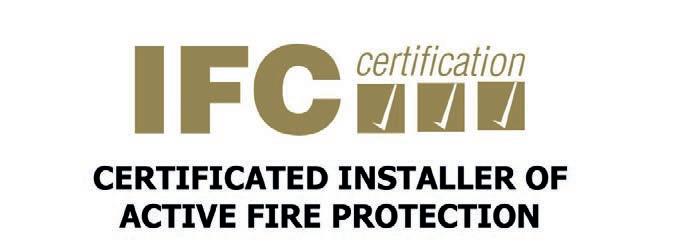

Each of our Colt engineers has been expertly trained with one aim in mind – to ensure your buildings are safe and legal. And to keep them that way.
The value of competency and certification

Colt engineers receive full technical training on all system types when they join. This training is refreshed regularly and supplemented whenever important developments or updates to the legal requirements occur. Colt has 60 fully trained engineers (more than we can comfortably fit in one ad) and we are the UK’s first company to be awarded certification to both IFC SDI 19 and SDI 05.
Our engineers understand that a simple smoke or functionality test is not a service. Many of the engineers we hire from other firms are often impressed at the sheer thoroughness of a Colt site visit.
They learn very early on that there are no viable shortcuts in smoke safety system maintenance.
More fully trained and experienced engineers
Our team of engineers is so dedicated to delivering top quality service that the longest serving amongst them have an average of 20 years each at Colt.

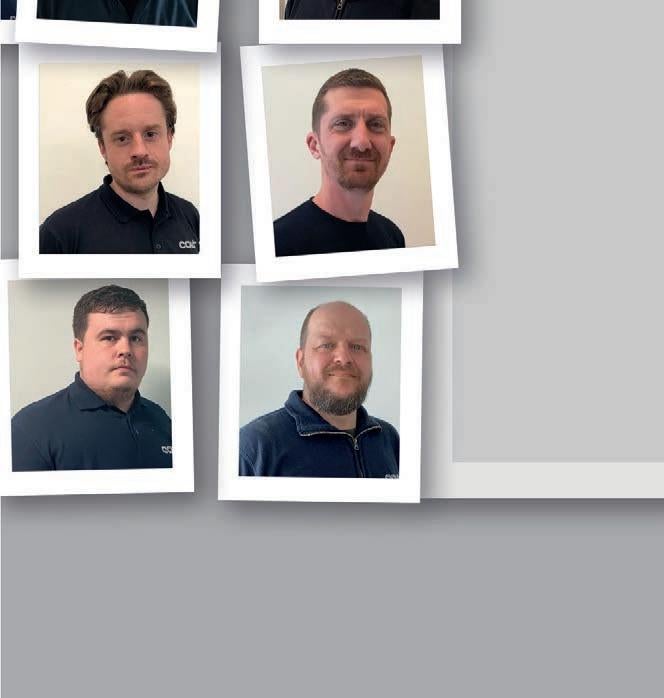


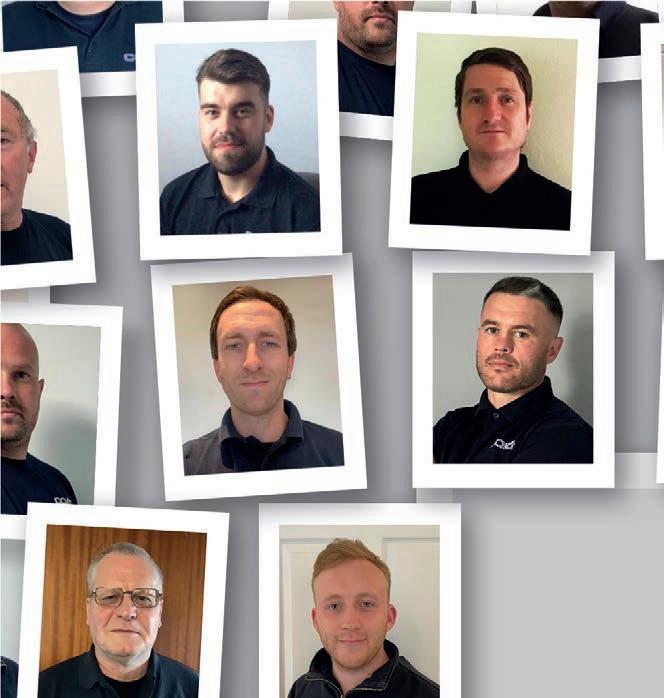
That’s truly unparalleled experience. For our clients it means confidence and peace of mind.
Unrivalled access and availability









Colt is the UK’s only smoke control maintenance provider big enough to offer truly nationwide coverage. Our average response time is 18 hours and in an emergency we aim to be with you in 4 hours. You can count on Colt engineers 24 hours a day, 365 days a year, no matter where you are.
To find out more, visit us at: coltinfo.co.uk/service&maintenance call us on 02392 491735
email service@uk.coltgroup.co.uk



or
Choose Colt Service Expertise built on proven experience. IFC SDI 19 & SDI 05 SDI 05 “Requirements for Contractors Installing, Commissioning and Servicing Active and Fixed Barriers for Fire and Smoke Control”. SDI 19 “Requirements for Contractors Installing Smoke Control Systems”.
WORKPLACE TRENDS
PEOPLE’S CHOICE
day had to go to Rob Wright, CoFounder, Spaceology whose study into conversational meetings yielded some fascinating results. Utilising overhead sensors to infer gaze direction and the point of focus of participants involved in a meeting, richly demonstrates how personality traits e ect communication. Our di erent personalities influence our reaction to environments, even if we’re neurotypical said Kay Sargent of HOK and Leslie Thompson of Tarkett. Given that one in seven people are considered neurodiverse and fewer than 50 per cent are aware of it, we need to accommodate diversity and behaviours in the workplace. Based on their latest research on the specific needs of this group of people - the key takeaways for the built environment was again, a ording people an element of control. We need to realise that each individual has di erent needs and all areas of design, from layout to noise levels and even the introduction of smell sensory stimulation into the workplace can enhance the workplace experience.
People not place is the mantra that gained credence as a result of the pandemic, so as organisations attempt to woo sta back into the o ice, the Workplace Trends spring event presented a range of evidence-based research on how the post-pandemic workplace should look, feel and even smell.
The event, which was introduced and co-curated by Nigel Oseland of Workplace Unlimited began with a session from HR guru Perry Timms who argued that employers can create better connections with their people by taking more of a strategic workplace planning approach. First define the real value of a place, which he notes, is not just about comfort. We need to determine just why people value coming into the workplace and what can be done to enrich their experience. It’s vital we “get HR and FM in the room plotting this together,” he said.
As Ian Baker, Head of Workplace at EMCOR remarked, there has been a lot of speculation on the future of the o ice
but little clarity. Together with Sian Taylor, Head of Property from United Utilities he related the results of a study at their campus in Warrington where an empty building was transformed into a hybrid workplace. Taylor had a limited budget, but by borrowing furniture and massively reducing the number of desks the new space delivers three main modes of work: ‘heads up’ for conversational working, ‘heads down’ for quiet space and finally ‘heads together’ for team collaboration. The results of the experiment, which began in May 2021 has meant a reduction in remote working and an increase in sta mobility. As Taylor concluded, “we are able to create great spaces without huge costs.”
WORKPLACE EXPERIENCE
Taking a global perspective, Cara Sugrue and Anisha Patel of Steelcase presented a review of a series of Steelcase studies conducted with over 57,000 employees and business leaders to understand the impact the

pandemic has had on how and where people and organisations will work in the future. Along with the revelation that the UK and Canada are most in favour of home working were reasons why globally, home working remains so popular; namely that it a ords a greater sense of control of your surroundings. The conclusion is, there should be a lot more thinking around creating choice and control within the o ice environment.
In his presentation on a new framework for assessing workplace experience holistically, with respect to people, spaces, technology and business impacts, Ian Ellison of 3edges Workplace made the important point that data on workplace satisfaction can be gathered in many ways, from QR codes in a new building to a yammer feed amongst sta . When you’re talking a workplace experience you need to hear from the users he urged.
PERSONALITY PROFILES
The most innovative research of the
In a real life before and a er experiment, Anna Scally and Phil Mobley, Directors at Avison Young recounted the results of two pilot spaces; one floor transformed into a flexible space and another where the layout remained as it was prepandemic. Using a combination of data sources, including a Leesman survey carried out in November 2021 the results showed that the highest e ectiveness score rating came from the users in the transformed space. Again, the key message was that employees prefer more variety and will take advantage of choice. Agile working was already increasing prior to 2020, and its appeal has only grown, so the results of an agile working pilot project at Kingston University was a useful reminder that flexibility and choice is an essential element for knowledge workers.
Neil Usher, one of a group of workplace authors who took part in a post-lunch discussion and Q&A session, summed up the day. How can we ensure our workplaces compete with working from home? he asked. Giving people choices, without necessarily breaking the budget is a useful place to begin.
NEWS & ANALYSIS FMJ.CO.UK APRIL 2022 10
https://workplacetrends.co
A key message from Workplace Trends’ March 31st conference on the latest research into work and the workplace, is that people crave more choice and control of their surroundings and it’s up to Workplace Managers to deliver
For thrii-thinkers in washroom design












































Introducing the new 3-in-1 washroom tap. Delivering soap, water and air touch-free from one source, the deck-mounted ThriiTap+ is the smarter way to design hygienic washrooms.








thriitap.com +44 (0) 1722 744 594
GREEN DELIVERY
for loading and unloading items, increasing the e iciency of their supply chain whilst also helping to reduce CO2 emissions.
Furthermore, a logistics partner can also save time by providing flexible electronic invoicing solutions to suit the needs of their client, including multiple references and matter number uploads along with variable billing frequencies. And, by providing appropriate management information and reporting, they can also ensure that mailroom spend can be analysed and controlled and clients can be provided with accurate usage data for business reviews. Service performance data and complaints analysis with corrective actions are all designed to ensure that facilities managers have the right tools to ensure quality of service for their clients.
SUSTAINABLE SUPPORT





At CitySprint, we tailor our support to the individual needs of facilities managers by providing dedicated vehicles to carry out a variety of jobs such as bank runs and expenses runs, on-site implants as well as pouch rooms for mailroom services between o ices.

Pressure on businesses to reduce their carbon footprint has never been higher, be it from customers, legislators, investors or sta . There is now an expectation and urgency for companies to take meaningful steps to reduce their footprints and adapt accordingly.
In this regard, facilities managers are uniquely positioned to o er solutions within their operations that support the implementation of greener and more sustainable business practices. From assessing their waste management to cutting out single use plastics or going paperless, there are a myriad of ways to reduce the impact business operations have on the environment.
But, whilst implementing greener processes at their locations is an important piece of the puzzle, it’s not the only way FMs can reduce their clients’ impact on the environment. Environmentally friendly deliveries and supply chains play an important part in building a sustainable future. In fact, Scope 3(i) emissions account for more than 70 per cent of the carbon footprint, including energy, transport and supply chain management.
LOGISTICS IMPACT
This is why logistics companies have a key role
to play in helping facilities managers cut carbon emissions by incorporating greener supply chains into their network. At CitySprint we’re constantly developing new and better ways to deliver goods in environmentally friendly ways for our customers, including expanding our green fleet. By partnering with the right logistics firm, FMs can take advantage of access to green vehicles to complete deliveries, including push bikes, cargo bikes, e-motorbikes and e-vans.
including

In addition to the use of alternative fuels and vehicles, the scalability of logistics partners systems also allows them to build in e iciencies and therefore emissions savings. They can help facilities managers expand the range of deliveries they carry out with the added value of time-definite delivery services - and importantly, the use of green vehicles for these journeys. By partnering, facilities managers can benefit from shorter waiting times
demonstrating cost
with Carbon Neutral Britain,

project. This allows each of our
Within what is a highly competitive landscape, a sustainable delivery o er can also be a real point of di erence for facilities managers. Indeed, with sustainability high on many organisations’ agendas, sustainability initiatives can help boost profit and create new business opportunities for facilities managers. By reducing emissions for clients and demonstrating the benefits of working with them, including the cost savings and smarter operational models, facilities managers can di erentiate and attract more clients. This year we also began a key partnership with Carbon Neutral Britain, the leading carbon o setting project. This allows each of our clients to also demonstrate how many miles will be o set, either monthly or quarterly - helping facilities managers to highlight the specific improvements they’ve made on an ongoing basis.
Over the last few years we have seen a rapid shi towards placing sustainability at the heart of decision making. If done right, the equation is not profit versus sustainability. Rather with the right approach and a proper sustainability strategy, Facilities Management can be both greener and protect the bottom line.
(i) https://www.fmj.co.uk/sustainable-core/













COMMENT APRIL 2022 12
Rosie Bailey, Commercial Director at CitySprint explains why a logistics partner can improve the sustainability of delivery operations for facilities managers
expanding our green fleet.
clients
ADVICE & OPINION
By reducing emissions for clients and demonstrating the benefits of working with them, including the cost savings and smarter operational models, facilities managers can di erentiate and attract more clients.”
Bidvest Noonan is a people business, operating in the facilities services sector. We employ over 27,000 people and operate nationwide across the UK and Ireland.




Our well-designed award winning cleaning solutions deliver exceptional value to thousands of businesses.



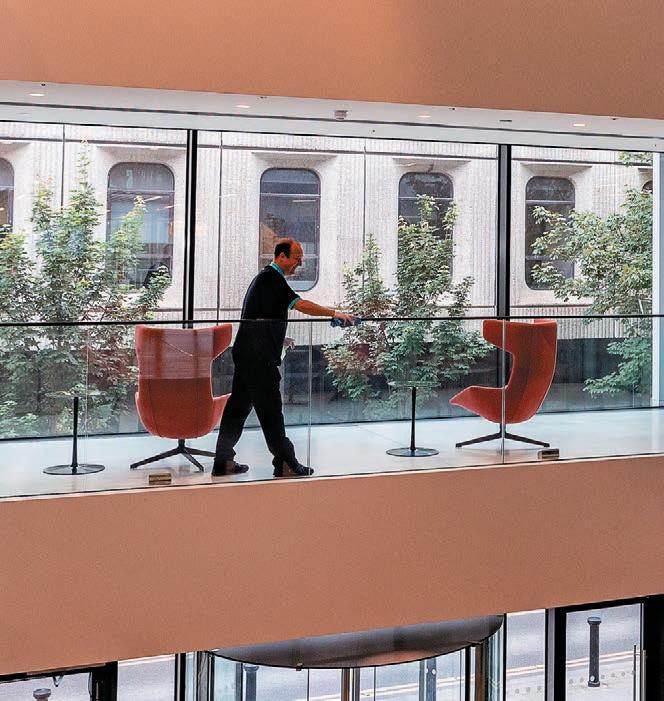
Our well trained people deliver better customer experiences, they raise standards for our clients, while using the latest cleaning technologies.

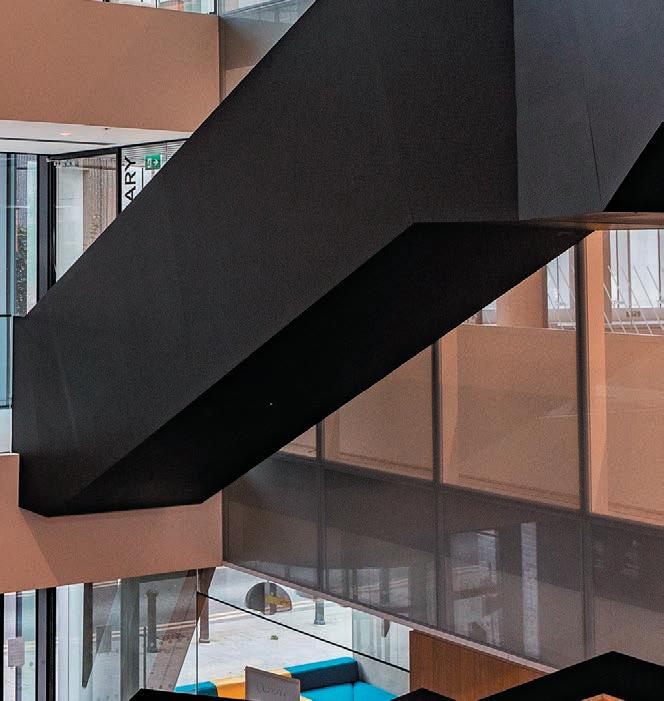
Our Services Commercial Cleaning Specialist Cleaning Window Cleaning Service solutions for the modern workplace T 00 44 (0) 203 319 1750 E info@bidvestnoonan.com www.bidvestnoonan.co.uk Security Guarding Front of House
FIRE SAFETY AMENDMENTS
What the latest amendments to The Building Safety Bill mean for the installation and commissioning of fire safety systems.
By Conor Logan Technical Director, Colt
Actresponsibly or face he y financial and legal consequences. This is the message the government is sending to manufacturers, installers and suppliers of fire safety equipment with its latest amendments to The Building Safety Bill.
In February, the government tabled 38 pages of amendments to The Building Safety Bill that would impose extremely stringent penalties on manufacturers, installers and others across the industry who do not comply with the proper standards and regulations. Although the main driver for these changes is cladding issues, systems and products like smoke control, sprinklers and fire alarms are also included.
The proposals will also see the industry having to pay to fix historical problems that have arisen due to a lack of competence or care when installing and commissioning systems and products. Building owners and landlords will be able to take legal action against manufacturers who used defective products on a home that has since been found unfit for habitation or if installers were found to have acted in a way that caused a building safety risk; this power will stretch back 30 years and allow recovery where costs have already been paid out.

However, it is not only manufacturers and installers who could be punished retroactively. For developers not seen to be working responsibly by employing unfit contractors, the government will be able to block planning permission and building control signo on developments, e ectively preventing them from building and selling new homes. Landlords who are linked to an original developer that still owns a building over 11 metres tall will also be required to
pay in full to fix historic building safety issues in the property.
In an e ort to completely absolve leaseholders of the responsibility for paying to fix defective building safety equipment, building owners who are not linked to the developer, but who can a ord to pay, will also be required to do so.
COMPLIANT CHOICE
In this, there is a second message to developers, building owners and operators – save yourselves a costly lesson and work with compliant manufacturers and installers from the start. Colt were the first UK smoke control company to be certified to both IFC SDI 19 and SDI 05, standards developed by the SCA and awarded to Colt in recognition of our experience and skill and an installer and servicer of both smoke control systems and fire curtains.
To avoid any potential issues with installation quality, we would recommend that anyone employing a smoke control company ask to see these certificates, as well as proof of Quality Assurance (ISO 9001) and Health and Safety accreditations.
Talking about the changes, Michael Gove, Secretary of State for Levelling Up, said: “It is time to bring this scandal to an end, protect leaseholders and see the industry work together to deliver a solution. These measures will stop building owners passing all costs on to leaseholders and make sure any repairs are proportionate and necessary for their safety.
“All industry must play a part, instead of continuing to profit whilst hardworking families struggle. We cannot allow those who do not take building safety seriously to build homes in the future, and for
In association with Service
www.coltinfo.co.uk
those not willing to play their part, they must face consequences.
“We will take action to keep homes safe and to protect existing leaseholders from paying the price for bad development.”
These amendments prepare the ground for the creation and launch of an industry levy scheme for the purpose of improving safety in buildings and raising standards.
SCHEME PRINCIPLES
The principles of the scheme management are outlined below. The bill is now at Committee stage in the House of Lords following its second reading, so it is making significant progress. More amendments will probably follow, but the key points at this stage include:
The Defects Liability Act is extended to 30 years, covering cladding products for 30 years and building products and systems for 15 years.
A relevant defect is defined as anything done or not done that creates a building safety risk.
As mentioned previously, this includes any installation or commissioning errors as well, regardless of whether they were deliberate or not.
A building safety risk is defined as making or potentially making a dwelling uninhabitable through structural collapse or spread of fire. Note, not building regulation requirements.
Within this, there is the creation of a Building Liability Order, Remediation Order and a Remediation Contribution Order.
Liability in relation to products is focused on manufacturers, installers and suppliers and is defined as failure to comply with the construction product regulations.

In addition to remediation costs, provision is made for loss and expense for those a ected by the defect.
The intention of all these changes is to prevent unfit products being used and to put an end to incompetent and dangerous installation practices. The Bill will also help to ensure robust maintenance programs for all building safety equipment and will hold building owners and operators responsible if they fail to keep systems operational.
We at Colt welcome these changes and hope to see them established into law soon. If this goes through, some significant powers are created, along with significant liabilities for the construction industry; there are certainly some companies that will struggle to meet the new standards.
COMPLIANCE 14 APRIL 2022 ADVICE & OPINION
Thrii-up your washroom space














































Introducing the new 3-in-1 washroom tap. Delivering soap, water and air touch-free from one source, the wall-mounted ThriiTap+ is the smarter way to design hygienic washrooms.
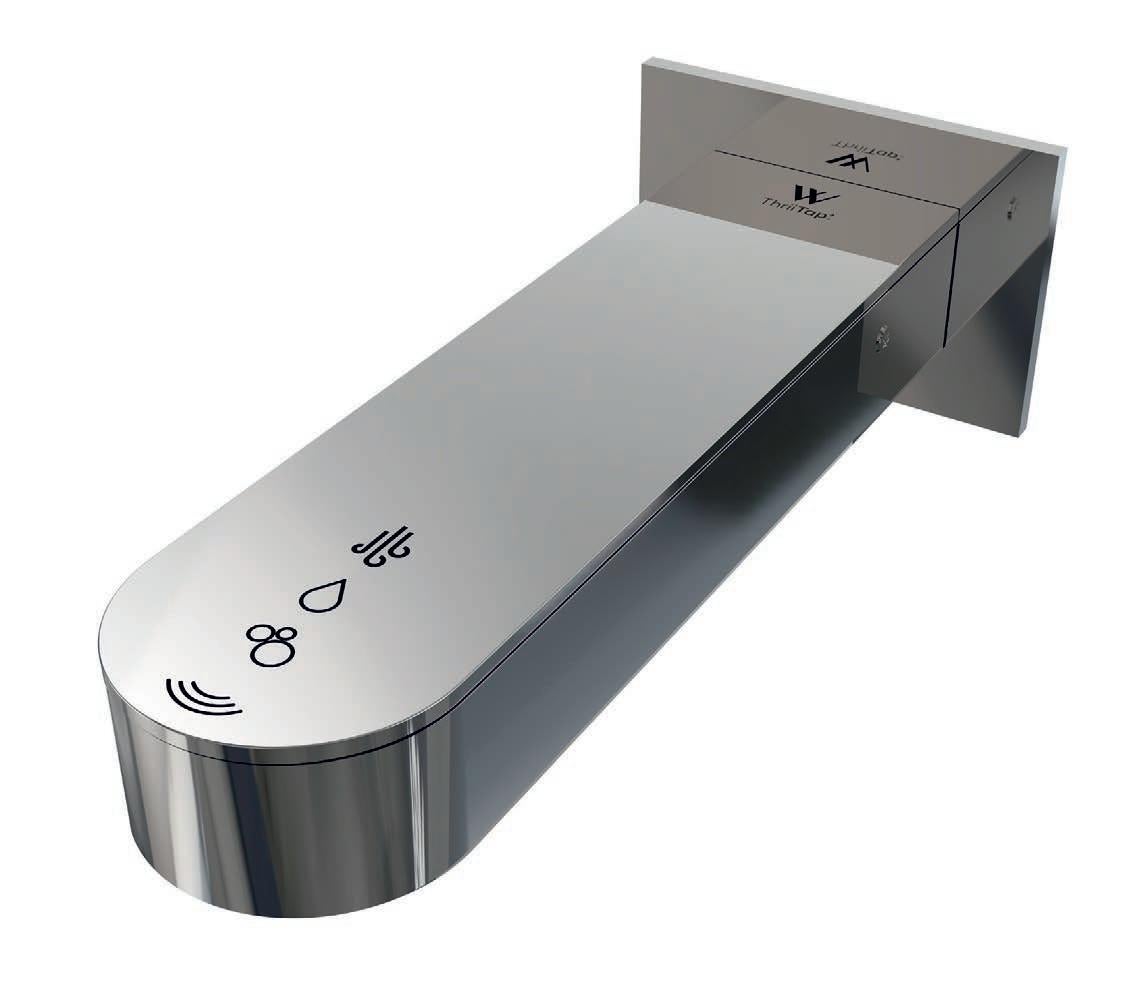
thriitap.com +44 (0) 1722 744 594
COBOTIC CLEANING


FMJ AIMS TO SUPPORT TECHNICAL EXPERTISE IN THE FM MARKET







Stefano Bensi, General Manager EMEA at SoftBank Robotics, a world leader in humanoid robotics, explains the results of a recent study to establish the e ects of vacuuming



Recently, built environment groups such as the British Council for O ices and the Royal Academy of Engineering have urged for better ventilation in Britain’s buildings to reduce the risk of COVID-19 and other infections. Yet ventilation and its role in spreading airborne particulate matter are the tip of the iceberg when it comes to indoor air quality.


Cleaning products such as air fresheners and cleaning solvents o en produce aerosols capable of irritating the respiratory system. Paint contains volatile organic compounds (VOCs) that can lead to breathing di iculties and damage our body’s central nervous system. Harmful mould lurks in damp corners of bathrooms and other poorly ventilated spaces. Dust builds on surfaces without an adequate place. Even a
on airborne particulates


building’s heating, cooling and humidification systems may introduce pollutants into the air if they’re not properly maintained.
As outlined in the feature on page 48, these factors can literally make building occupants sick, a phenomenon o icially recognised by many global health organisations as ‘sick building syndrome’ (SBS). Common symptoms from SBS include headaches, skin irritation, dry coughs, fatigue and more.

PRODUCTIVITY DRAIN







For more than a decade Leesman has been measuring employee experience globally. Its data from more than 900,000 employee surveys show 67 per cent of respondents have reported that air quality is important to them. Yet fewer than half (46 per cent) were satisfied with the air quality in their o ice. That represents a huge disparity between what employees expect and what their organisations are delivering.
ventilated spaces. surfaces cleaning regime in Even across (measured





Further research suggests that these employees have every right to be dissatisfied. Recently, Harvard University’s public health school undertook a study to determine how air quality impacted people’s productivity. Researchers worked with more than 300 individuals for over a year, using an app to trigger personalised cognitive tests at specific times and when sensors detected a depletion in air quality. This study – which included participants in o ices across six countries working in engineering, real estate, architecture and technology –found that increased concentrations of fine particulate matter and lower ventilation rates (measured using carbon
dioxide levels as a proxy) correlated with slower response times and reduced accuracy on the cognitive tests. Researchers observed impaired cognitive function at concentrations common within indoor environments.



MEASURING CLEANING’S IMPACT


Cleaning practices can make a huge di erence to the spread of airborne particulates. Surfaces such as carpets serve as an important air filter by trapping pollutants, but their e ectiveness reduces as they become saturated with dust and debris, so their cleanliness is crucial.
With that in mind, as well as the growing demand for solutions that support better air quality, we wanted to see how our autonomous vacuum sweeper Whiz would deal with the challenge of airborne particulates settling on floor surfaces. Whiz is a collaborative robot – or ‘cobot’ for short – designed to support cleaning teams in their work by removing the strain of repetitive and timeconsuming tasks and enabling sta to focus on higher value activities. The cobot comes equipped with a sweeping brush, a filter that captures particles such as dust and pollen, and built-in sensors that allow the cobot to avoid people, walls, stairs and cli s. The technology can also send realtime alerts when it’s done or needs assistance.

So, we set up a study with smart sensor provider Infogrid whose platform can handle millions of realtime data events from hundreds of thousands of sensors. For this project, we deployed dozens of air quality sensors with the ability to monitor CO2, VOCs, radon, humidity, light levels, ventilation, virus risk factor, air pressure, and a range of pollutants including particulate matter – the latter being the study’s primary focus. We chose two unrelated test sites:
a corporate bank headquarters and a corporate o ice environment. Then, we deployed Infogrid’s air quality sensors in these buildings and took readings for two weeks while cleaning teams continued to service the areas according to their normal cleaning schedules and using their normal cleaning equipment. The sensors were installed in various positions across each floor, all chosen for their medium tra ic. Next, we deployed Whiz for a two-week period while suspending normal vacuum cleaning practices and continued to measure air quality through the Infogrid sensors.
DATA FINDINGS
The study measured and compared approximately 400,000 data points over the four weeks, analysing particulates at three di erent sizes before and a er Whiz’s deployment. And our findings were emphatic. The data uncovered a positive reduction following the introduction of our ‘cobot’ technology, with supermajority in the 50 per cent reduction range. Meanwhile, the study detected no increases in particulate through the operation of Whiz.
These results demonstrate the benefits that data-driven technology can deliver for organisations now pursuing better air quality in their buildings. As always, measuring data provides a clear baseline for improvements and the evidence needed to justify longer-term investments down the line. Nonetheless, it’s important to remember this objective requires a holistic approach which targets the numerous factors impacting air quality, from ventilation and HVAC systems to the use of nontoxic cleaning products, air purifiers and other disinfection tools.
APRIL 2022 16 ADVICE & OPINION
FAST
FACTS



































Is your existing chiller plant efficient and reliable? We’re here to help. The world is our building. Were all in it together. t 08457 165 162 e customer.care@trane.com www.trane.co.uk
Ross Abbate Chief Executive Officer - Mace Operate linkedin.com/in/rossabbate The future of the workplace is still looking uncertain. As people are coming back to workplace, it is clear that workplaces are unlikely to ever be the same again – but what does that mean in practice? How can companies ensure that they are making the right changes at the right time? How can our workplace help to ensure we are fit for the future? https://bit.ly/3qOTwY8
IOSH @IOSH_tweets “As OSH professionals, a key skill is knowing we’re not experts on everything and don’t always “know best” on every possible task. We should help others develop the “how” of their solutions” - great feedback and points happening in the chat area at #IOSHFutureLeaders conference
Acas @acasorguk There are loads of steps employers can take to support their employees’ #MentalHealth without a big budget. Find out more: https://bit.ly/3iRvfMC
IFMA @IFMA FMs in EMEA: World Workplace Europe features closing keynote Katja Schipperheijn, an internationally recognized learning strategist, consultant and author on engagement in the connected world. Get tickets https://bit.ly/3y9kNa2
Kate Morris-Bates linkedin.com/in/ katemorrisbates Good fun supporting Liz Kentish and Jackie Cupper with their Plan B initiative, helping women in the Workplace & Facilities Management sector progress their careers and break through barriers to success. I’ve volunteered to be a Mentor! It is time to pay it forward. #careers
JLL @JLL Hybrid workers thrive when they can follow their own working rhythms and workstyles: how can businesses transform their offices to support their people? http:// co.jll/9H7250IuBPc
@BRE_Group Why is poor indoor air quality an invisible threat? Our BRE Environment Director & air quality expert Dr. Andy Dengel, appears on the Manifest Density podcast, hosted by Microshareio’s @TheUnraveler to explain why.
BLOG FROM LOUISE HOSKING DIRECTOR OF HOSKING ASSOCIATES, IOSH PRESIDENT & ONEWISH CO-FOUNDER



CATCHING THE WAVE OF SOCIAL SUSTAINABILITY
How we do business has and continues to change. Change is our current constant and we are not going back to how we worked before. The pandemic has fuelled technological advancement, astonishing agility, and globally interconnected networks. However, infectious disease, social divide, burnout and isolation mean how we manage health & safety and the work undertaken by facilities management professionals within our organisations has had to adjust at the same rapid rate. Between us we have had to create new adaptations, document, and communicate changes e ectively within the backdrop of social justice movements and strained supply chains. We have learnt to prioritise in a manner we have never had to before.
At the heart of all this change are people. Those who stepped forward to work under extraordinary conditions, embracing hybrid work models and increased use of technology. Adaptive, collaborative leadership styles kept our essential services moving and our buildings operational as we learnt just how interconnected we all are. We put our people and their health first and, in the process, harnessed a new way of working.
Combined with a global skills shortage, and in response to worker needs, we can now see how social and ethical principles cannot be compromised in favour of financial and environmental considerations. Richer, larger organisations and governments understand they are going to have to invest in infrastructure and dig deep to support poorer nations, communities, their supply chains and themselves.
Social Sustainability
This is why, and how, social sustainability is inequitably intertwined with Health & Safety. What we do now has never been more critical, which is why business leaders are opening board room doors and focusing on good governance practice.
Sustainability focuses on the very real issues facing our planet and the environment, but it is so much more than this. There must be balance between people, planet and profit for a business to be sustainable in its broadest terms.
When we focus on profits our people, communities and customers su er. We can’t buy our way out of the global climate crisis because our financial resources are limited. Our organisations, governments and nations are an ecosystem, so if we restrict one aspect it a ects another.
Our people have the solutions and by putting their needs first; by creating psychologically and physically safe work, which is respected, they will,
in turn, solve these highly complex issues. It is time to transform our current patterns of production, operation and consumption. This can only be undertaken by considering a whole sustainability model. We need to work collaboratively and be transparent and honest about where we are now, in order to be realistic about where we need to be and how to get there. This is an evolution not a revolution.
Putting our People First
At the Institution of Occupational Safety and Health (IOSH), we understand work is not just a source of livelihood for workers to support themselves, their families and their communities but also a foundation of self-worth, dignity and growth. From the starting point that work should be safe and healthy for all workers. We have demonstrated that good work is not only about wages, salaries or productivity, but also how an organisation looks a er its people and its supply chains.
Investors, regulators, consumers, the media and politicians are rightly asking how organisations care for their people. There is a growing social and ethical dimension not only to the choices made by consumers but also in investment decisions and how capital is being invested by fund managers. Organisations of all sizes and their suppliers are choosing who they do business with, and looking at social sustainability to do so.
Articulate to Advocate


Facilities management professionals are adapting to this changing world of work. Together we will create psychologically and physically safe places ready to innovate and inspire. How we articulate this is crucial. A new generation of workplaces designed to place our people first will contribute to a new world of work to bring value. These are collaborative, inclusive workspaces designed around flexible working needs where work life balance is being given a higher priority than ever before. In turn, our people will feel they can bring their whole selves to what they do and together usher a new approach to how we work across the world and with our supply chains.
It’s time to catch the wave with IOSH – or risk getting le behind.
Visit www.iosh.com/catchthewave
SOCIAL - BLOG APRIL 2022 18
ADVICE & OPINION
Louise Hosking Director of Hosking Associates
THE FUTURE OF WASHROOM HYGIENE

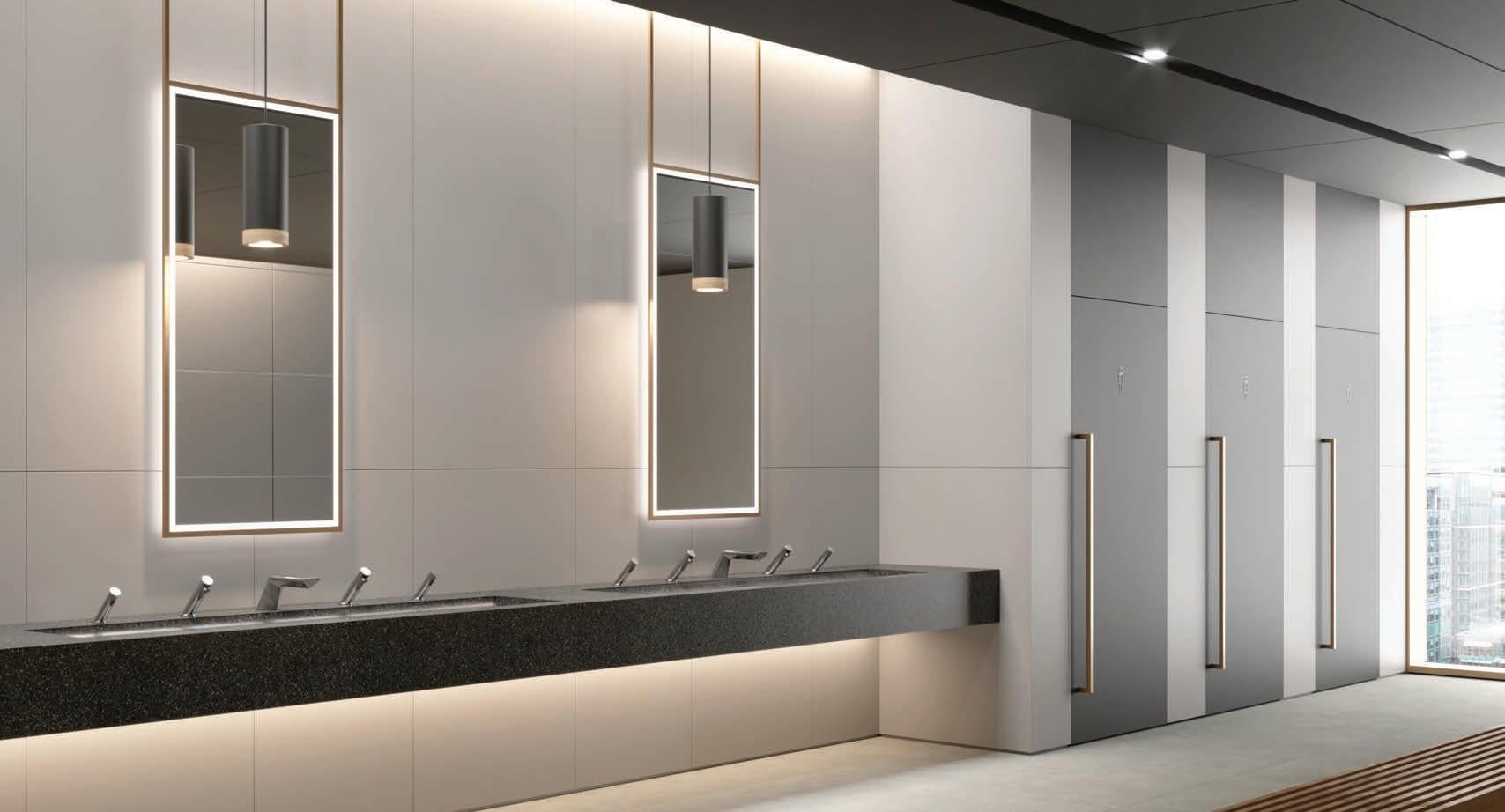





The XLERATORsync® system is an intuitive, unified experience. In this modern design innovation, water, soap and purified air co-exist alongside a purpose-built custom wash basin. XLERATORsync provides users with a more hygienic washroom experience while allowing them to wash and dry their hands all in one convenient location. Beneath the surface, the system runs on industry-leading, energy-efficient XLERATOR ® technology, with features including a HEPA Filtration System proven to remove 99.999% of bacteria and viruses from the air 1 . VISIT OUR MOBILE SHOWROOM DISPLAY AT THE INTERCLEAN AMSTERDAM SHOW AT STAND 11.401 44 80 8258 3569 xleratorsync.co.uk sales@exceldryer.co.uk 1Based on testing performed by LMS Technologies, April 2020.

FM CLINIC
A report by the BCO(i) into the future of the workplace postpandemic suggested that workplaces need to do more to reflect societal changes. The report predicted the replacement of gendered communal toilets with pod-based WCs that feature touchless doors, taps and soap dispensers. What more should the FM sector be doing to ensure that calls for more inclusive toilets in both workplaces and public buildings are being met?
identity, preference, ability or religion - must also come an appreciation that not everyone feels the same.
There are many people who do not welcome shared-spaces for such personal activities.
Part of making gender neutral toilets work for organisations lies in ensuring that all the facilities you might need are within the cubicle space –that’s the sink, hand dryer, sanitary bin as well as the toilet. Also, the cubicle must be a full height partition wall with a solid door that goes all the way to the floor. This is about more than just audio privacy, it ensures a feeling of greater comfort and safety for all users; something that traditional toilet cubicles don’t achieve.
For FMs striving to address inclusivity in all its guises
In FMJ's regular monthly column, our team of FM experts answer your questions about the world of facilities management


DESIGN AND FIT-OUT PROFESSIONAL’S VIEW SARAH
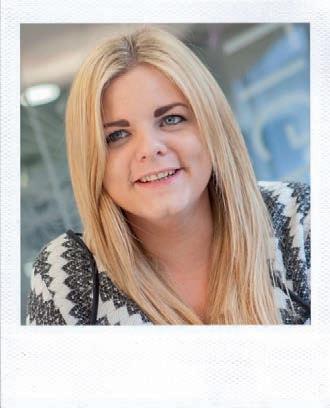
 SYSON, DESIGN MANAGER, CLAREMONT
SYSON, DESIGN MANAGER, CLAREMONT


It’s the fundamental role of the workplace to support its users – that means catering for a wide variety of needs and reflecting societal change.
it’s important to recognise that gender-neutral toilets are important in the modern o ice, but for some, gender specific toilets still have their place. For me the key to getting toilet facility provision right is o ering choice. It’s the best way to futureproof a space and ensure that all potential users’ needs are met, whether they’re in your workforce currently or might be in the future.
For a long time, toilet and washroom facilities were viewed as basic functional spaces and little budget was assigned to their refurbishment or design. Now, the way they feel as well as how they operate is up for consideration. Toilets and washrooms are increasingly becoming more comfortable spaces, akin to being at home, and importantly they’re becoming more inclusive too.
Sarah Syson
Visiting the toilet is a basic and universal human need - which means that everyone must be able to access appropriate facilities with ease. Parity is essential.
There are many advantages to gender neural toilets. They are great for an increasingly diverse population and can help to put transgender and non-binary people at ease, make it easier for parents accompanying small children and address ‘line equality’ (the fact that women o en have to queue for toilets, compared with men). Plus, in design terms, they typically occupy less space which can allow the inclusion of other amenities elsewhere. However, we o en hear that many women find these shared spaces uncomfortable. So, with greater understanding of di erent needs – be they based on
The BCO’s prediction there will be more contact-less interfaces within large, shared environments seems wellfounded, a er all the pandemic has made infection-control a business-critical consideration. There are inclusivity advantages to this too – particularly for those with restricted mobility. But there has to be a word of caution, particularly in the context of toilets – touchless doors are one thing, automatic locking is another. There are plenty of people who won’t use a train toilet because they don’t trust that the button means the door is locked. We have to ask do we trust technology enough in some of our most personal moments?
THE WASHROOM MANUFACTURER’S VIEW ANIL MADAN, NON-RESIDENTIAL MARKETING MANAGER AT IDEAL STANDARD UK
As many workplaces begin to bring people back to the o ice full time, facilities managers have a chance to create a fresh start in this new normal, wiping the slate clean when it comes to protecting occupants. The washroom is a space which holds a lot of potential in this regard.
A er extended periods away, when it comes to people returning to busy o ices, one of the biggest challenges is making them feel safe and comfortable in these spaces. There is a lot that those working in facilities management can do
APRIL 2022 20
ADVICE & OPINION
to ensure people feel at ease, particularly in the washroom.
Although touchless technology in washrooms isn’t anything particularly new, it now seems like the perfect time to look at installing more products that o er a hands-free experience. Not only do they bring added levels of hygiene for end-users, but some can also help reduce water wastage, leading to a more sustainable and cost-e ective system for facilities managers and bill payers.
When you think about an end-user’s experience in a washroom setting, there aren’t many places where touchless products can’t be installed – with taps, soap dispensers, flushplates and hand drying systems all available in options which don’t require physical contact. Creating a touchless washroom is a great way to reassure endusers that your organisation is taking steps to curb the spread of bacteria and germs. There are also several new innovations that take hygiene control to the next level.
requirements when it comes to creating more inclusive washrooms.
The last two years have led us all to re-evaluate our relationships with workplaces, public spaces and commercial buildings, and arguably, there’s no place that’s happened more than within the washroom.
As our society starts to find a new normal, it’s vital that facilities managers listen to the changing needs of end-users and teams using these spaces every day. Addressing inclusivity, accessibility and hygiene is key over the next few years and will ensure a space is fit for purpose.
THE WASHROOM HYGIENE PROFESSIONAL’S VIEW ANNA
KÖNIGSON KOOPMANS,

MARKETING DIRECTOR, COMMERCIAL SEGMENT, ESSITY PROFESSIONAL HYGIENE

























accessible
Occupant comfort isn’t just about hygiene, however. As our society continues to progress to become more inclusive and accessible for everyone, our future washrooms will need to reflect this shi .
Modern o ices need to o er spaces that suit the needs of all end-users, regardless of gender, age or mobility. This may mean incorporating a higher number of gender-neutral spaces and cubicles, or catering to those with increased concerns around privacy.
Accessibility is important in every o ice, and facilities managers may want to try and exceed the minimum legislative
AnnaKoopmansKönigson
all genders fact that feel
Essity’s Gothenburg o ices have been equipped with podbased unisex toilets for decades, so I am able to speak from experience. These types of washrooms generally work well. Queuing for the ladies’ is no longer an issue when people of all genders can use any cubicle. The fact that cleaners are not obliged to close down the entire facility to carry out their job means there is always washroom availability, which is another advantage. And pod-based toilets o er more privacy than communal facilities, which means users feel more comfortable when freshening up.
There is a theory, too, that people are more likely to leave their pod-based toilet in a sanitary condition than if they were in a communal facility. When exiting a “pod” there is no hiding place from whoever is waiting to use it. As a result, people are arguably less likely to leave behind a messy loo if there’s a
APRIL 2022 21 FMJ.CO.UK FM CLINIC
Anil Madan
ADVICE & OPINION
for everyone, our future
Occupant comfort isn’t just about hygiene, however. As our society continues to progress to become more inclusive and accessible for everyone, our future washrooms will need to reflect this shift.”
AnilMadan
chance they could face an embarrassing encounter with someone of the opposite sex outside.
And of course, during a pandemic there are obvious socialdistancing advantages to replacing communal facilities with private washrooms.
As far as touch-free doors and dispensers are concerned, these are only really needed a er the user has washed his or her hands to avoid the risk of recontamination. A supply of hand towels in a washroom pod assist a touch-free operation because these allow the user to open the door using a towel as a barrier.
There are downsides to pod-based toilets, though. They take up more space than communal washrooms and there is no back-up when the soap and paper supply runs out, for example. This means cleaners need to be particularly vigilant in order to keep on top of refill requirements.
Individual washrooms also tend to take longer to service because the cleaner needs to enter each pod individually. Furthermore, the privacy o ered by these toilets could encourage employees to linger longer than they would do in a communal facility - and this could have a knock-on e ect on productivity.
Communal gender-neutral toilets could of course be supplied instead, since these are an inclusive alternative to gents’ and ladies’ facilities while also taking up less space. Unisex washrooms also help to even out queues, which are usually longer for the ladies.
But some people – particularly women - feel uncomfortable when using a gender-neutral loo. For example, a YouGov study carried out in June 2021 revealed that only four per cent of women supported the replacement of male and female loos in restaurants, bars, hotels, cinemas and other public buildings with gender-neutral options.
In this age of inclusivity it does make sense to open up all washrooms to every gender. But this will only work if everyone is on board with the idea. Washroom providers need to put their users first and ask for their opinion.
The gender-neutral question definitely needs to be a part of the wider toilet debate, but washrooms should be inclusive in other ways, too. For example, they should be accessible to the less abled, the elderly and the very young as well as to those with temporary disabilities such as a broken bone or other injury. Because at the end of the day it is all about providing the types of washrooms that people want - and ensuring hygiene for all.
THE ACCESS EXPERT’S VIEW
ED WARNER, CEO AND FOUNDER OF MOTIONSPOT, AND GOVERNMENT ACCESS AMBASSADOR – PRODUCT AND SPACES
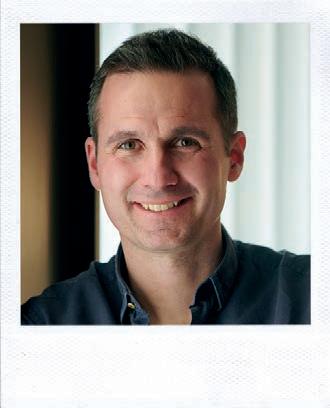
Improving opportunities for previously marginalised demographics helps create more diverse and inclusive workforces. But for diversity and inclusion policies to be successful, organisations need to consider how their workplaces can be designed inclusively to remove barriers for employees and visitors.
One in five people across the world have a disability, so to design genuinely accessible and inclusive workplaces, businesses should consider the challenges in the workplace for sta or visitors with physical, cognitive, sensory, and social
communication issues.
Adopting an inclusive mindset should also aim to prevent the exclusion of people with di erent abilities, age, gender, religion or spirituality, language, and cultural backgrounds.
Current research on the application of inclusive design suggests a generalised lack of understanding of the primary needs of employees in workplaces, from unconscious bias towards LGBTQIA+ communities to a misunderstanding of religion or spirituality habits, to exclusion for underrepresented minority groups.


Creating a safe work environment starts by acknowledging exclusion and designing spaces that accommodate the needs and aspirations of all people. Designing inclusive environments is not just a ‘nice-to-have’ but is a process based on a people-first approach that starts with understanding the di erent needs and desires of the customer, continues with the delivery stage and endures with constant facility maintenance.
It is important that organisations provide washrooms that are accessible to all whatever their physical challenges. Designing accessible and flexible workplaces should include the creation of step free entrances with handrails, resting areas and visual, sensory, and auditory wayfinding across the whole building. It is also important to ensure that in addition to wheelchair accessible toilets there are ambulant accessible toilet facilities that enable those who have di iculty walking to use the washrooms.
Those who identify as non-binary but work in an o ice that only has male and female designated toilet facilities may find that this has a negative impact on their sense of belonging in the workplace and may even prevent them from using the facility during the day. Providing the most basic of facilities that everyone can use safely and comfortably is vital for any inclusive business.
The solution would be to create a choice of toilet facilities, including all gender toilets alongside female/male only toilets as certain people and faiths require gender specific toilet facilities. It also involves destigmatising the use of traditional colours for males and females and designing a parents’ room that meets the needs of people of all genders.
Workplaces should also provide the right inclusive spaces and opportunities for people to manifest religious and spiritual beliefs. This requires the creation of washroom facilities with ablution and lavatories that respect religious and spiritual obligations.
I believe that designing more inclusive buildings and spaces reduces exclusion and fosters equity for everyone. This is because inclusive design produces universally appealing environments, helps organisations to hire and retain the best demographically, experientially, and cognitively diverse talent, improves satisfaction at work and provides long term cost savings by avoiding the need for expensive and environmentally damaging retrofits and adaptations in the future.
Our inclusive workspace white paper provides DE&I, HR and business leaders and their design teams with insight and inspiration to start making their workplaces more inclusive and can be downloaded at https://motionspot.co.uk/pages/designing-inclusiveworkplaces-white-paper.
(i) www.fmj.co.uk/bco-looks-at-how-covid-19-will-change-the-workplace Do
Email: sara.bean@kpmmedia.co.uk
APRIL 2022 22
you have a question that you’d like answered by the FMJ Clinic?
FM CLINIC
ADVICE & OPINION
Ed Warner



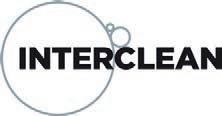
TRIED & TRUSTED
In 2012, a study co-authored
identified a direct link between employee satisfaction and lower patient mortality rates.
In 2018, a BMA-published report titled ‘Supporting health & wellbeing at work’ stated that: “…at a time when the NHS is under-resourced, over-stretched and facing recruitment and retention problems, it is vital that health and wellbeing of sta is prioritised”. A key recommendation was sta access to quality food.
Fast forward a few years and we were besieged by a global pandemic - a pivotal moment for NHS workers.
At the height of the enforced lockdowns, communities were rallying around local healthcare organisations to o er their support and help exhausted and demoralised workers.
Suddenly, tired healthcare professionals were no longer fuelling up in tired canteens. They were enjoying deliveries from highstreet brands, high-end restaurants and highquality food suppliers. Sta expectations were changing.
An independent review of hospital food launched in October 2020, during the pandemic, highlighted significant shortcomings in sta and visitor feeding across the NHS estate.
The 97-page review, led by Phil Shelley with support and endorsement from Celebrity Chef and Food Campaigner Prue Leith, specifically identified a failure across some, not all, hospital Trusts to provide adequate food provision for sta .



Not only was this resulting in droves of people leaving the NHS but, as Professor West’s research highlighted, could have had a major impact on matters of life and death.
Working conditions for sta were thrown directly into the spotlight, and some Trusts decided that it was time to take direct and immediate action.
One such establishment was Ashford and St Peter’s Hospitals (ASPH), a hospital trust based in Surrey, providing acute services to more than 410,000 people in Chertsey, Ashford and the surrounding areas. It employs 4,400 members of sta .
Chris Bell, Director of Estates and Facilities at ASPH, explains: “The pandemic really brought home the challenges that so many NHS sta are facing.
“Sta were seeing people dying, including some of their own colleagues. People were working long hours, they were tired and afraid. This was the reality of the situation and we knew we had to do something to help in areas that we could make a di erence.”
Recognising this, the ASPH Board was

APRIL 2022 24 CASE STUDY ASHFORD AND ST PETER’S HOSPITALS
NHS FOUNDATION TRUST
by Professor Michael West and Professor Jeremy Dawson
Ashford and St Peter’s Hospitals NHS Foundation Trust has transformed sta catering for the better by partnering with FM consultants Neller Davies and workplace caterer BM to bring the service back in-house. Piers Zangana reports
keen to develop a strategy that looked at improved health, productivity and wellbeing. As the adage goes, through adversity comes opportunity.
CHANGING TIMES

Previously, ASPH engaged an external catering supplier. The model was a straightforward commercial deal, based on a concession fee - a common retail contract arrangement in the NHS. The food was fairly typical of a hospital sta restaurant. In a survey taken in 2018, customers gave the service a 52 per cent satisfaction rate.

During COVID the existing contractor o er became unviable for both ASPH and the supplier. The Trust needed service continuity so it could enact special measures and avoid some of the usual procurement red tape.
Working with Neller Davies, which has been providing food and FM consultancy services since 2017, a strategic plan was developed and endorsed by the Board.
The plan focussed on engaging the hospital workforce (clinical and non-clinical) which ensured collaboration and buy-in from the outset. A consequence of the plan was to insource all retail catering services on 1st October 2020.
Bell said: “Our previous contractor did exactly what we contracted them to do but the truth is that the contract didn’t provide room for any innovation. Bringing our services in-house enabled us to change quickly.
“But we knew that we couldn’t change on our own and we did need support. We are not catering experts so we needed advice and help. We wanted to move from a canteen to a restaurant mentality. We wanted to change the mindset and it was a real leap

of faith.”
A COLLABORATIVE VISION
A new and ambitious vision was set out to o er catering services for sta that mirrored those in other professional settings.
A distinct set of targets to improve catering standards were developed to further align them with external requirements such as Government Buying Standards, WRAP initiatives and CQUIN guidance (a framework within the NHS that supports improvements in the quality of services). It also aimed to improve food safety ratings from 3 stars to 5 stars, and respond to the NHS Food Review 2020, focussing on food safety and quality.
In the interests of doing things di erently, it wanted to achieve similar satisfaction scores to business and industry or ‘corporate’ establishments, which regularly score above 70 per cent.
Julian Fris, Director, Neller Davies, said: “Whilst we knew we were stepping outside of the normal NHS comfort zone, we had complete faith in our approach.
“We have extensive experience of running projects in critical environments, and we went through a traditional governance structure and followed the same process. What was really important was having that goodwill, strong relationships, trust, and ultimately meaningful collaboration.”
The Trust, through Neller Davies, directly engaged BM, a workplace caterer providing services to the corporate sector, to fast-track developments. The objective was to give employees

a comparable service to BM’s existing client base of legal firms, media, financial and tech organisations.
Fris said: “We deliberately went to companies who didn’t work in a healthcare space. We wanted fresh eyes on an age-old challenge. Given that workplace catering was e ectively closed down at this time, BM had lots of talented people on furlough so it was an opportune moment to try something new.”
However, without the endorsement of senior management at the Trust, this bold move would not have been possible. Fris argues: “It was really important that the Board bought into the process from the very outset. This was all about trust.”
The close working relationship and trust that Fris refers to were evident from an initial £50k investment signed o by the Trust Board for equipment, a makeover of the spaces, training and resources.
Bell added: “Normally, when looking to implement such a transformational project, there are o en barriers one has to consider in terms of taking people on the journey. I’ve been pushing at an open door from the outset.”
APRIL 2022 25 FMJ.CO.UK ASHFORD AND ST PETER’S HOSPITALS NHS FOUNDATION TRUST CASE STUDY
We deliberately went to companies who didn’t work in a healthcare space. We wanted fresh eyes on an age-old challenge. Given that workplace catering was e ectively closed down at this time, BM had lots of talented people on furlough so it was an opportune moment to try something new.”
TRANSFORMATION
The impact was immediate. BM introduced a ra of training programmes, usually reserved for its corporate clients. These included professional chef, management, barista, customer service development, and waste management training.
The Trust also reviewed pay structures to increase employee recognition and, together with BM, implemented a suite of tech that included new click & collect and payment apps.
Raouf Mansour, who has now become Head of Catering at ASPH but was previously a Development Chef at BM, explains: “When we first came in, it was a bit of a surprise to say the least. We are used to working with large corporates and this was completely di erent.
“If I’m honest, we never treated it as a
hospital. We genuinely went in with the belief that we could be one of the best places you can eat in the area.
“I was given carte blanche to develop the new menu, look at suppliers etc and we brought a lot of expertise, not just in cooking but also our supplier base. We respected each other’s expertise.”
However, it didn’t come without its challenges. Mansour explains: “The main challenge was to take the catering team on the journey. It sounds simple but we needed to get them excited about food again, rather than just running a kitchen.”
That they did. The Trust subsidy was retained as part of its employee benefits package, recruitment and retention strategy. New brand and marketing collateral included social media promotion, and awareness campaigns were launched.
The team also introduced seasonal menus, pop-ups, ward/home takeaway ranges, themed days, guest chefs, BBQs, and ice-cream parlours.
Trust sta were now enjoying dishes such as Korean steamed hoisin duck buns; line-caught grilled tuna steak with warm new potato salad, griddled little gem salad with garlic & herb dressing; and chargrilled halloumi, pickled red cabbage, hummus and tzatziki.
INSTANT RESULTS
Uptake of on-site catering increased from 26 per cent to 40 per cent of sta , with satisfaction rates increasing from 52 per cent pre-transformation to 71 per cent, in-line with professional workplaces. All of this was achieved with a maximum £4 meal cost.
Fris, says: “The process shows that if you empower people, customers and service providers, you can achieve what you want to. Like with most products and brands, resetting and relooking at your core function/vision regularly is really important. Of course, the infrastructure and due diligence required behind critical environments is key, but you need to challenge the norm.”
The Trust also saw an increase in social media and public endorsement for its food, it achieved 5 stars on EHO visit across all its outlets and fresh food production hit 90 per cent, up from 50 per cent previously.
Significantly, alongside the improved quality, commercially the changes had a huge impact on revenues.
Turnover at the restaurant was back at its preCOVID position (even without the visitors); the restaurant saw more than 1,200 transactions a day, previously at 400; and sales revenue more than doubled to more than £1 million in a year.
WIDESPREAD ENDORSEMENT
These numbers not only reflect employee satisfaction increase, they have also drawn attention on a national scale with Dame Prue Leith citing it as an example of best practice; and Phil Shelley, Chair of Hospital Food Review, awarding ASPH exemplar status.

During what was e ectively a six-week implementation process, ASPH has become a flagship site for the NHS. Satisfaction is now on par with corporate workplaces in the city. To cope with increased capacity, a new kitchen has been planned and commissioned. It opened in early March 2022. Further to this, plans have been agreed and implemented for a 24-hour quality catering service.
As Bell puts it: “Seeing financial improvement wasn’t actually what was most pleasing, it’s a by-product; the real mark of success was seeing how our hard-working sta were being recognised. The knock-on impact of improved morale for our catering teams and the wider hospital family trumped everything.

“This has shown that it can be done. It’s possible with senior management support, collaboration and a bit of courage.”
That courage Bell refers to, could pave the way for so many others to follow.
This isn’t just good news for the finances, workplace environment and wellbeing of the NHS and its employees but as outlined in Professor West’s research – it can actually save lives.
APRIL 2022 26 CASE STUDY ASHFORD AND ST PETER’S HOSPITALS
NHS FOUNDATION TRUST
Uptake
of on-site catering increased from 26 per cent to 40 per cent of sta , with satisfaction rates increasing from 52 per cent pretransformation to 71 per cent, in-line with professional workplaces. All of this was achieved with a maximum £4 meal cost.”
A breath of fresh air









According to the WHO, Covid-19 is mainly spread through the air. Rensair’s portable, hospital-grade air purifier is making shared working spaces safer and encouraging a full return to the office.
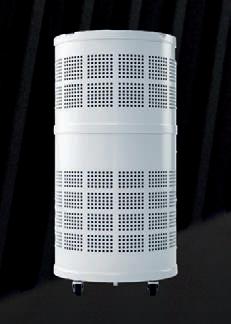

The company’s patented technology combines H13 HEPA filtration with germicidal UVC light, meeting the UK SAGE committee guidelines.









In a test to determine Rensair’s performance in reducing the concentration of Covid-19 surrogate particles in the air, a particle reduction rate of 99.98% was recorded in 15 minutes and above 99.99% in 30 minutes.










Like pure water from the tap, people now expect clean air at work. Rensair’s affordable, practical solution offers a breath of fresh air for companies of all sizes and across all sectors.








–CLICK –TYPE +44 (0)20 3973 8927 –TALK contact@rensair.com rensair.com
To find out more about our hospital-grade, antiviral air purifier:
The world’s largest dedicated facilities management event welcomes thousands of global FM professionals to experience the latest technological solutions and hear from industry trailblazers—all under one roof, over three days.

With varied exhibitors including Sunbelt Rentals, ICS Cool Energy, Streamline Systems, Aquaflow Services, Your Workspace, Grundon Waste Management, Selecta, BigChange, and many more, the breadth of products on display lets you gain a thorough understanding of the latest technology and innovation available.
The show makes it easy for you to engage one-on-one with these vendors, see their products in action and make the right choices for your facilities management strategy.
ENHANCE YOUR KNOWLEDGE IN THE FM THEATRE
Facilities Show also lets you access thought leadership and insight from industry leaders, with a programme of CPD-accredited educational sessions to help you remain at the forefront of industry knowledge.
This year’s agenda of seminars, presentations, case studies and panel discussions in the dedicated FM theatre will cover the most important topics and developments. Some of the highlights include:
THE ROADMAP TO NET ZERO
A panel will discuss the steps they have taken within their organisations to become sustainable and eventually, net zero, in the future. From harnessing sta collaboration for behaviour change, sustainable travel, waste
and resources management and sustainability strategy and reporting. How will your business adapt to new UK and EU legislation with ambitious net-zero targets?
SUSTAINABILITY IN FM AND ACHIEVING ENVIRONMENTAL, SOCIAL AND GOVERNANCE
ESG is a hot topic for anyone working within the built environment. Environmental goals, such as achieving net zero remain a priority; but alongside this, the role of facilities management in helping to meet societal aims, from addressing modern slavery to supporting the supply chain, is also vital.
There is also the need to achieve compliance, to ensure that FM is not just meeting its ESG obligations but has the processes in place to meet ESG regulations and reporting mandates.
FMJ will bring together a panel of thought
APRIL 2022 28
The world’s most important facilities management event is back, bringing together the entire FM supply chain after three years. It’s the place to share expertise and explore solutions for making the profession more sustainable and drive transformation. Here’s the lowdown on the 2022 programme
SPEAKERS & SEMINAR EVENTS
At the show, a dedicated FM theatre will feature a range of experts discussing sustainability, mobile workforce solutions and what the future looks like for your profession.


Sessions include:
• The roadmap to net zero
• CAFM and Mobile Workforce solutions
• Development of healthy spaces utilising IOT and AI techniques
• How is FM becoming more strategic and agile?
• Future Outlook for the FM Profession
FMJ is also proud to present: Sustainability in FM and achieving Environmental, Social and Governance.
Here a panel of FM experts will discuss how ESG encompasses the many strands of sustainability.
leaders
BE INSPIRED BY KEYNOTE SPEAKERS
This year, you can hear from Documentary-Maker, Producer and Writer Louis Theroux and Mandy Hickson, one of the first female pilots to serve on the front-line in a Tornado.
HOW IS FM BECOMING MORE STRATEGIC AND AGILE?
Workplaces need to work harder to work for everyone and need to consider sustainability, wellbeing, diversity, and inclusion. This session looks at the future of FM, and how the pandemic accelerated changes that were already underway.
Just some of the speaker highlights are:
Hans Scholten, Corporate Real Estate Manager at Capgemini who will be discussing how he implemented a Corporate Real Estate strategy for Capgemini. As part of this implementation, he was responsible for the development of a workplace application and a LoRa based IoT platform.
Helen Jones, COO for Corporate Clients at Alcumus, Helen joined Alcumus in July 2018 as Managing Director of Certification. A Chartered Civil Engineer, she has over 15 years’ experience in a variety of senior leadership roles across the Construction and Services sectors, she will be joining the FMJ discussion on ESG.
William Ruh, Chief Executive O icer for Lendlease Digital, who will share will share how Lendlease is using data and digital technology across the property lifecycle to achieve a greener and healthier world.
Sirina Blankson, Sustainability Manager at Kent & Medway NHS who will be speaking on taking a circular economy approach to FM. As a senior Sustainability and Environment professional in the NHS, Sirina is tasked with leading the Sustainability agenda across a large group of Hospitals.
www.facilitiesshow.com/en/whats-on.html
As a non-profit, Abri Group will share how they choose the levers to ensure impactful outputs that also focuses on value for money.
SMART WORKPLACES
As the hybrid working megatrend gathers pace, top business leaders recognise the importance of delivering a world-class workplace user experience.
This session will explore how smart workplace technology helps you optimise both workplace design and daily facilities operations.
MAKE UP FOR LOST TIME
Huge changes to how we live and work have contributed to a shi in how the workplace is viewed and what people expect from it.
Innovative technology is pushing the boundaries of what real estate can deliver for organisations. The role of FM has grown considerably, and FMs now have a hand in nearly every aspect of a business.
A er years apart, it’s time to debrief with your colleagues and peers and strategize for the future. Reconnect, learn and share, in-person and all in one place, through networking opportunities from breakfasts and drink receptions to closed-door roundtable discussions.
As the sun goes down, there’ll also be plenty of drinks and a er parties to celebrate the reunion we’ve all been waiting for.
Louis Theroux’s unique style of investigation has covered everything from post-partum mental illness in the UK to American psychiatric treatment centres, dementia care to alcohol addiction.
He has trained with American wrestlers, mixed with gang members, and interviewed those on the fringe of society. He has also spent time with self-help gurus, out of work actors, and rappers. Rejecting the more confrontational style of other documentarians in favour of an informal, curious, unassuming approach, his work is consistently revealing, informative and entertaining.
Louis will provide surprising and insightful stories from his vast-ranging experience and give attendees the opportunity to pose some questions of their own.
Joining Louis is Mandy Hickson, one of the first female pilots to serve in a front-line Tornado GR4 squadron, playing an active role in the conflict in Iraq. Her session will provide a vivid insight into the leadership, teamwork and communication required to define and then realise specific goals in highpressure situations.
She will also highlight the value of honest and open debriefing a er any project or phase; something the Royal Air Force always do, but which businesses o en overlook.
They’re speaking at the co-located Safety & Health Expo, which is all included in a FREE Facilities Show ticket.
5 SHOWS, 1 TICKET: ENHANCE YOUR FACILITIES MANAGEMENT STRATEGY WITH SOLUTIONS
FROM FIRE SAFETY, SECURITY AND HEALTH AND SAFETY
Your free ticket to Facilities Show gives you unlimited access to four other co-located events,
APRIL 2022 29 FMJ.CO.UK
in sustainability to discuss the opportunities for FMs to be front and centre of the integration of ESG into their organisations.
meaning you have a unique opportunity to enhance your facilities management strategy with products and solutions from across facilities management, security, fire protection & prevention, intelligent buildings and health & safety. In just one visit to the ExCeL, London you will have an opportunity to explore a vast range of innovative products and benefit from cross sector learning and networking.
INTELLIGENT BUILDING EUROPE
Creating smart, e icient and sustainable environments
New for 2022, Intelligent Building Europe provides a platform to explore cutting-edge smart building technology and discover the latest industry trends. Bringing together end users, installers, integrators, consultants and building services engineers, these events provide an unmissable opportunity to connect with the entire smart buildings supply chain.
An immersive smart building experience enables visitors to enjoy a unique, fully-equipped, life-size smart building environment and see how the most innovative and interactive technology can bring together facilities management, security, fire safety and wellbeing in one place.
Speak to the experts and assess thousands of products all under one roof, such as access control, energy management, intrusion detection, wired and wireless connectivity and more. www.intelligentbuildingeurope.com
SAFETY & HEALTH EXPO
Bringing the health and safety community back together
Want to keep up to date with health and safety strategies and regulations, extend your network and assess the latest solutions, all under one roof?
Safety & Health Expo is where thousands of health and safety professionals come together to innovate, collaborate, and fulfil their goals.
Curated for H&S professionals, visit the most
informative and educational seminars around to stay on top of the very latest in legislation, industry standards and best-practice.
For anyone working in H&S and FM there is the opportunity to assess and source the perfect solutions for your business, including the newest workwear, behavioural safety programmes, safety harnesses, PPE, occupational health products, e-learning, training solutions and more.
www.safety-health-expo.co.uk
FACILITIES SHOW EXHIBITORS 2022
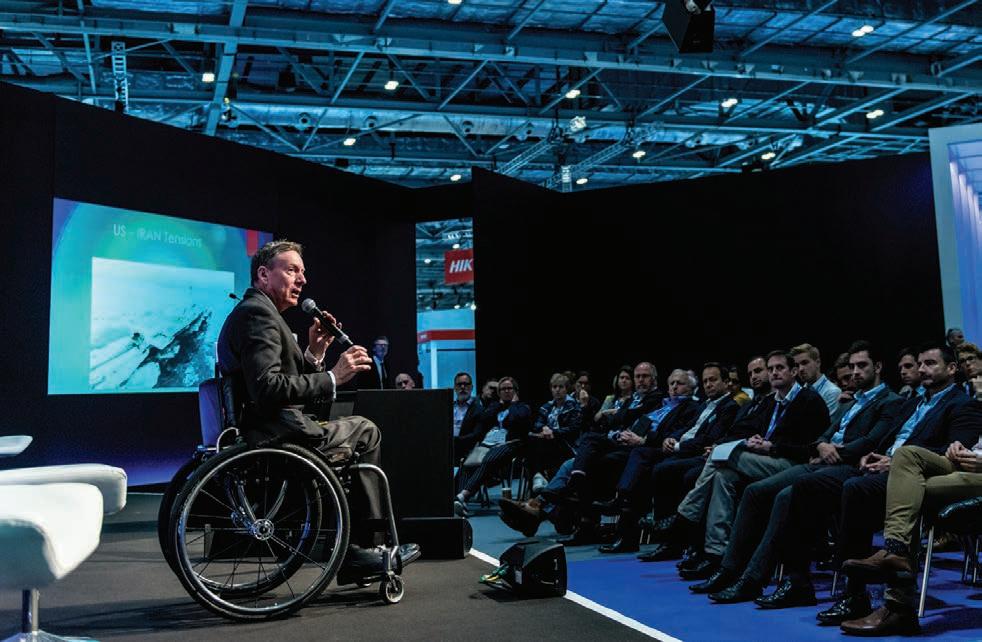
A. J. Products (UK) Limited FM1210
ACCO UK Ltd FM1420
Airthings ASA FM2872
Alpaca Global Solutions FM2610
Altuity Solutions Ltd FM2224
Amamus Ltd. FM2635
Andrews Sykes Group PLC FM1615
Apex intelligence FM3032
Aquaflow Services FM1810
ARM Environments FM1675
ASAP Comply Ltd. FM1222
Aspira Aerial Applications Ltd FM3024
Assurity Consulting Ltd. FM1245
Aurora Lighting Ltd FM1895
Avery FM1274
Bachmann Electrical Engineering Ltd FM2875
Banner UK FM2226
Barbour EHS FM1860
Beaver Pest Control LLP FM2222
Beckho Automation Ltd. FM2280
BIBO Ltd. FM3020
BIGCHANGE LIMITED FM2410
Bona Limited FM1260
BraveGoose Ltd FM1824
Buckeye International Inc. FM1255
Bywaters (Leyton) Limited FM1626
CAD Management Ltd.
FM2654
Carrier Rental Systems (UK) Limited FM1450
Celli Group (UK) Ltd FM1880
Cistermiser Limited FM1830
Cleankill Environmental Services FM2434
Clivet Group UK FM1270
Clockwork IT Ltd. FM1600
Clockwork Removals FM1424
Co-Cre8 FM1604
Consortiq FM3018
Contego Environmental Services Ltd FM2640
CPA Engineered Solutions Ltd FM1470
Dassault Systemes Solidworks Corp FM2854
Denis Rawlins Ltd. FM1475
Direct Strike Ltd FM1300
Draeger UK Limited FM1802
Duplex Cleaning Machines (UK) Ltd FM1610
EB Charging Ltd FM2642
Elecoso UK Ltd. FM2455
Electronic Security Plus Ltd FM1832
ELEVATOR SERVICES DIRECT LTD FM1416
Elior UK Ltd FM2436
Enterpack Ltd FM1815
Entrée Visitor & Sta Management FM1624
EntrySign FM2028
Environmental Waste Management Ltd FM2622
Ergotron Europe FM1220
EWS Group UK Limited FM2026
Extergeo Industries Limited FM1550
Facilities Management Journal FM1410
FlexWhere FM2422
FogPod FM2645
Foodles FM2632
Forbo Flooring UK Ltd. FM1656
Fosters Foliage by Design Ltd. FM1634
FSI, an MRI So ware Company FM2460
Ground Control Ltd. FM1840
Grundon Waste Management Ltd. FM1650
Hako Machines Ltd FM1250
HVAC Recruitment Ltd. FM2070
Hydro X Ltd FM1680
Hygiene Disposables Group Ltd FM1500
ICH Ltd. FM1640
Indeed Flex FM2000
Indepth Services (Cleaning) Ltd. FM2220
Ineos Hygienics FM2450
Infraspeak FM2840
IWFM FM2080
InVentry Limited FM2030
iOFFICE+SpaceIQ FM2866
Irisys Infrared Integrated Systems Ltd FM2426
JLLT FM2625
APRIL 2022 30
your local waste experts
We provide a Total Waste Management service for the Facilities Management sector, ensuring that you and your organisation are fully compliant with all relevant legislation, providing you with complete peace of mind.
As part of our commitment to providing you with a first-class waste management service, we look to work in partnership with you to minimise the financial and environmental impacts of your waste.

Our team of experts are on hand to provide practical recommendations on the most cost effective mix of services which are tailored to your specific requirements.
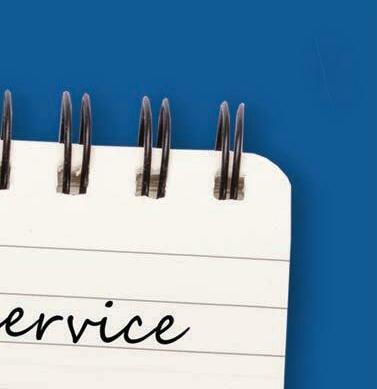
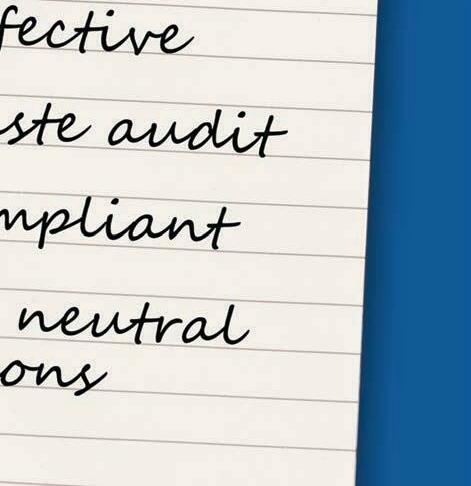





Contact us for a quote 01753 686 777 sales@grundon.com













Johnsons 1871 Ltd
FACILITIES SHOW EXHIBITORS 2022
FM1890
Labetts FM1412
Lavazza Professional UK FM1620
LightAir International AB FM2830
Lighthouse (UK) Ltd. FM2818
LUQEL Ltd. UK FM2664
Maine Storage Innovations FM1822
Matrix Booking FM1240
METRA INZENIRING D.O.O. FM2650
Metro Rod Ltd FM2024
Moneypenny FM2412
Nationwide Specialist Services FM1870
Northern Gas and Power FM1272
Nuvolo FM2035
Ojmar, S.A. FM2432
OPHARDT Hygiene FM1200
OUTCO FM1230
P & I Generators Ltd FM2430
Parcel Pending by Quadient FM3010
PestFix FM1276
PGH Beegone Pest Control FM1670
PHS Group plc FM1440
Planon Limited
FM2240
Plentific FM2842
Power Control Ltd FM3012
PPL Training Ltd. FM1820
Pressac Communications Limited FM2440
Principle Cleaning Services Limited FM1430
PURELY SCOTTISH BOTTLERS LIMITED FM2204
Redro Ltd FM2862
Reflex Vehicle Hire Limited FM1280
Refreshment Systems Ltd FM2662
SAF Tehnika JSC FM2860
Safelincs Ltd. FM1850
Seeclear Facilities UK Ltd FM2855
Selecta FM2040
Serrature Meroni S.p.A. FM2424
Service Works Global FM2270
SFG20 FM1834
Sidon Water Ltd FM1456
Sign In App Ltd FM2010
Slingsby PLC FM1400
Smartsoda UK Ltd FM2022
SRS Sales & Service Ltd FM1800
Streamline Systems FM1660
Sunbelt Rentals FM2210
Tabs FM Limited FM2235
Tecadec / BritishBins FM2812
Telecetera Ltd FM2414
Test Inc FM1630
The Nurture Landscapes Group FM2630
Trail Services UK Ltd FM2015
Trane UK information FM1460
TSE Power LLP FM1480
UbiqiSense ApS FM2880
Verisae Inc FM2620
Vital Power Ltd FM1432
Waste Experts FM2656
Waste To Wonder Network Operations Ltd FM1826
Weightron Bilanciai Ltd FM2420
Whi away Ltd. FM1622
WiggleDesk FM2865
Wow Now Hire FM2230
Xpress Relocation FM2652
Your Workspace FM2660
YPO FM1632
FIREX INTERNATIONAL
Making life safety a right, not a privilege
FIREX International is the premier global hub for fire safety professionals, o ering you the chance to meet with hundreds of suppliers and end-users, and align your security and fire safety strategies with 25+ hours of seminars.
Meet leading suppliers throughout the three days alongside key fire safety associations, including FIA, ASFP, FPA and more. Enjoy several networking opportunities, from breakfast and drink receptions to closed-door roundtable discussions.
Visitors can explore some of the newest fire safety technologies available and examine recognised third-party approved fire safety products and services, many of which are on display for the first time since the pandemic. www.firex.co.uk
IFSEC INTERNATIONAL
The #1 reunion for the security industry IFSEC International is the largest physical security event in Europe bringing together thousands of global security professionals from the entire supply chain, including manufacturers, distributors, installers & integrators, consultants and end-users.
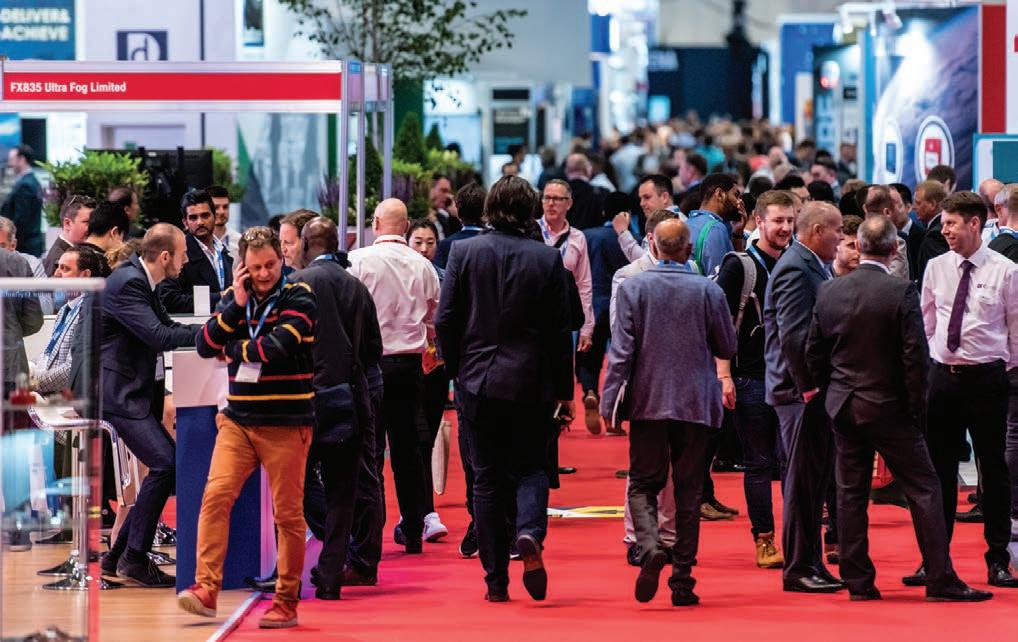
Meet face-to-face with leading global suppliers alongside key security associations BSIA, SSAIB,
The security industry has seen ground-breaking innovation and product development over the last couple of years. Join an exclusive platform to explore the latest developments - some of which will be on display for the first time. www.ifsecglobal.com
www.facilitiesshow.com
TO ADVERTISE IN MONTH IN FM PLEASE CONTACT
OR CALL 01322 476811 APRIL 2022 32
DANNY.GRANGE@KPMMEDIA.CO.UK
the Security Institute, ASIS, FSA and more. Enjoy several networking opportunities, from breakfast and drink receptions to closed-door roundtable discussions.
To secure your free ticket to the Facilities Show and co-located shows, and position yourself at the heart of the profession, visit the website today.





Testing, testing, one, two, three *Chargeable at £325.00 + VAT, but credited in full if pre-quoted Spirotech products are specified for the associated installation. A second call or visit would be required to discuss the in depth report. If water testing is agreed upon following our recommendation, the customer or the approved contractor would be required to take the water sample from the system on the same day as the site visit. The Spirotech representative would complete all paper work and deliver the water sample to the laboratory for testing. Spirotech UK will not accept liability for any repairs incurred during the water sample testing period. Register NOW for your free Water Quality & Total Solutions CPD FREE on-site inspection, including a basic water test with fast turnaround A full water analysis* and detailed report For more information, call us on 0208 451 3344 or drop us an email at salessupport.uk@spirotech.com Scan the QR code to register for your water quality CPD.
FRESH START
More businesses are turning to cleaning techniques like fogging, for example – which involves the dispersion of the fine particles of liquid sanitisers or disinfectants to provide whole room decontamination. Whilst this method is something that would have only been carried out once per quarter prior to the pandemic, increasing this to a monthly process at minimum will help keep the o ice safe.

Investing in a knowledgeable cleaning team who can guide businesses through the most COVIDsecure cleaning measures will help to ensure that employees can return to the o ice safely. Now that cleaning teams are tasked with the he y role of protecting workers from the potential threat of Coronavirus, it is integral that we begin to view cleaners as essential workers.
QUALITY IS INTEGRAL
The e ects of the pandemic have resulted in a huge shi in the attitudes of the UK’s workforce - and society as a whole - towards di erent work settings and environments. With recent research suggesting that 83 per cent of workers see hybrid-working as their ideal form of working, it is clear that flexibleworking is here to stay beyond the pandemic.
The ‘new normal’ can create more di iculties for ensuring COVID safety in the workplace. Cleaning teams are faced with a more complex situation, as workers are returning to the o ice, the sharing of desks and di ering schedules that see workers coming and going as they wish mean that businesses can no longer rely on pre-pandemic cleaning processes. It is crucial that a more rigorous and consistent approach is adopted.
With COVID restrictions easing, the first quarter of 2022 has seen workers returning to the o ice in unprecedented numbers. At the end of February, for example, the overall average footfall across the UK’s 63 largest city centres was only 7 per cent lower than pre-pandemic levels.
The return to the o ice has been welcome news for businesses, with many implementing hybrid-working policies to encourage workers back into the o ice to avoid the long term impacts of remote working, such as burnout and declining productivity. However, as we adapt to the ‘new normal’, companies must also cater for the surge in demand for flexibility and convenience that has been prompted by working from home.
Google recently spent $1 billion on the purchase of a new refurbished o ice space in London, highlighting its commitment to o ering higherquality workspaces, an attitude which can be reflected amongst many businesses.
In 2022, workers are likely to seek an o ice space with the same comforts they benefitted from when working from home. In fact, 37 per cent of employees are still concerned about returning to the city due to o ice cleanliness and hygiene. And with questions over coronavirus still being raised, businesses are under more pressure than ever to keep their facilities
up to scratch.
Therefore, for businesses to provide improved amenities and successfully tempt workers back into the o ice with assurances around quality and safety, investing in a strong cleaning team and cleaning regime will be crucial.
CLEANERS ARE ESSENTIAL WORKERS
As more and more workers return to the city, businesses will be looking to o er higher-quality workspaces with the adequate health and safety precautions. With 80 per cent of employees missing interactions with their colleagues, the provision of collaborative spaces in o ice facilities, to make sure that workers can make up for lost time, will be essential. However, with one in 10 people still feeling anxious about the prospect of a return to the o ice, an o ice’s cleaning team will be vital in keeping doubts at bay.
Indeed, 75 per cent of UK businesses are already implementing cleaning measures that go above and beyond the government’s guidance. This suggests that there is widespread consensus on the importance of an o ice’s cleaning regime. Enhanced measures will only reassure employees further and continue to protect them from any future resurgences of COVID.
Here at OSC we have developed a ‘flow-cleaning’ method, where our cleaning teams clean as they go rather than travelling to rooms individually, to ensure that no high touch areas are missed. Businesses must invest in a cleaning team which is adaptable to the ever-changing COVID situation, as cleaners provide an o ice’s first line of defence.
LOOKING TO THE FUTURE
While the easing of restrictions is a promising sign for businesses in all sectors, Coronavirus is still very much rife, and as we saw with the Omicron variant, the possibility of tightened restrictions in the future cannot be ruled out completely. Given this context, businesses will be keen to continue developing higher-quality facilities.

With 69 per cent of Britons more conscious than ever about cleanliness and hygiene, it will be up to a business’ cleaning team to ensure that workers remain invested in a return to the o ice. The provision of an experienced cleaning team will be integral to protecting workplaces from the ongoing threat of COVID and will also alleviate the concerns of workers over health and safety measures and hygiene.
The fact that cleaners play such a key role in providing a safe return to the o ice, and protecting workers from the spread of COVID, is proof that businesses must start to regard a knowledgeable cleaning team as essential workers.
APRIL 2022 34 FEATURE CLEANING - SUPPORTING THE STAFF
Cleaning sta have an essential role to play in a safe return to the workplace, says James Carver, Managing Director of OSC



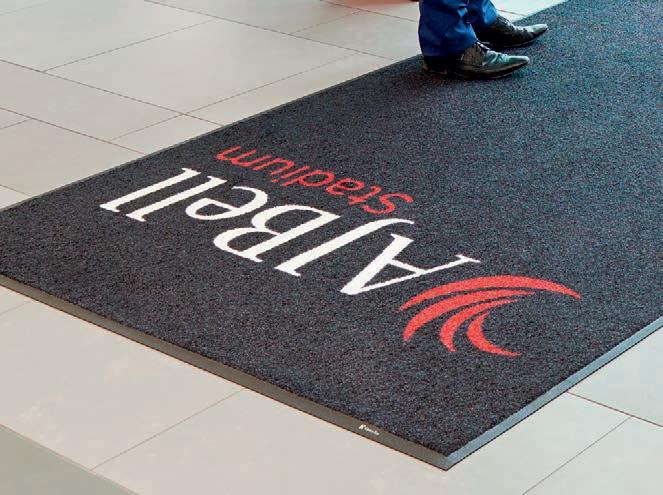








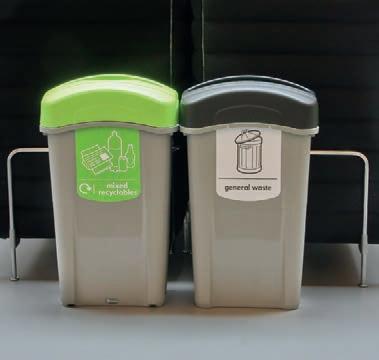

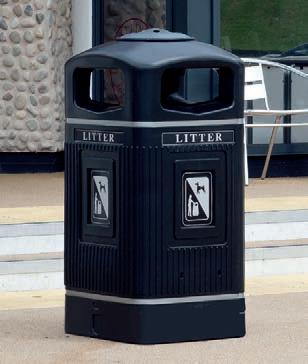
With more than 50 years experience in mat production and innovation, Kleen-Tex provides a wide range of products to reduce dirt and moisture from entering your premises. þ Keep dirt and moisture at bay þ Reduce slip hazards þ Cut cleaning costs MAKE MORE OF YOUR FLOOR For more information: +44 (0)1204 705070 www.kleen-tex.co.uk info@kleen-tex.co.uk www.glasdon.com
RETURN TO REALTY
The world’s leading real estate conference MIPIM returned in March, and the need to meet Environmental, Social and Governance (ESG) objectives formed the backdrop for much of the discussions. Craig Peters, Consultant at Magenta Associates reports
2022 signalled the return of MIPIM a er a three-year hiatus. Over 20,000 delegates from more than 80 countries congregated in Cannes, France, for the global real estate conference against a backdrop of the global pandemic, environmental concerns and, now, the war in Ukraine.
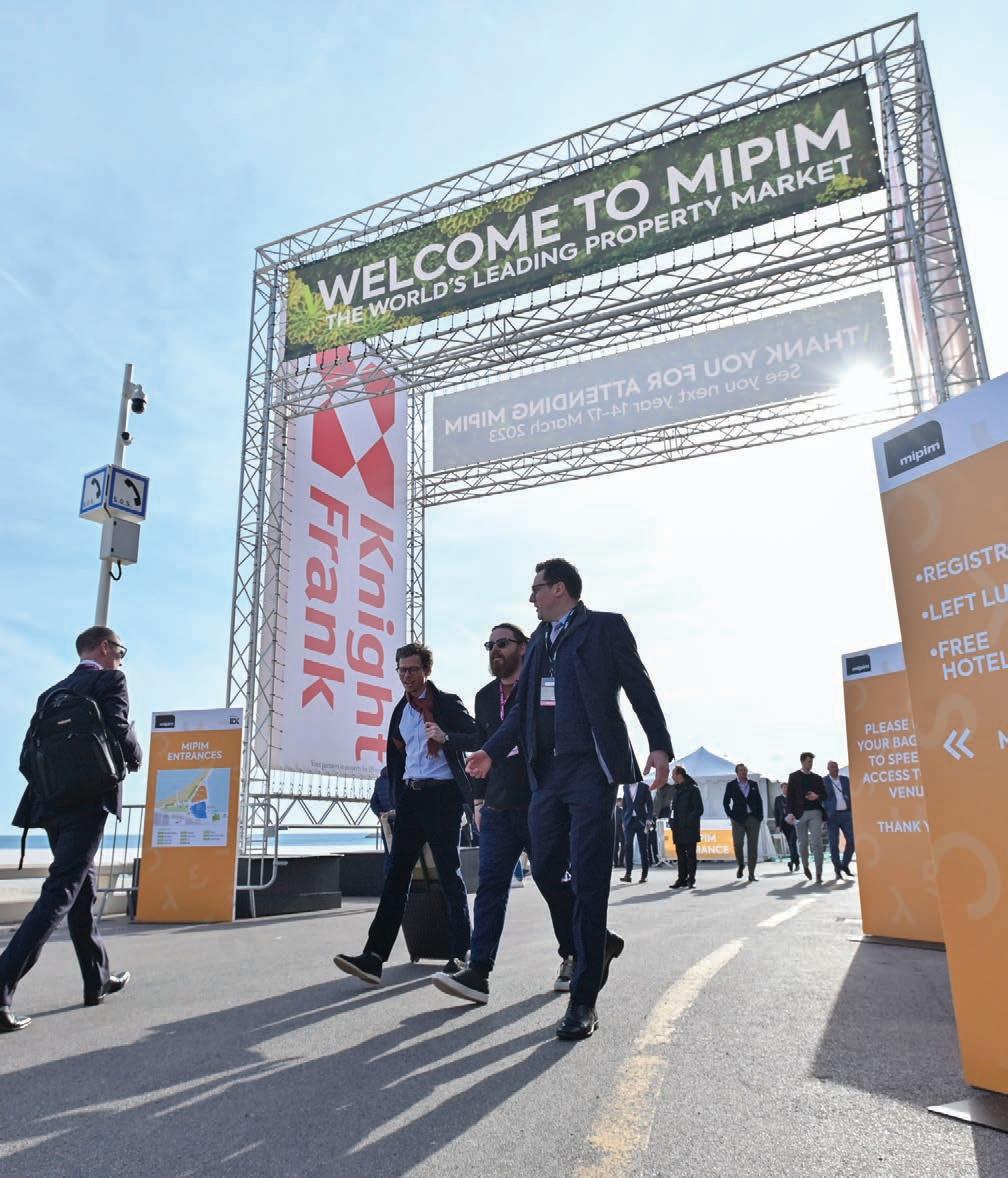
François Hollande, former French President, opened the conference with a keynote address on Tuesday 15th March. The conference theme ‘Driving Urban Change’ encouraged the industry to explore and discuss the challenges of climate change, a ordability, liveability, and technological innovation in cities.
‘Driving Urban Change’ would be covered across six sub-themes: The Cities for Citizens – The big debate; Housing First – Back to essentiality; Green is the new black – The new deal; The o ice uprising: Innovating to bounce back; Real Estate: much more than an asset – a jump in a financial market; and Real Estate Tech – Future is now!
THE RESURRECTION OF THE OFFICE?
A er so many people were forced to work from home these past two years, there was an overwhelming belief at MIPIM that 2022 would see somewhat of an o ice resurrection. Recent o ice occupancy data in both the UK and London from workplace technology company, Freespace, revealed that Thursday 10th March was the busiest o ice day since before the pandemic in March 2020.
Mark Dixon, Founder and Chief Executive of global workspace provider IWG, joined a panel to discuss the implications of the hybrid work revolution. “Almost all workers will work in a much more flexible way in the future,” he said. “It’s practical. Workers want what’s good for them. They want to be productive and to support the company they work for, and they don’t want to commute too far. They want local and convenient working. It’s about working from anywhere and being productive. And the hybrid model is desired by most people and companies, who are looking to reduce their carbon footprint.”
Dixon also acknowledged that technology has facilitated the hybrid work model and intrigued the audience by suggesting that “massive amounts of new technology is in the pipeline that will make collaborative work possible without people being in the same space”.
The panel boldly agreed that in three years’ time, MIPIM will look completely di erent because the geography of work and building design will rapidly evolve. This presents a significant change for the real estate industry and its investors with buildings becoming more like a series of platforms that workers use as opposed to individual assets.
Environmental, Social and governance (ESG) provided an overarching backdrop to many of
APRIL 2022 36 FOCUS CORPORATE REAL ESTATE
the debates. Stephen Brown, Senior Vice President Global Market Development at the International WELL Building Institute (IWBI), revealed that ESG drives most of his conversations with clients and large developers in the investment community. “It’s amazing to see,” he said. “The pandemic has reminded everybody that you can’t achieve anything unless you have happy, healthy, engaged people.”
A recent report from RICS also suggested that, collectively, we must change the way that we evaluate real estate’s worth and its contribution to the wider society.
Speaking at the conference, Paul Bagust, Head of Property Standards, RICS, said: “The occupation of commercial buildings has changed radically over the past couple of decades. Technology has wrought enormous change; business models and consumer habits have been transformed; environmental concerns have come to the fore; attitudes to health and wellbeing are evolving rapidly; expectations of the workplace are far more sophisticated; and the role of real estate in corporate planning is changing rapidly.”
REAL ESTATE – MUCH MORE THAN JUST AN ASSET
MIPIM revealed that real estate is now
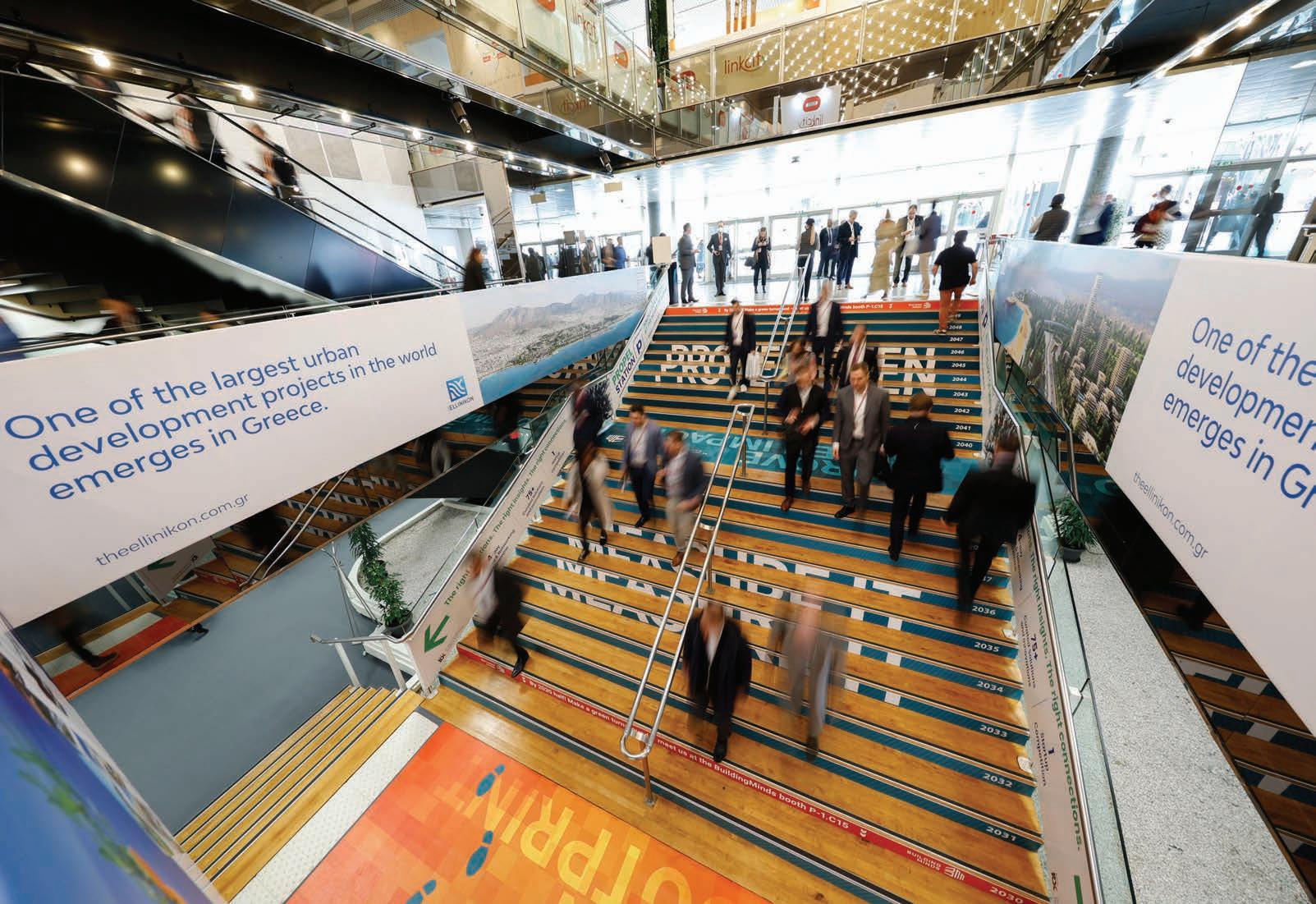
considered a financial asset and a source of return and diversification, appealing for investors.
Courtney Fingar, Editor-in-chief at Investment Monitor, chaired a conversation with Laurent Lavergne, Global Head of Asset Management & Development at AXA; Neil Slater, Global Head of Real Assets at Abrdn; Aleksandra Njagulj, Global Head of ESG for Real Estate at DWS and Aida Feriz, Executive Director at Wimmer Family O ice.
for landlords from an ESG point of view,” said Njagulj. “We need to accept that ESG criteria are changing constantly. We need to be ready for this and have policies and approaches which are flexible because ESG is constantly changing.”
occupation of commercial buildings has changed radically over the past couple of decades. Technology has wrought enormous change; business models and consumer habits have been transformed; environmental concerns have come to the fore; attitudes to health and wellbeing are evolving rapidly...”
The panel agreed that, from a sustainable perspective, the industry needs to do more than just put solar panels on a roof, and that sustainability is increasingly linked to financial performance as it is virtually impossible to sell a non-compliant asset.
As a result, ESG criteria is being factored into investment calculations.
“The question of ‘who is the tenant in our building?’ is coming up more o en in conversations. It is a challenging question
Slater added: “If you compare real estate today to how it was 20 years ago, how we think about it, and how we measure it, it has evolved significantly, and that makes the asset class well positioned for the next five to 10 years in an inflationary environment.” Slater also reiterated that the way online transactions are done is going to result in significant structural shi s in major cities, such as London, Paris, and Amsterdam.
LONDON – LEADING THE WAY IN DECARBONISATION
With significant investments going into the climate and building technology required to deliver the London Mayor’s ambitious roadmap to net zero, the capital is world leader in the decarbonisation agenda.
Edith Blennerhassett, Director, Buildings Engineering, ARUP; Abigail Dean, Global Head of Strategic Insights, Nuveen Real Estate; and Philip Graham,
APRIL 2022 37 FMJ.CO.UK CORPORATE REAL ESTATE FOCUS
The
Executive Director, Good Growth, Greater London Authority held a lively debate on how the capital can continue to lead on decarbonisation by embracing the transformation and repurposing of buildings and places for energy reduction and embodied carbon retention alongside urban regeneration.
Blennerhassett said: “Eighty per cent of the buildings that are with us now will still be with us in 2050. There’s an opportunity to retrofit these buildings for lower net zero carbon. The embodied carbon in those buildings is a huge benefit. If you can reuse the structure and reuse as much of the building as you can, a massive carbon saving will be had.”
For London to continue leading the way in decarbonisation, the panel agreed that organisations must tackle data transparency. Dean said: “We do not know how much energy is used in all of our buildings where our occupiers are procuring energy themselves. We cannot always access that information. It’s incredibly administratively burdensome to do so. The occupiers are not always inclined to share it with us. And even if they are, we can’t always get it easily through the utility companies.”
CONCLUSION
It was promising that ESG formed the spine of MIPIM 2022. Additionally, the conference tackled diversity across the industry. There has clearly been a step change evidenced by an overwhelming belief at MIPIM that COVID forced corporations to step back and focus on their priorities, personally and collectively.


As Dean said: “ESG has gone from being a nice to have to something people really want to see. Any real estate investment activity
is sure to have an ESG focus and clear decarbonisation plan. It is driving strategy forward.”
With one delegate describing the MIPIM of old as ‘male, pale, and stale’, it was refreshing to note that many panels featured women with diversity top of the agenda. Freehold, a networking forum for LGBTQ+ professionals working within the real estate sector, and Women in Property were all there, with events on the calendar. The Gend-Her networking event returned, bearing more significance than ever. It featured an inspiring speech from award-winning author Michelle King and Wendy Mann, CEO of CREW Network. This interactive session explored how gender
balance in the real estate industry can boost creativity and economic growth.
The “diversity” conversation has moved on from representation and a box-ticking exercise to an understanding that more diverse voices are needed. However, the famous Café Roma and other local restaurants spilled out with crowds which were noticeably largely made up of men onto the cobbled streets throughout the event.
According to the Global Real Estate DEI survey, 43 per cent of real estate companies in Europe employ a professional dedicated to ‘diversity, equity and inclusion’. As real estate moves towards a more human-centric business model and the lines between the real estate professional and the property’s communities, it is evident that diversity and inclusion is a topic that must spearhead the agenda in 2023.
ESG, wellbeing, and diversity were the key themes at MIPIM 2022. It’s heartening to think that, as challenging as the past two years have been for all industries, many people have used this period as an opportunity to analyse what’s important to them personally and professionally.
The WELL Building Institute’s Stephen Brown prudently added that health and wellbeing are two huge metrics around social human capital. “If we can’t get our own wellbeing in line, we are going to be very unproductive,” he said. Brown admitted that he talks regularly to chief medical o icers, chief wellbeing o icers, chief sustainability o icers and anybody involved in ESG reporting about mental health. That is a huge step forward.
However, words must lead to action.
www.mipim.com/en-gb.html
APRIL 2022 38 FOCUS CORPORATE REAL ESTATE





























EST000926_A5_Landscape_OUTLINED_CMYK_100%.indd 1 16/03/2021 09:04 0121 559 9000 Sales@Keytracker.com Extensive Range of Key & Asset Control Systems and Solutions Managing keys and other assets vital to daily operations can pose many challenges to any organisation. In busy environments where multiple users are collecting and returning shared-use items, it is essential that assets can be easily tracked and controlled.
Launched in 1868, the Royal Institution of Chartered Surveyors (RICS) is one of the leading institutes within the built environment, representing 140,000 members operating out of 146 countries. Over the past year it has been hit by a governance scandal that led to the resignation of four senior figures, including CEO Sean Tompkins and President Kath Fontana. This followed the publication of an independent review by QC Alison Levitt that found four nonexecutives who had raised concerns over an audit in 2018 had been wrongly dismissed.
Now operating under a new interim team, the RICS is awaiting the results of an independent review being carried out by Civil Servant, Lord Michael Bichard into its governance and purpose. One of the most eye-catching comments from Bichard’s summary of responses so far was that many members felt that power has shi ed from members to senior sta at RICS to such an extent that “RICS was no longer a member-led organisation”.
He has also referred to the survey ‘Defining our Future’, carried out prior to the governance crisis, which pointed to a decline in member engagement in recent years. The RICS had in fact, already taken steps to address this issue, and now, running separately to the Bichard review, has set up a Member Engagement, Experience and Value (MEEV) working group. It is chaired by Rory Murphy, Commercial Director at VINCI Facilities and a fellow of RICS who has long been associated with the FM group at RICS.
He explains he was approached to take on the role before the governance crisis hit: “The Bichard review is looking at governance and purpose which doesn’t really cut across what we’re doing. Our group is absolutely focused on membership feedback. And it isn’t about us coming up with our own ideas, it’s more about responding to specific issues that members have raised and working with the management team within the RICS to help develop solutions which we then road test. We’re very much a working group.”
Defining our futures was carried out in early 2021 and comprised round tables and consultations to gather feedback on the Institute.
Says Murphy: “What came through was how di icult it was [for members] to become engaged with RICS. Membership experience was another issue, including transactional challenges like
renewing your subs or contacting the call centre and there were concerns about transparency.
“If you wrap all those issues together and it’s in the heart of a pandemic, people were starting to question the value for money. ‘I pay my fees and what am I getting for it, what’s in for me? If the experience isn’t great and the engagement isn’t great, what am I getting?’”
WORKING GROUP
Murphy was approached to chair the Member Engagement, Experience and Value (MEEV) working group by the exec team who’d noted his previous successful chair of the responsible business in real estate report.
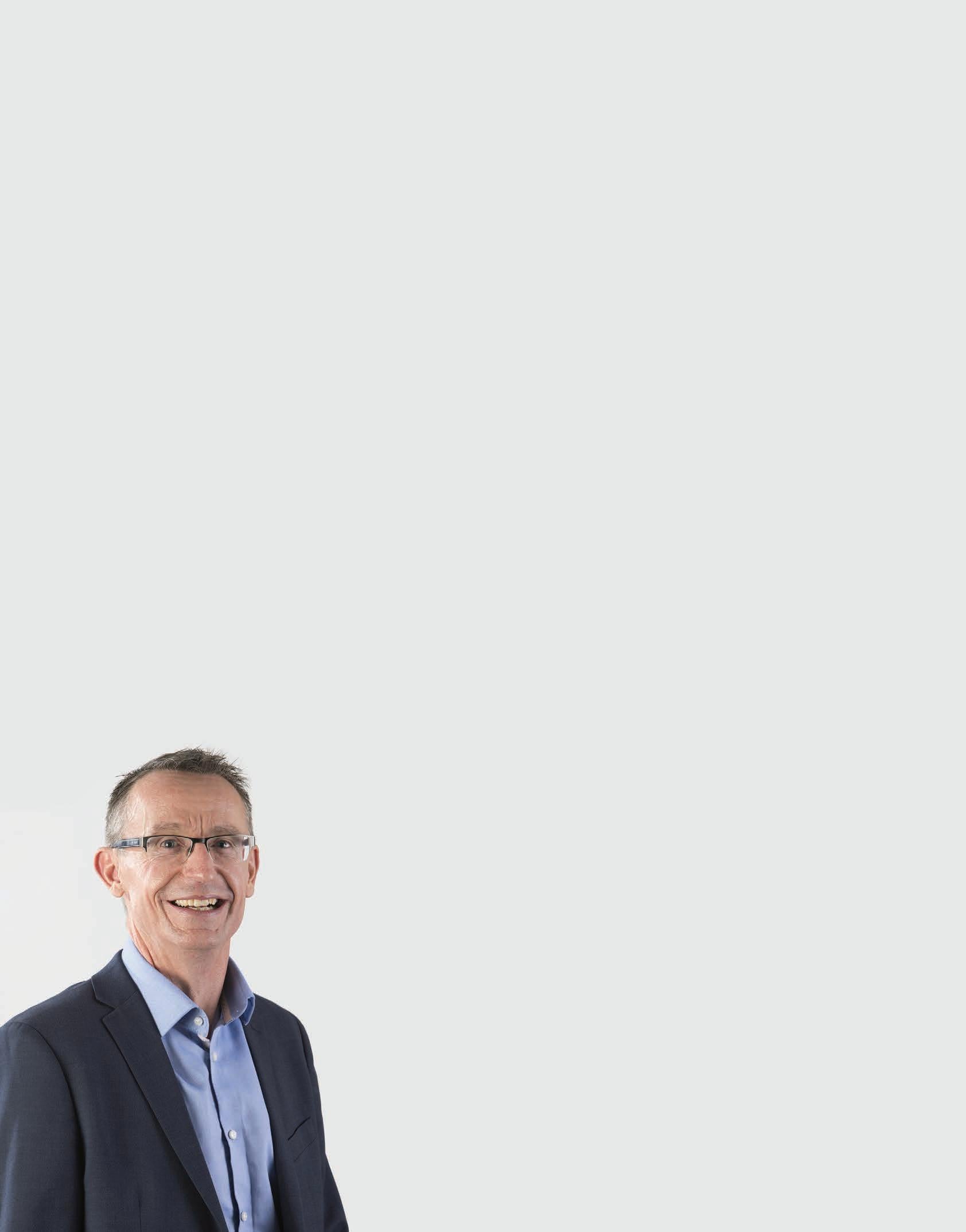
He says: “I’d helped the RICS for over 12 years on the FM side and I’ve got so much time for the team there. I did genuinely want to come and help so it wasn’t much of an ask, though I wasn’t 100 per cent sure what I walking into.
“I think they knew I’d take an honest, pragmatic approach as I’m not interested in the kudos of doing it but just wanted to help make things better. I was delighted but slightly terrified to be asked but I was aiming to help shape it to make a di erence. The group is fundamentally about the membership and addressing very real concerns about Engagement, Experience and Value but I also want to help the teams that work at the RICS be proud of the institution and the tireless work they do.”
The group is made up of three members of the governing council from Germany, the Caribbean and Australia and five world regional board chairs, hailing from UK & Ireland, Europe, Asia, the Americas and the Middle East. There are also three UK national board chairs and three board chairs from around the world, including Poland, Hong Kong and UAE along with a representative from
APRIL 2022 40 FOCUS INTERVIEW
Rory Murphy FRICS, Commercial Director, VINCI Facilities, chairs the RICS’ new member engagement, experience and value (MEEV) working group. Here, he brings Sara Bean up to date with the ethos and progress of the group
Matrix in the UK to represent the younger generation.
“It’s all very cosmopolitan,” says Murphy. “And with a total of 15 on the group including me, it isn’t unwieldly, so we can get together once every couple of weeks. We have a clear programme we work with as we go through proposals and how we operate, given the global nature means some of our meetings are at strange times.
“Even with governing council members in the group there is no hierarchy and by including the world regional board leads they’ve a connection to their regions and can feedback our progress to their member’s groups. The working group also includes local board leads who are closest to rank and file members, so we’re very member led.
“We also have a good relationship with the exec team who I work with directly, and approach it as a partnership. Also, the RICS sta have been brilliant and they’ve been really good in picking this mantle up and running with it.”
Murphy is keen to point out that the group has anchored its activities to concentrate on responding to member feedback which guards against the group determining its own agenda. The group is also carrying out a gap analysis based on the RICS most recent survey of the profession to check that what people were commenting on a year ago is still applicable now.
Says Murphy: “All of the work we would focus on is 100 per cent anchored on whatever feedback we get and part of my role in ensuring that when these 14 people get together we concentrate on what the membership has told us, what we’re going to do to solve it and what is the output.
“It isn’t a group to which people address queries, we’ll respond to the feedback we’ve had and how to address that. It’s broad in its initiatives but knows its boundaries, which are areas that relate to the experience the members have, the value for money they perceive and how engaged they feel. That’s the frame of it and what we’re not trying to do here is address concerns about how the organisation is governed or what is its purpose – that is not for this group.”
MEMBERSHIP ENGAGEMENT
According to Murphy the biggest feedback they’ve had is regarding events, engagement and members coming together, whether they are social or more formal strategic conferences. A lack of interaction is due to a variety of issues, not least the huge impact of the pandemic. But alongside this, the number of professional
boards had diminished prior to COVID and the stripping back of resources by the former CEO and the exec team in the early part of the pandemic took away much of the regional support.
Says Murphy: “A lot of the feedback is that people can’t develop and host local events as we don’t have people on the ground, which they feel cuts into the value as it’s a people industry and they want to get together to share experiences.”
The biggest frustration he says has been the inability to see fellow members, and the resources not being there to make this happen.
“This is why the main thing now is resourcing and rebuilding, within the right financial constraints.
Rebuilding the resources around events and finding ways people can communicate in a meaningful way with each other. There’s a sense that the RICS was getting in the way of things happening, so this group is very much ‘how do we facilitate these events happening, how do we make sure we can all get together and how do we do that in the way that has the lightest touch?’”
To manage this fine balance, the MEEV
has announced RICS will formally support a number of free local engagement events, leaving members to play the leading role in the selection of the topics being covered.

RICS will play an ‘enablement’ role, helping the local members with organisation, logistics and promotion of the events.
“One of the things we’re trying to develop is more open conversations around what is feasible and what isn’t, given local membership numbers” says Murphy.
“The challenge the RICS has, like many organisations is in cutting a lot of sta during the pandemic it now has to top that number up which is di icult to do in the current recruitment marketplace.”
Learning and Development is an area that goes straight to the value of being a member of the institution. This is why a new CPD Member Support Package has been launched that o ers free CPD to members as part of their membership subscription. Murphy was particularly pleased with how quickly the RICS were able to deliver this change so that it was ready for the start of the 2022 membership period.
He explains: “When you go into the member value hub you can start your own CPD package to work across your number of required hours as part of your subscription. It’s a real recognition that you have to have something of value for your fees.”
Another key area of concern for members was transparency, so the group has worked with RICS teams to produce a chart depicting how the revenues generated from
APRIL 2022 41 FMJ.CO.UK INTERVIEW FOCUS
All of the work we would focus on is 100 per cent anchored on whatever feedback we get and part of my role in ensuring that when these 14 people get together we concentrate on what the membership has told us, what we’re going to do to solve it and what is the output.”
fees are allocated across the Institution. They intend to update this information annually, adding further layers of detail as they go forward.
Explains Murphy: “Now we have the transparent break down of fees, which was road tested on the group. I’m proud of the fact we’ve got a break down of the fee. It may prompt debate on how resources are allocated but it’s there in black and white and over time we can listen to the membership to determine if the split is right. It’s a mature discussion.”
BROAD CHURCH
RICS has a huge influence and reach but one of the drawbacks, according to Bichard’s summary of responses is that members do not feel engaged or supported in their professional area of practice, and cite other professional bodies of which they are members they felt were better placed to provide specialist advice and support. A similar complaint runs through the regional membership with those based in the UK complaining the drive for global expansion had become too dominant, while some members based outside the UK felt RICS was too focused on the UK. The RICS says Murphy is well aware of this conundrum.
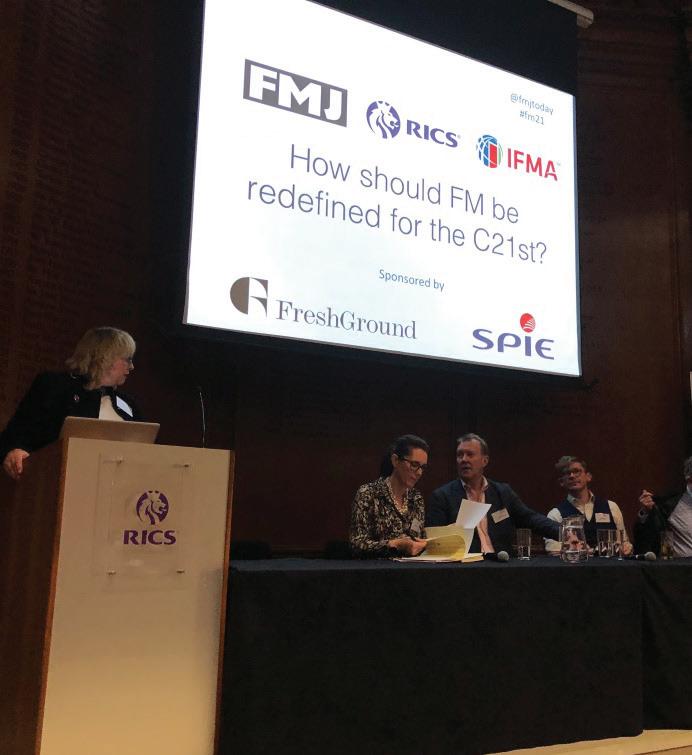
“One of the advantages of having the various regional board members is part of their role is to take a temperature from their boards on what they’re hearing from their members. We approach membership as a collective in this MEEV group, but clearly those various pathways would want the RICS to do more for them specifically, as do the various regions.
“I’d argue the broad church is the thing that makes RICS powerful, because we’re all operating in the building asset lifecycle. If you look at the global challenges, our environmental agenda or the D&I agenda they’re for everybody to contribute.
“Anyone who works within the built environment needs to understand these big issues. For instance, the IBOS standard which was published recently covers areas that we drive in FM and equally so, we’ve also published ‘Responsible Business in Real Estate’ which featured a lot of FM practitioners who helped pull it together.
“Over time the voice of the various pathways will have to be listened to in the same way the geographic conundrum is being consulted. Every member I’ve been in touch with has the intention of helping make RICS great again. No one’s looking back – we’re being positive about the future.”
COMMUNICATIONS AND FEEDBACK
MEEVs has already published an update report on the RICS website to keep membership informed on progress and will carry out six-monthly checks on engagement levels. They’re also looking at the metrics, including how many members are taking up the CPD o er, how many people have looked at the breakdown of fees and how many have visited the new member value portal. This latter initiative aims to bring together all aspects of the membership value proposition in one place.
Future digital plans include a digital communities portal planned for the second quarter of this year, to provide members with event and communication ‘autonomy’ along with a member-to-member digital community platform. According to Murphy, the creation of a digital community will o er much more opportunity for member to member engagement, and the option to start your own groups that include people with common interests.
He says: “This removes RICS from being the middle man in terms of GDPR perspective, so once a member joins a community they can communicate with other members across the globe. For instance, say you decide to set up a global FM group and have members across the
world. As with all of these things it’ll depend on members’ engagement but if you do take part you’ve the option to reach out to people wherever they may be.”
As Murphy comments: “Members are interested in developing their careers, getting value for money for their fee and meeting like- minded practitioners, and they want to learn and understand global issues as well as local issues.”
Less exciting but no less important priorities for the group are to explore hygiene factors such as the e ectiveness of the customer call centre, ways of increasing member influence and looking at how to rebuild professional groups - including how they will be structured.
Interestingly, feedback so far shows that most of the members also believe the institution should ensure they sort out the governance which is a key output of the current Bichard Review.
“What I’m seeing now is people are letting the organisation sort itself out and would like in the meantime to see output increase, but the RICS needs the resources to do so. My sense though is that people are happy to give the RICS space to work through these issues and I feel encouraged.”
FUTURE PLANS
The group is briefed to carry on analysing and responding to membership feedback for the rest of this year while the Institute waits to hear the outcome of the wider governance review.
However, Murphy’s personal opinion is that having a member led group of this sort which pulls together the constituent parts of the RICS would benefit the institution in the longer term.
He says: “We’re certainly here for the implementation of the issues we’ve outlined here and I think the ability to pull together the governing council, the world regional boards, the management team and membership is a real positive.
“In the longer term the members need a strong voice that can help make things happen. I appreciate we’ve got a huge responsibility to make the RICS work for the next 150 years – and with my built environment hat on, I want our younger generation to become as professional as possible, understand all these global challenges and operate in a responsible way.”
FURTHER INFORMATION
www.rics.org/uk/news-insight/latest-news/ news-opinion/rics-updates-for-memberexperience-value/
APRIL 2022 42 FOCUS INTERVIEW
Every member I’ve been in touch with has the intention of helping make RICS great again. No one’s looking back –we’re being positive about the future.”
REUNITING THE FM COMMUNITY
LEARN RECONNECT DISCOVER EXPERIENCE
Our popular seminars help property managers, FMs and asset owners stay on top of the future of the office and the very latest in sustainability, efficiency and government legislation.
Make up for lost time. Reconnect, learn and share at the world's largest gathering of FMs. Enjoy networking opportunities from breakfasts and drink receptions to closed-door roundtable discussions.
Speak to the experts, explore innovative new products and assess hundreds of leading facilities managment suppliers all under one roof, from Beckhoff and PHS Group to FSI and Planon.
Explore how the latest tech innovations can bring together facilities management, security, fire safety and wellbeing into one place in this unique, smart building environment.
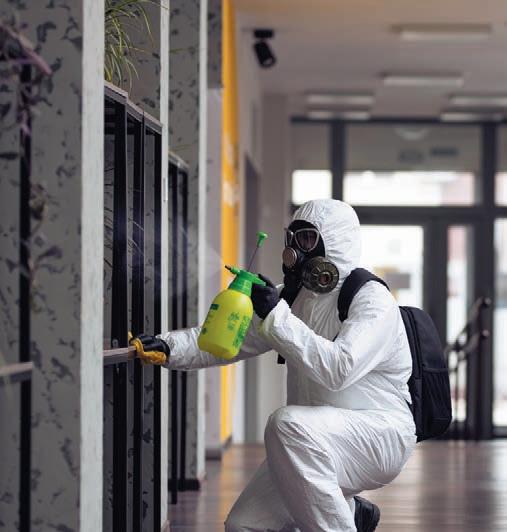


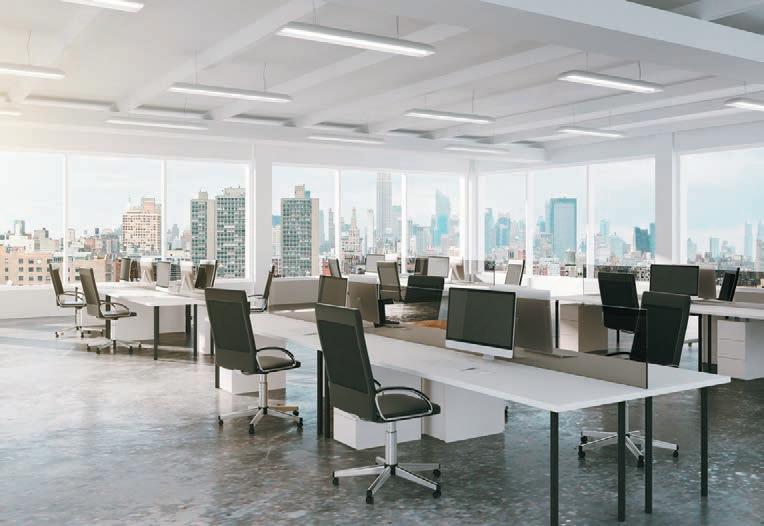

5 INDUSTRY SHOWS. 1 FREE TICKET.
REGISTER NOW FOR FREE AT FACILITIESSHOW.COM 5 SHOWS. 1 FREE TICKET.
OPERATIONAL PERFORMANCE
Climatic events over the past couple of years have created a renewed sense of urgency in the race to net zero. Just prior to the outbreak of the global COVID-19 pandemic, Australia witnessed some of the worst bushfires in its history, while in July 2021 several European countries su ered devastating levels of flooding caused by unprecedented volumes of rainfall. Closer to home, we recently witnessed the worst storm to hit UK shores for decades.
These extreme weather events, from droughts and hurricanes to flooding and wildfires, are reoccurring with increasing severity and frequency at a time when Arctic ice sheets are splintering and rainforests are shrinking. Indeed, the time for joined up action between public and private spheres around the world, is now.
Yet, we have another crisis on our hands. It was just three months ago when world leaders met at COP26. Ambitious commitments were made to help reduce fossil fuel usage. There was hope. However, the perils of a warming planet and the transition to renewable energy risks taking a back seat and being replaced with energy security as the world’s largest energy supplier, Russia, begins war with Ukraine. This new global crisis may force policymakers to backtrack on their e orts to decrease the use of fossil fuels that pump deadly greenhouse gases into the atmosphere. Therefore, we need hope to start fighting back.
THE TWO TYPES OF CARBON
Cutting carbon emissions and creating a committed net zero society is widely seen as the best way to mitigate the challenges posed by climate change.
The UK government has already stated its mission to reach net zero emissions by 2050,
and to cut emissions by 78 per cent by 2035, compared with 1990 levels. This makes it the first major country to legislate for such a goal.
Carbon emissions can broadly be split into two major categories.
Embodied carbon translates into all the carbon dioxide emitted in producing materials. It is estimated from the energy used to extract and transport raw materials, as well as emissions from manufacturing processes.
Looking at buildings specifically, the embodied carbon of a construct can include all the emissions from the construction materials, the building process, and all the fixtures and fittings inside. Furthermore, it also covers emissions from deconstructing and disposing of components at the end of its lifetime.
Embodied carbon is an important barometer through which to strategise and measure net zero action.
Urbanisation is accelerating across the globe – by 2050, more than two-thirds of the world population will live in urban areas, meaning architects and developers must prioritise reducing carbon emissions during the design and construction of new builds.
With embodied carbon playing a more significant role to the life cycle carbon emissions associated with a building, attention has begun to be more focussed on how di erent construction materials might a ect both di erent types of carbon and their emissions.
However, what is o en overlooked is the environmental footprint of our current building stock.

APRIL 2022 44 FOCUS ENERGY MANAGEMENT
Kevin Mcguane, Sector MD, DMA Group explains the di erences between embodied carbon and operational carbon and how focusing on the latter could reap energy saving benefits for the built environment
This is where focus on operational carbon enters the picture. Operational carbon is the amount of carbon emitted during the operational or in-use phase of a building, which can include the use, management and maintenance of a product or structure.
Currently, it accounts for 28 per cent of all global greenhouse gas emissions, compared to the 11 per cent stemming from embodied carbon.
A brighter spotlight therefore needs to be shone on operational carbon. The World Green Building Council’s Net Zero Carbon Buildings Commitment is a good example to follow, as it factors in equal embodied and operational carbon weighting into its approach.
Its requirements (geared towards net zero by 2030) are certainly bold. But they represent the sort of ambition that is needed to make meaningful progress.
“This requires deep collaboration across the entire value chain, and radical transformation in the way buildings are designed, built, occupied and deconstructed. It requires new business models that promote circularity, re-use of buildings and materials, whole life cycle thinking, high performance operations, and ultimately a shi away from fossil fuels.”
World Green Building Council, Net Zero Carbon Buildings Commitment
TAKING OPERATIONAL CARBON SERIOUSLY
It is estimated that some eight in 10 of the buildings that will be standing in 2050 have already been built, meaning any local, national or international strategies to reach net zero simply must factor in making our current stock more sustainable.
This means that property developers, owners, occupiers and policy makers must determine the best means to improve the energy performance of their buildings.
There are many ways this can be approached, the most obvious being to reduce the amount of energy required to maintain optimum temperatures. Here, investment in double (or even triple) glazing and insulation solutions – two of the most e ective solutions – is increasing rapidly.
The operation of o ices remains a substantial source of operational carbon emissions. Despite lower occupancy levels due to the growing number of people working from home, o ice temperatures are controlled all year; warmed in winter and over chilled in summer. However, the British Council for O ices Guide to Specification
(2019) has recommended that these temperatures be revised upwards from 22°c to 24°c in summer.
In 2020 the worldwide market for building insulation reached $28.3 billion, yet by 2028 this is predicted to surpass $38.4 billion. And such growth could be even steeper if restraints including fluctuating raw material prices and a lack of workforce are addressed. Where energy is needed within buildings to heat or cool them, renewable sources o er another way to reach net zero.
In the UK, panic among businesses and consumers about rising energy prices remains rife. This makes it imperative that alternative, sustainable sources of energy are brought online in greater volumes – in terms of buildings, solutions such as heat pumps and hydrogen (or part hydrogen) boilers are entering conversation about decarbonising the gas grid.
Smaller-scale solutions will also play their part, be it switching to LED lighting, installing hot water alternatives, educating employees and residents, or even adopting smart building management tools and processes. These can include the use of sensors to forecast and respond to varying levels of building occupancy, and adjusting heating, cooling and lighting output accordingly.
Indeed, from what we are seeing on the ground, it is clear that developers and buyers are becoming increasingly keen to leverage energy management, carbon technology and renewables.

This is critical if the building sector is to play its part in progressing towards net zero, both from an embodied and operational carbon perspective.
CONCLUSION
We know the road to net zero is going to be a bumpy one. It’s a tough, but worthy commitment. Buildings with poor temperature controls, or older buildings with poor fabric or insulation face various hurdles. Older buildings particularly pose various challenges when it comes to sustainability.
Retrofit, refurbishment and conversion all generate embodied carbon emissions so the number of materials used, the carbon content of these materials, and how retrofit is carried out must be carefully considered upon any project. The biggest contribution that real estate makes towards decarbonisation will come from improving existing buildings, representing 80 per cent of the national estate use by 2050. Research in 2019 from Historic England’s The Heritage Counts also showed that demolishing a historic building and replacing it with a new building can result in greater carbon emissions by 2050. This is due to the associated embodied carbon.
If we are to meet our national climate change targets, then by 2030 all new buildings must operate at net zero carbon –and that means a radical change in the way we approach their design.
Reducing demand is a big practical step to take to reduce energy consumption. But we should be encouraged that we have already reduced CO2 in the UK by 30 per cent in the past decade and achieved a huge increase in general awareness by talking and debating about it more. The ambition of delivering better homes and buildings, cleaner air, and unlocking investment remains in sight. But it will only be reached with genuine ambition and commitment.
APRIL 2022 45 FMJ.CO.UK ENERGY MANAGEMENT FOCUS
KEEPING WASHROOMS SAFE AND SUSTAINABLE
With COVID now an accepted presence in our lives, our wellbeing remains important and businesses must ensure their buildings are kept as infection-free as possible. Providing clean and well-maintained premises is a challenge for facilities managers, placing greater pressure on them to ensure workplaces and public spaces resume normal activity safely.
From the moment people enter a building to when they visit the washroom, they expect to be reassured that all spaces are clean and safe. As well as providing an indication of the overall cleanliness of a building, washrooms play a fundamental role in helping to minimise the spread of viruses and germs. However, it’s vital to ensure that washroom systems don’t just deliver optimal hygiene – they must be sustainable, robust and easy to maintain too. So, what do facilities managers need to consider when choosing their solution?
IS YOUR WASHROOM TIDY AND WELL-STOCKED?
Greater washroom use means that supplies of soap and towels deplete faster, requiring more frequent replenishment. Washrooms must be well-managed, with a continuous supply of soap and paper to allow visitors to wash and dry their hands and prevent them lingering in the washroom looking for supplies.
High-capacity units ensure a lasting supply and help to reduce frustrating run-outs for washroom users, as well as cutting down on the number of service visits required by operatives to restock.
Minimising the time that maintenance teams need to spend in washrooms is clearly important, so it’s helpful to have dispensers that are quick and easy to replenish. Cleaning operatives need to be able to see at a glance if paper dispensers need refilling, so it’s worth looking for ones with clear inspection windows that clearly show if they are nearly empty.
Lockable dispensers (ideally with keyed alike locks, so one key fits all units), deter vandalism and pilferage and reduce subsequent janitorial time to fix problems.
HOW CLEAN DOES YOUR WASHROOM LOOK?
People naturally want to feel confident that the washroom is being cleaned frequently, so it’s important to show that it is properly maintained by keeping it tidy and clearly displaying up-to-date details of cleaning schedules.
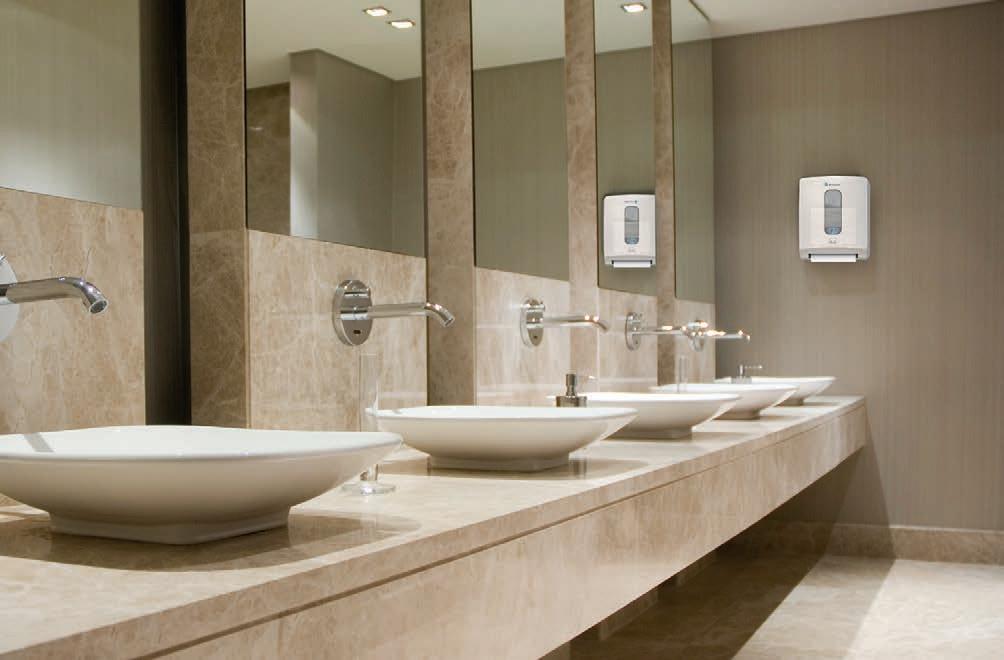
Dripping soap dispensers or bins overflowing with hand towels is unsightly, so it’s worth considering
non-drip soap dispensers and high-capacity, controlled-use devices that restrict the use paper and prevent over usage.
It can help to enhance hygiene in the washroom by minimising touch points. Contactless paper dispensers where people only need to touch the paper they will use help to reduce the spread of germs.
WHAT ABOUT HAND DRYING?
Damp hands spread more germs, so it’s essential to look for hygienic hand drying solutions. Paper towels are an e ective option as they dry hands more quickly and hygienically than air dryers and can be used by visitors as a barrier to avoid touching the door handle when exiting the washroom. Hand towel dispensers that dispense one sheet at a time in economical sheet lengths help to reduce waste and costs when consumption is likely to be higher.
More washroom footfall subjects the dispensers themselves to more wear and tear than usual, so units need to be durable as well as functional. FMs should seek out dispensers that are made from hardwearing materials that can withstand heavy use.
IS YOUR WASHROOM SUSTAINABLE?
Sustainability is a pressing issue, so FMs should consider how they can make their washrooms more environmentally-friendly. Does your current
system use recycled materials where possible, with no unnecessary packaging? Is it designed to reduce over-use and create zero waste?
A solution like North Shore from Northwood for instance helps to deliver improved washroom hygiene standards, whilst also saving money and reducing waste. Designed to deliver zero waste and volume in use, it reduces the amount of deliveries of paper, lessens the quantity of packaging required and cuts the number of trucks on the road.
DO YOU HAVE HYGIENE REMINDERS IN YOUR WASHROOM?
For facilities managers, their role is more important than ever as they play a crucial part in helping to keep people safe in the coming months.
Communication will play an important role in helping ensure washrooms users support that e ort. For that reason, the use of posters on good handwashing and drying techniques are helpful reminders for people and convey that you are serious about hygiene.
Many people will still be nervous about entering workplaces and public spaces and it’s important for facilities managers to play their part by developing practical and sustainable washroom strategies that maximise hygiene and speed up time in the washroom, whilst also reducing the workload for cleaning operatives.

APRIL 2022 46 FEATURE
WASHROOMS
With more people returning to o ces and public spaces, it’s vital to ensure that washrooms are clean, hygienic and e ciently run facilities that people will be confident using. Paul Mulready, Marketing Manager of Northwood Hygiene Products Ltd looks at what washrooms can deliver



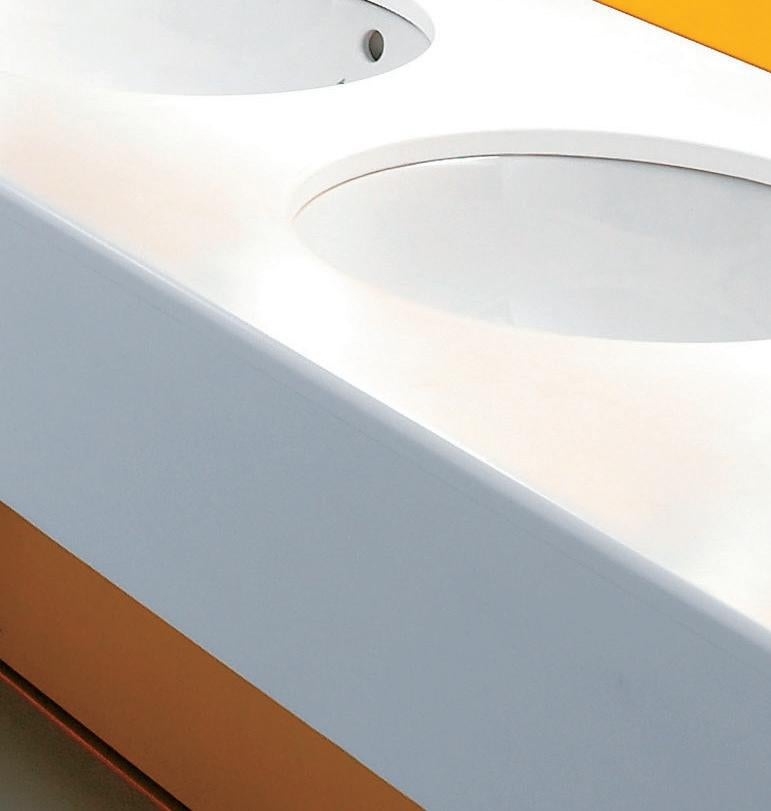





















Washrooms for Bars Restaurants Retreats Airports Studios Workspaces Hotels Train Stations Universities Schools Hospitals O ces Museums Galleries Theatres Cafés Armitage Shanks Hygiene Redefined LEARN MORE idealspec.co.uk part of the Ideal Standard group
PURER AIR
with sophisticated filter technology o er the best results and protection. Leading manufacturers have designed air purification systems that feature H13 HEPA technology which can capture hazardous contaminants as small as 0.1 microns, which are easily inhaled and can penetrate deep within the lungs.
Another factor to consider is how o en the air is cleaned. O ices are high-tra ic premises with employees and visitors accessing numerous spaces and coming into contact with multiple people throughout the average day. Given that COVID-19 and other harmful particles can remain in the air for some time, it is important to select air purifiers that remove contaminants from the air automatically and completely clean the air on a regular basis. Look for models that o er at least five air clean cycles per hour – the equivalent of every 12 minutes.
Even before the pandemic, the government cited air quality as one of the biggest environmental threats to health in the UK. Now, with the added concerns around the airborne transmission of COVID-19, the spotlight on air quality has never been greater. With businesses looking to safely reintroduce sta to the workplace and given the amount of close contact that colleagues can have with each other throughout an average working day, facilities managers should consider incorporating air purification measures into their occupational health strategies.
AIR PURIFICATION IN RESPONSE TO COVID-19
The British Medical Journal (BMJ) explains that when people infected with COVID-19 (or SARS-CoV-2) exhale, particles that include the virus are expelled into the air. If someone is within a “short range” (less than one metre away) they are at risk of inhaling these harmful particles almost instantly. Any remaining particles then disperse and can be inhaled by those further away – and even those over two metres away can be exposed. Particles can remain in the air for hours, so even a er the infected person leaves the premises, occupants
could still be at risk.
While measures like mask wearing, social distancing and keeping doors and windows open are somewhat e ective at reducing the transmission of disease, they are not always practical and are di icult to enforce – especially now that these steps have been removed from government guidance. Moreover, opening a window to access ‘fresh air’ can be rather counterintuitive when you consider the levels of outdoor pollution occupants will be exposed to, especially in cities or sites located near a busy road, or in industrial areas.
To minimise risk further, the BMJ recommends that an air ventilation or air purification system should be installed. This advice has also been underpinned by other organisations globally, including the Centers of Disease Control and Prevention (CDC) and The American Society of Heating, Refrigerating and Air-Conditioning Engineers (ASHRAE).
FURTHER BENEFITS OF AIR PURIFICATION
As well as reducing the transmission of disease, air quality has also been linked to wider health and wellbeing benefits. According to the NHS, ‘sick building syndrome’ poses a real risk to o ice workers. Poor ventilation
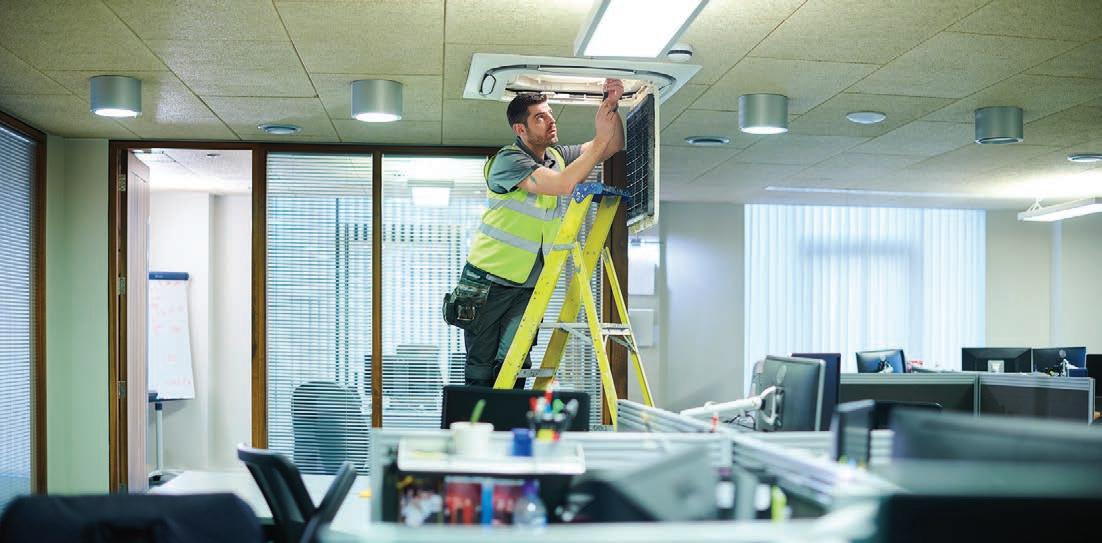
and exposure to particles like dust, smoke, fumes and fabric fibres, as well as chemical fumes including volatile organic compounds can cause employees to experience symptoms such as headaches, rashes, coughs, sore eyes or throat, tiredness and di iculty concentrating – which can therefore impact on employee performance and productivity.
In fact, research from Harvard and Syracuse Universities found that employee productivity can be a ected by the quality of workspace air. The study found that by improving ventilation and reducing indoor pollutants, cognitive function was vastly increased, with employees performing 61 per cent better on cognitive tasks than in the standard o ice conditions. It is therefore worthwhile considering how air purification can be implemented as part of a wider wellbeing strategy to ensure that employees are breathing in clean, purified air.
SPECIFICATION OF AIR PURIFIERS
When selecting which air purifiers to install, there are a number of considerations that should be taken into account. Quality models will be able to e ectively remove even the smallest particles from the air and here, solutions that are designed
Finally, for added reassurance that the air purifiers selected can deliver the level of protection needed, check that they have been accredited by an independent third party. For example, certified to neutralise the airborne viral load of SARS-CoV-2, able to remove 99.99 per cent of the aerosolised SARS-CoV-2 virus through a single pass of the purifier and even certified to remove 99.9 per cent of the H1N1 flu virus, commonly known as Swine Flu.
By controlling and cleaning the air to remove airborne germs and viruses (including SARS-CoV-2, the pathogenic virus responsible for the COVID-19 disease pandemic), as well as allergens, odours, gases and chemical fumes including volatile organic compounds, air purifiers are useful for high-tra ic spaces like o ices.
By focusing on the quality of indoor air as a long-term approach rather than a knee jerk reaction to the pandemic, facilities managers can help prevent the spread of germs and viral infections, while creating an environment focused on wellbeing.

FOCUS HEALTH AND SAFETY
APRIL 2022 48
Tim Browning, Head of Business Development - Air Treatment at Fellowes explains how air purification systems can help to safeguard against germs and viruses, and could o er wider benefits for the wellbeing of occupants

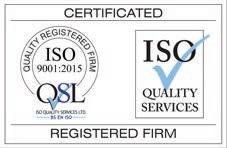


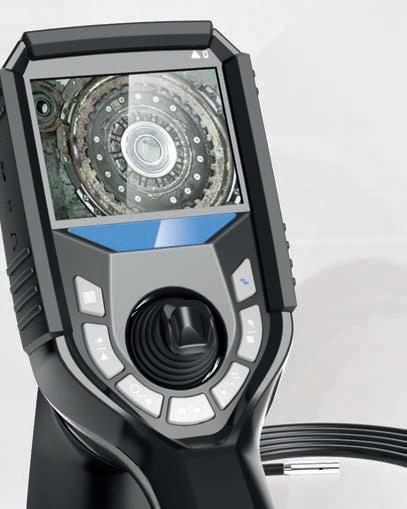
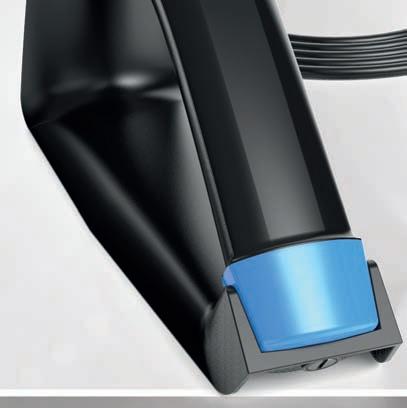





















HD Articulating Videoscopes • 360° Joystick control • Image, video and audio capture • Battery or mains powered • 1920 x 1080 OLED Screen Call us now on: 01761 404870 for more information and competitive prices. The new range of high definition videoscopes from Dart Systems. From 2.2mm diameter upwards +44 (0) 1761 404 870 enquiries@dartsystems.co.uk www.dartsystems.co.uk Dart Systems Ltd, Environment House, First Avenue, Westfield Industrial Estate, Radstock BA3 4BS capture upwards. INCORPORATING SMARTER FM 27th & 28th June 2022 Radisson Blu Hotel Manchester Airport The FM Forum is a highly focused event specifically organised for senior professionals who are directly responsible for the purchasing of FM facilities and those who provide products and services within the sector. The Forum consists of one-to-one business meetings, interactive seminars and valuable networking opportunities, all in two days! facilitiesmanagementforum.co.uk 01992 374 077 l.rose@forumevents.co.uk Lisa Rose
HERAS LAUNCHES THE NEXT GENERATION OF PERIMETER INTRUSION DETECTION SYSTEMS AS PART OF FM



Heras has launched the next generation of perimeter intrusion detection systems (PIDSs) to provide even greater levels of perimeter protection, for use at sites with specific security and perimeter protection requirements.
Its new GeoMic and GeoPoint systems – which both have pro versions – are designed to complement and greatly increase the overall e ectiveness of both existing and specified perimeter protection fence and gate lines.

PIDSs are usually perimeter fence mounted (but they can also be wall or ceiling mounted) and are installed on the fence fabric to detect any potential intruders attempting to enter the site by climbing over, cutting through or even going under the fence.
When an intrusion at the perimeter meets the alarm criteria, PIDSs will transmit an alarm signal directly to an alarm panel and/or integrated so ware management system (SMS) so that the onsite security team (or designated sta ) can verify, and act upon, the alarm in an
appropriate and timely manner.
Heras has identified three critical attributes that will increase the performance capability of its PIDSs. The first is the improved analyser algorithms to deliver added intelligence and categorisation of threats. The second is the multiple configuration options to match the site situation and reduce false alarms. The third is the improved communication and integration options. These improvements mean that the PIDS performs more accurately, delivers better information and can be used in combination with other security measures.

GeoMic uses a discreet microphonic sensor cable (alpha) that listens for sounds – such as those generated from an intrusion attempt – around the entire perimeter. These sounds are converted into electrical signals that are transmitted to the GeoMic, which analyses the signal and then generates an alarm output, if the signal meets the configured alarm criteria.
The new GeoPoint sensor system utilises multiple sensors that are distributed along the fence line to detect movement and vibration. These sensors can be set up individually with reference to sensitivity and functionality, dependent on the mounting location. The sensors can be grouped into multiple unique zones around the perimeter. This enables moreaccurate visual verification of an intrusion when used in conjunction with video security management.
Heras is hosting a free webinar, which will also explore how the PIDSs can be integrated into existing security systems and how they can reduce risk and add value to businesses. The 40-minute session is at 10:00 on Thursday 17th June. To register go to https://www.heras.co.uk/webinar-pids www.heras.co.uk/webinar-pids
IT SEEMS INCREDIBLE BUT
WATERBLADE IS NOW FITTED TO AND SAVING
WATER
FOR FACILITIES MANAGERS AND THEIR CLIENTS IN WASHROOMS ON OVER 10,000 TAPS IN THE UK ALONE
That adds up to in excess of 50 million litres of water saved every year. We believe that this is because the Waterblade o ers the best handwashing using the least water, and that this is unequalled by any other nozzle modification.
Additionally, the energy saving from heating less water gives over two million Kilowatt hours saved every year.

For the need to reach Zero Carbon, that is over one million kilos of carbon every year saved by heating less water. That is not all. The embodied carbon in the water is a growing saving, with energy intensive desalination producing increasing amounts of the UKs’ water supply.
The pandemic has highlighted both the importance of handwashing, and addressing our water and energy usage levels. The Waterblade can reduce your whole building water
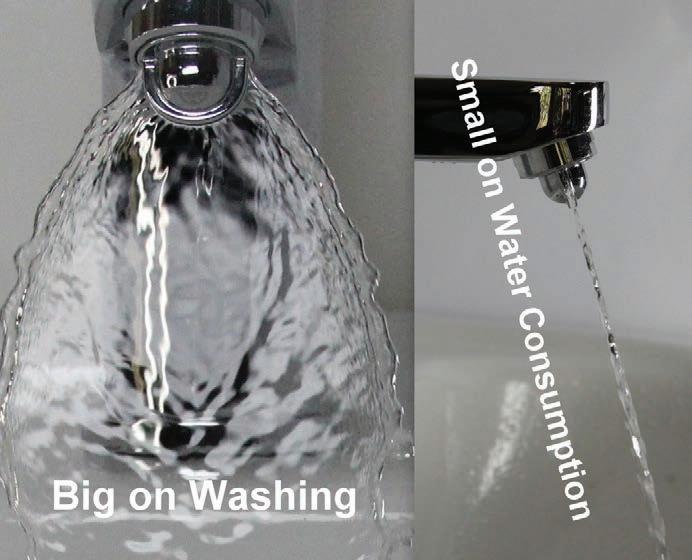
usage by around five per cent, and even reduce your whole building energy usage by one or two per cent
as well. This can be implemented with minimal fuss in a day, and produce year on year savings for building owners with a Return On Investment of three to six months.
We know that if you fit a Waterblade to one of your taps, in minutes, you shall very quickly be able to assess the benefits of fitting it to all your washroom taps, and show it to other stakeholders. So we are happy to send you a free sample.
Note; We are confident in our ability to credibly back up all the claims we make about our product, and happy to share trial and other data should you request. Waterblade is UK manufactured and WRAS approved.
MONTH IN FM TO ADVERTISE IN MONTH IN FM PLEASE CONTACT DANNY.GRANGE@KPMMEDIA.CO.UK OR CALL 01322 476811 APRIL 2022 50
www.heras.co.uk/products/detection/fence-mounted-detection
THE
www.thewaterblade.com nigel@thewaterblade.com 07956 247392 around







Glasgow: : 0141 956 7764 www.dtgen.co.uk Will you feel the impact of changes to tax relief on red diesel? If you’re concerned about the rising cost of diesel, talk to our team about: Fuel management Alternative fuel New technology
SNICKERS NEW LITEWORK WORKING CLOTHES
Long-lasting, innovative new fabrics for comfort, sustainability and longevity. Clothes change as the seasons do. That’s why Snickers Workwear’s LITEWork working clothes combine superior comfort and protection for working in spring and summer on site.
With sustainability at the core of every garment, the new LITEWork range combines all the features of highperformance sportswear. Its 37.5® Technology fabric technology is quick-drying and functional as well providing UPF 40+sun protection. It’s also longer-lasting – and more sustainable - than other comparable workwear.

There’s new Trousers, Shirts, Shorts, and Jackets and a High-Vis range with new styles and stretch features for enhanced freedom of movement plus trousers that feature the bio-based Sorona® fibre for a more sustainable approach.
So, to make sure you get the right comfort, durability and ventilation, check out the LITEWork garments for precisely the right clothes to fit your workday and your carbon footprint!
www.snickersworkwear.co.uk sales@hultaforsgroup.co.uk 01484 854788
JANGRO EXPANDS TEAM TO SUPPORT NATIONAL ACCOUNTS OFFER


Independent janitorial distribution network, Jangro, is delighted to announce two new appointments. General Sales Manager, Sue Gernon has been brought in to head up the national accounts division, whilst Tim Corbett, who joined the team late last year, has been appointed as Business Development Manager. Their addition strengthens Jangro’s senior team, and will help the company to continue building on its great customer o er. As the UK and Ireland’s largest network of independent janitorial distributors, Jangro is able to o er its national account holders fantastic benefits.
Firstly, Jangro can reduce its customers’ costs. With 47 members in the network, it has superior buying power so can o er competitive prices. It can also help reduce customers’ overall spend, by rationalising products required and building a smaller, and more cost-e ective range for sites. In addition, it combines national coverage with a local, fast and reliable delivery service.
National account holders can also stay in control of their spending thanks to Jangro’s budget management system. Consolidated invoicing and management reports can also be accessed via a state-of-the-art e-commerce ordering system, which can be integrated with big name ERP systems such as Sage, SAP and Merlin.
Jangro’s unique health and safety compliance solution, called Site Manager, is also available to national account customers. It contains hundreds of Safety Data Sheets, COSHH risk assessments and process risk assessment documents.
www.jangro.net/national-distribution
ASHBURTON TRIANGLE MIXED-USE
DEVELOPMENT
INSTALLS ADVANCED FIRE PROTECTION
A hat-trick of fire protection solutions from UK manufacturer, Advanced, is now installed at a sought-a er, mixed-use development just metres from the Emirates Stadium, home to premiership football club, Arsenal.
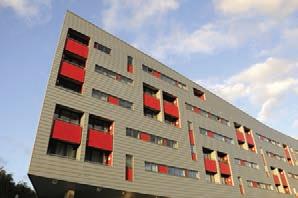
Three 8-loop, one 4-loop and one 2-loop MxPro 5 fire panels, as well as a LifeLine paging system and a custom-built 16-way peripheral relay panel have all been installed at Ashburton Triangle in Islington, London. Located on the iconic site of the Emirates Stadium, the 12-floor complex developed by Newlon Housing Trust consists of 249 apartments and the Arsenal Museum.
The fault-tolerant network of eight panels is installed alongside approximately 3,500 Nittan devices and integrates with a host of third-party solutions, including the site’s intelligent escape signage, sprinkler system, li s, door access and individual apartment and roo op dampers.
The MxPro 5 fire system is also integrated with the LifeLine paging system, used by the onsite concierge team for sta alert purposes. For increased safety, Ashburton Triangle’s fire system has been set up to communicate with the Emirates Stadium’s fire system, signalling to the stadium when its alarm has been activated, and vice versa.

Responsible for the supply and commissioning of all equipment, on behalf of Newlon Housing Trust, were Somerset-based, Coomber Fire and Security Systems who have installed Advanced’s fire protection solutions for almost 20 years.
www.advancedco.com


FORBO LAUNCHES INNOVATIVE TOPSHIELD PRO FINISH FOR ITS MARMOLEUM COLLECTION



To meet the ever-changing demands of today’s commercial interiors, Forbo Flooring Systems has launched an improved version of its water-based lacquer, applied to its Marmoleum collection: Topshield Pro. O ering three times better protection than its predecessor, Topshield Pro will further protect the integrity of the design, whilst facilitating easy cleaning and maintenance.

Manufactured from 97% natural raw materials and CO2 neutral (from cradle to gate) without o setting, Marmoleum is Forbo’s own brand of linoleum and is one of the most sustainable flooring solutions available on the market. As a company, Forbo believes in creating better environments, which is why it is has invested in Topshield Pro to ensure its Marmoleum collection performs to the best of its ability when installed.
Now the standard protection for Forbo’s Marmoleum collection, Topshield Pro has been independently tested, with results showing that it o ers three times better protection than its predecessor. The two-layer system of the Topshield Pro surface finish technology means the floor covering is much more resistant to wear and tear, as well as stains – including stains from hand disinfectant gels and infection control systems – ensuring a better appearance over a longer life cycle.
www.forbo-flooring.co.uk/TopshieldPro
www.forbo-flooring.co.uk/marmoleum
MONTH IN FM TO ADVERTISE IN MONTH IN FM PLEASE CONTACT DANNY.GRANGE@KPMMEDIA.CO.UK OR CALL 01322 476811 APRIL 2022 52
01204 795 955
AI-POWERED SYSTEM FROM HIGHLIGHT PARKING HELPS PREVENT CATASTROPHIC FIRES BY DETECTING SMOKE OR FIRE IN SECONDS
Key to preventing the devastation, damage and injury caused by fire is early detection.
Highlight Parking has launched its AI-powered Smoke and Fire Early Warning System S.A.F.E., which detects smoke or fire within just a few seconds in any environment where there is a risk of fire. This means emergency services can be alerted sooner and prevent a fire spreading out of control.
Why S.A.F.E.?
One particular fire that made the news, was at King’s Dock multi-storey car park at the Liverpool Echo Arena on New Year’s Eve 2017. By the time the fire service had been alerted, the fire had been burning for 13 minutes, and despite their quick response, it was too late; 1,200 vehicles were destroyed, and the insurance bill was a massive £20 million. Thankfully nobody was injured. It was this fire that inspired Highlight Parking to begin developing S.A.F.E. to help prevent similar events in the future, not just in multi-storey car parks but any large commercial or public building.

“We developed S.A.F.E. because conventional fire systems in car parks are based on heat
detection, which means a fire may already be out of control before the alarm is raised, as was the case at King’s Dock”, explains David Harrison, MD at Highlight Parking. “Obviously, fire safety is extremely important to car park operators as well as building owners, and Chief Fire O icers cite speed of response as absolutely critical when it comes to preventing a fire disaster, like the one in Liverpool. S.A.F.E. provides this.”
How it works
S.A.F.E. works with around-the-clock unattended monitoring, automatically detecting the presence of any smoke within seconds. Connected to a cloud application, S.A.F.E. immediately triggers a visual and audible alert, with email/SMS warnings sent automatically to smart devices and to control room screens. S.A.F.E.’s AI capability means that smoke can be detected as fast as the human eye, rather than waiting for flames to reach the car park’s ceiling mounted fire wire detectors. The outcome is that emergency measures can be put into practice far more quickly, so the likelihood of serious damage or injury is dramatically reduced.
S.A.F.E. in action
S.A.F.E. in action
FTSE 100 company, Severn Trent Water in Coventry has implemented the S.A.F.E. solution at its headquarters’ multi-storey car park. With 15,000 employees, it is no surprise that health and safety is of paramount importance to the organisation.
Richard Carney, Project Manager at Severn Trent comments: “The S.A.F.E. system was a guaranteed investment for us. We did of course have a fire alarm system in the car park but, S.A.F.E. provides a far quicker response; we timed it at between seven and eight seconds compared to 12 minutes for our existing system.”
Not just for car parks
While S.A.F.E. has been developed for car parks, its AI so ware can be implemented in any other space where there is a fire risk, such as foyers, cafeterias, warehouses, storage facilities, retail and other large buildings. The system can be installed by uploading Highlight’s proprietary S.A.F.E. so ware to an existing or new CCTV camera system.

Using its AI technology, Highlight can also develop specialist bespoke solutions for any internal or external monitoring or information gathering.

MONTH IN FM APRIL 2022 53 FMJ.CO.UK
www.highlightparking.co.uk 020 8769 7730
IS YOUR LIFT READY FOR THE ANALOGUE TO DIGITAL SWITCHOVER?

The digital switchover of telephone lines in the UK is happening now. By 2025, Openreach will have phased out all copper analogue telephone lines in favour of optical fibre networks.
What the digital switchover means for you
If you are a building manager you may already be aware of the need to change phone lines in your building, but may not have realised that your li s will be a ected by the Public Switch Telephone Network (PSTN) switch o .
Some li s in buildings have an alarm, enabling passengers to communicate in an emergency situation. With the analogue to digital switchover, li owners must now manage the transition of their emergency alarms from analogue phone lines to other digital alternatives.
The digital switchover will not happen overnight
and work is being completed in phases across the UK.
However, being prepared for this, understanding the implication for your li , and choosing the right solution for your li ahead of time is essential to
www.stannahli s.co.uk/digital-services
SWEDISH PROPTECH ENCOURAGES EMPLOYEES BACK
TO THE OFFICE
Hybrid working is on the rise. In a recent research study by CBRE, 73 per cent of business leaders responded that hybrid working would be part of their longterm o ice strategy – and facility managers are the ones leading the quest to encourage people back to the workplace. This Swedish Proptech solution is now assisting FMs in making the o ice a more appealing destination for employees around the globe.
Flowscape Solutions, a company that has been one of the driving innovators within the smart o ice segment, believes that the technological trends in 2022 will be centered around downsizing o ice space, increasing collaboration opportunities on-site and adapting hot desking for individual work.
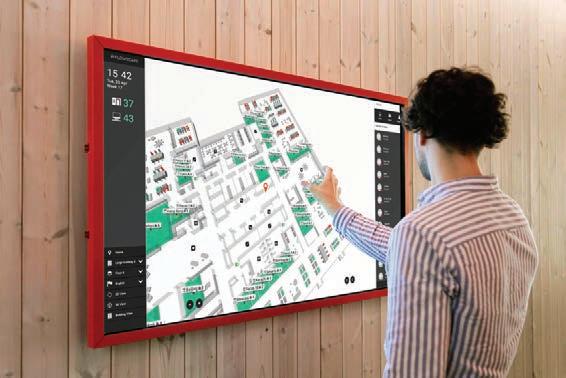
Learn more about how your business can make the hybrid workplace possible; Flowscape provides free consultations for any business looking to motivate more people to get back to the o ice.
www.flowscapesolutions.com sales@flowscapesolutions.com
keep your li s compliant and your passengers safe.
About GSM, the ‘digital’ phone line alternative
One option as part of the preparation for the digital switchover is GSM. GSM telephony provides a reliable and cost-e ective digital solution for most existing li s. Without the need for physical phone lines and installations, a GSM module can be easily installed and battery-backed to provide a failsafe in the event of a power outage.
SIM management from the experts
Stannah’s new portfolio of digital services includes a managed SIM service, which covers the cost of calls, line rentals and 24/7 connectivity monitoring, o ering peace of mind to li owners, improved product safety for users and reduced risk for the owner. For more information, visit the Stannah website to find your local service branch.
2N TELEKOMUNIKACE RECEIVES LENELS2 FACTORY CERTIFICATION UNDER LENELS2 OPENACCESS ALLIANCE PROGRAM




Seven di erent 2N® IP intercoms interface with LenelS2’s OnGuard® access control security system

2N Telekomunikace today announced that it has received LenelS2 factory certification and joined the LenelS2 OpenAccess Alliance Program (OAAP). All intercoms with the 2N OS, including the 2N® IP Style, interface with the OnGuard® access control system, bringing together the complete linking of access, alarm, video and audio events.
“2N Telekomunikace has completed required factory testing at LenelS2 to validate the functionality of its interface to the OnGuard system. This gives operators a holistic view of the building right from the front door or entrance gate so that they can react more quickly and appropriately if any incident occurs,” said John Marchioli, OAAP Product Management, LenelS2. “We look forward to 2N’s continued involvement in the LenelS2 OpenAccess Alliance Program.”
“The interface between 2N’s IP intercoms and the OnGuard access control system is a big step forward for our company,” said Michal Kratochvíl, 2N’s Chief Executive O icer. “It enables security operators to monitor their intercoms through one comprehensive security platform, making their lives easier and helping them keep their buildings safe.”
www.2N.cz www.2n.com/en_GB/
www.lenels2.com/en/us/
MONTH IN FM TO ADVERTISE IN MONTH IN FM PLEASE CONTACT DANNY.GRANGE@KPMMEDIA.CO.UK OR CALL 01322 476811 APRIL 2022 54
analogue to digital switchover, li owners must and work is being completed in phases across the
PROTECTING CRITICAL RESEARCH EQUIPMENT AT THE UNIVERSITY OF WARWICK

The University of Warwick’s (UoW) new Interdisciplinary Biomedical Research Building (IBRB) brings together 300 biomedical researchers from across the School of Life Sciences and Warwick Medical School to fight human diseases.
The new IBRB builds on UoW’s existing worldclass research in neuroscience, microbiology and infection, cell biology, and disease models, supporting and facilitating interdisciplinary biomedical research of the highest quality.
Representing an investment of over £50m, the IBRB provides the two schools with a world-class environment in which to train future generations of biomedical researchers.
In June 2020, during the COVID-19 pandemic, a Kohler PowerWAVE 8000DPA 100kVA was installed in the IBRB’s new services room located in the basement. This new UPS system was commissioned to support a network of critical power outlets throughout the building. These are used for designated equipment that must continuously function throughout a power disturbance, including analytical and monitoring systems that form part of critical experimental equipment. Based on the initial load, a 100kVA system was selected with 20-minutes battery autonomy, an external bypass switch, cable box for top entry cabling plus site load bank testing to confirm everything was working and delivering what it should.

e iciency of up to 95.5%, low THDi and a near unity power factor the PowerWAVE 8000DPA UPS system does this whilst minimising environmental impact and ensuring a low cost of ownership.

If the protected equipment were exposed to a power failure, it would result in months of research being lost, key results invalidated, and crucial samples destroyed. Ultimately, this would lead to a significant delay in the research of diseases for the general public. With the designated KUP system in place however, power dips will not result in equipment resets, and any spikes will be prevented from reaching and damaging sensitive components. If the power fails completely, the battery backup system will immediately begin supplying power until the mains power is restored or the onsite standby generator comes online. Featuring energy
Paul Holland, Electrical Design Engineer, University of Warwick, comments: “We set out to find a reliable partner that was able to demonstrate innovative, low energy and low maintenance solutions with a commitment to sustainability. The Kohler PowerWAVE 8000DPA system was chosen because of its superb energy e iciency, allowing us to keep running costs low. The small footprint and an innovative, fully modular design improve resilience compared to standalone UPS systems by removing single points of failure. The design also enables 100 kVA to be installed now and another 80kVA to be installed later in 20 kVA steps – this both future-proofs the building and further reduces running costs compared to buying and running a 180 kVA unit right from the outset.”
Nigel Harrington, Power Protection Specialist at KUP continues the story. “Whilst lithium-ion batteries were considered, their cost and the lack of recycling infrastructure meant VRLA (valve regulated lead-acid) batteries were chosen. VRLA batteries are around a third of the cost and with a well-established recycling infrastructure – they are 98% recyclable. The batteries are housed in robust racks, a solution that combines the best protection for safety, access for maintenance, and
www.kohler-ups.co.uk




ventilation to avoid heat reducing their lifetime. As is good practice, the UPS room is fitted with an air conditioning unit to control temperature. By keeping the batteries at the right temperature, the lifetime costs are also reduced. In terms of monitoring, the maintenance friendly new system communicates with the IBRB Building Management System, allowing the Estates Team to monitor the system and have full peace of mind.
“Whilst the system is covered by a KUP maintenance agreement that should avoid any unforeseen issues, the monitoring system will also provide useful information if a problem does occur. The open protocol nature of the system allows integration with third party systems, in line with the University’s smart buildings strategy, and will allow an engineer to arrive informed and if necessary, with suitable spares to resolve any issues swi ly. This is one of the ways that KUP’s Field Service Team achieves a first visit fix-rate of over 90% and the company is ranked so highly when we analyse our monthly customer satisfaction surveys and feedback.”
To conclude, the new Kohler PowerWAVE 8000DPA system, coupled with KUP’s support, provides an e icient, dependable, and innovative solution as expected by the University of Warwick Estates Team and will be there to support the critical research being undertaken whenever power disturbances threaten to interrupt it.
MONTH IN FM APRIL 2022 55 FMJ.CO.UK
NORTHWOOD TO SHOW THREE INNOVATIVE RANGES AT INTERCLEAN STAND NO: 11.403
Northwood Hygiene Products Ltd – the leading manufacturer and supplier of away-from-home (AfH) professional paper hygiene and wiping products – will be showcasing an impressive collection of products at Interclean.
Taking centre stage at the show is Northwood’s comprehensive new Raphael range, which enables organisations to maintain even the most demanding washrooms e iciently, whilst also saving money and reducing waste.
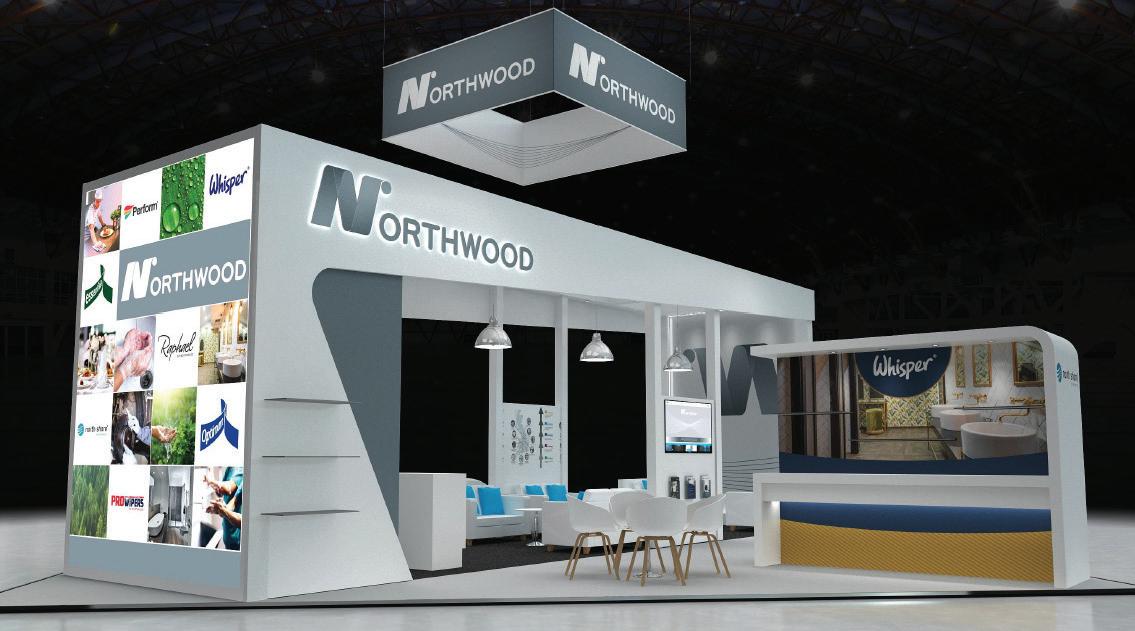
Bringing the TwinJumbo toilet roll dispenser – the industry’s first twin jumbo high-capacity proprietary toilet roll dispenser – which holds up to 800m of roll, the Raphael collection includes two toilet tissue and four hand towel dispensers, plus a soap dispenser. Raphael’s long-lasting Infinity paper system helps to eliminate waste and deliver cost savings by only allowing one roll to be used at a time. The roll towel dispensers
hold up to 250m each and provide approximately 500 dries, with some o ering stub-roll transfer to ensure zero waste.
Northwood’s recently expanded Whisper range of premium pure pulp toilet rolls, facial tissues and airlaid hand towels will also be on show.
Providing supreme comfort, luxury and unmatched
www.northwood.co.uk

NEW SOUTH EAST AREA SALES MANAGER AT CONDAIR
Humidity control specialist, Condair, has appointed Darren Bryant as its new Area Sales Manager for the south east of England. Having worked at Condair for 12 years, Darren moves from his previous role of Service Sales Manager.
Darren comments: “I am very happy to have taken on the area sales manager position, across both humidifiers and dehumidifiers, and am now responsible for much of the south east of England, from Kent to Su olk, including East London. I’m looking forward to getting to know our customers in these regions, and helping them improve their productivity and working environments through enhanced humidity control. It will also be great to be back in front of clients, providing CPD training, either in-house or online.”
David Marshall-George, UK Sales Director at Condair, comments: “It’s great to have Darren join our UK sales team. He is very experienced in all aspects of humidification, and brings with him superb application knowledge from his service-related sales work at Condair.”

Condair Ltd has comprehensive sales coverage across the country with seven sales managers covering all of the UK and Ireland.
The Condair Group is the world’s leading specialist in humidity control and evaporative cooling, with energy e icient, hygienic and innovative technologies for commercial, industrial and heritage applications.
www.condair.co.uk

performance, Whisper is the ultimate product for customers who do not want to make compromises. Whisper Green – the first 100% recycled luxury toilet tissue in the range – will be at the show for the first time.
The North Shore premium proprietary washroom dispenser system will also be on the stand. With a comprehensive range of dispensers and compatible products, North Shore is easy to maintain, durable, hygienic and environmentally sustainable.
O ering industry-leading capacity and supreme cost-in-use benefits, the range includes the Orbit four roll infinity dispenser, which has a capacity of up to 5,000 sheets of toilet paper.
Part of the Northwood group of companies, Dicepa Papelera – the Spanish-based producer of napkins, paper towels and roll – will also be displaying its range of double point napkins, which is available throughout Europe.
XL LITTER BIN TO COLLECT MORE WASTE
Leafield Environmental, the UK’s leading designer and manufacturer of litter and recycling bins are proud to have designed an extra large (XL) litter bin to help local authorities collect more waste and achieve the UK’s target to be net zero carbon by 2050.
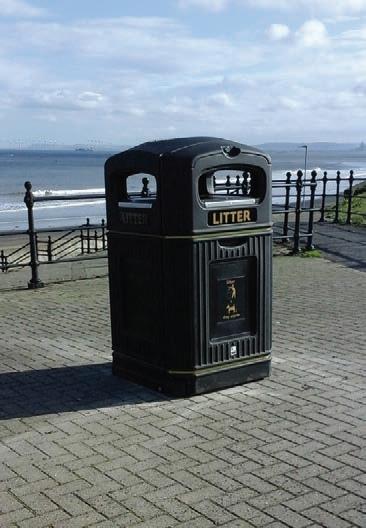

Leafield’s best-selling Heritage Square XL Litter Bin houses a 240-litre wheelie bin inside allowing more than double the amount of litter to be collected than a standard litter bin. The wheelie bin makes it easy and simple to empty. Its robust double wall structure for ultimate rigidity and durability makes it ideal for all-year round use. The bin allows space for up to four posters to use to promote campaigns or place advertising. Bespoke colours and personalisation of labels are available upon request. Dimensions: 1415mm (H), 800mm (W) & 850mm (D).
The Heritage Square XL is also available as a recycling bin due to the increased demand for on-the-go recycling. It is the same unit as the Heritage XL Litter Bin, but it can collect mixed recyclables that is clearly identified by the WRAP compliant labels and aperture colour.
Leafield’s standard black bins are made from up to 100% recycled material*.
www.leafieldrecycle.com recycle@leafieldenv.com
MONTH IN FM TO ADVERTISE IN MONTH IN FM PLEASE CONTACT DANNY.GRANGE@KPMMEDIA.CO.UK OR CALL 01322 476811 APRIL 2022 56
01225 816541
FOR THRII-THINKERS IN WASHROOM DESIGN
e iciency in one aesthetically pleasing package.”

Architects, building operators and facilities managers will be able to include this innovative product in their washrooms where the client and the project demands a modern, space-saving and intuitive tap for improved hygiene. The ThriiTap+ promises to take washrooms into the next phase of their evolution. It features a fully customisable soap, water and air cycle, delivered through a selectable liquid or foamed soap outlet, a high-e iciency water supply and high-velocity air outlet. Through management of its handwashing features, the ThriiTap+ reduces its water usage and power usage compared to traditional hand washing methods. As standard, the ThriiTap+ is fitted with a 1.9lpm aerated water outlet for maximum e iciency and is also supplied with alternative outlets for individual selection, enabling the flow rate to be customisable, maximising its BREEAM rating.
2
022 sees the launch of the world’s first and only 3-in-1 washroom tap. The ThriiTap+ is set to revolutionise washroom design, developed by Wallgate, the market leader and specialist in the design and manufacture of e icient, innovative, washroom and water management solutions.
The technologically advanced and aesthetically pleasing ThriiTap+ combines soap, water and air in a single tap, removing the need for separate dispensers, its compact design and clever use of space reduces movement, improves footfall and will look good in any washroom setting.
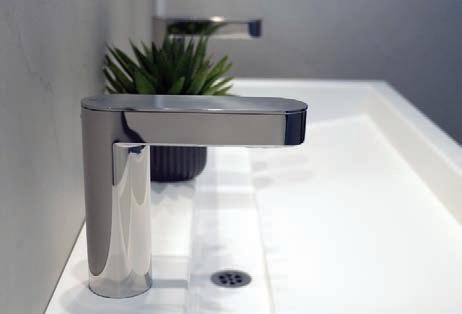
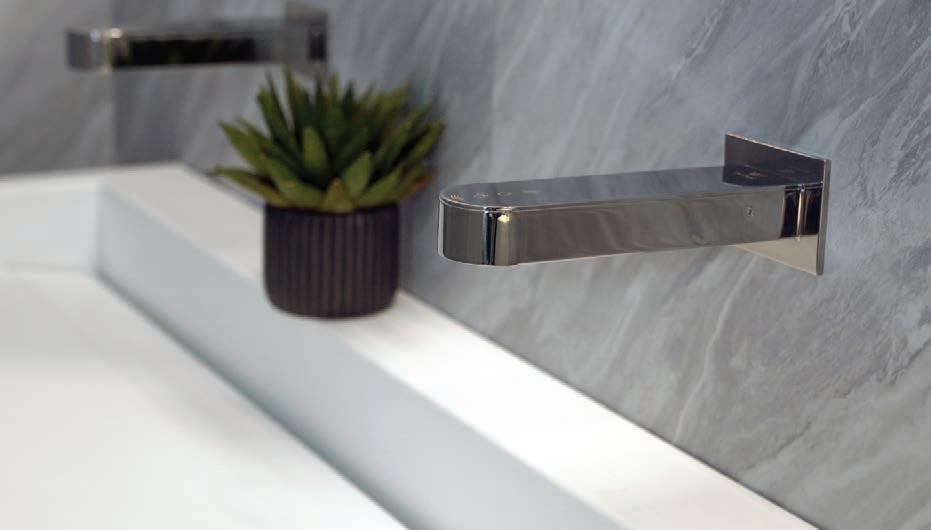
The new ThriiTap+ comes in two main parts, the deck- or wall-mounted tap and the control module. The control module manages all functions, from the heated air fan motor speed to the soap delivery and water run time. The tap itself contains outlets for soap, water and air, all of which are controlled by a single infrared sensor providing a touch-free handwashing cycle. This is a valuable benefit with increased emphasis on hygiene in the modern
world. By being fully customisable and flexible with installation, it means the ThriiTap+ is able to be adjusted to any facilities preferred handwashing requirements.
There is now no need for separate soap, taps, paper towel dispensers and/or hand dryers in the washroom. The ThriiTap+ not only improves hygiene but also reduces mess within the washroom and minimises maintenance through ease of cleaning.
“We know that architects, building operators and facilities managers want a product that o ers a complete package of aesthetics, flexible installation, e iciency and ease of cleaning and maintenance when designing washrooms,” says Robert Kimber, Wallgate's Sales Director. “We know this because we listen to our users. We see market trends in the products required for projects that architects, building operators and FM’s are requesting and combine this with our 40 years’ experience of providing innovative washroom and water management solutions.”

The new ThriiTap+ incorporates touch-free technology for additional hygiene, while the deckor wall-mounted versions allow for a wide variety of installation options, with independent mounting of the tap and control module. The di erent configurations of ThriiTap+ can be selected for use with a variety of basin or vanity top designs.

Robert Kimber explains “By combining soap, water and air into a single tap, the user can wash their hands in one place for the whole wash cycle. Removing the need for separate dispensers and reducing mess from movement around the washroom. Improving washroom cleanliness and
“I am proud to be involved in the creation of a brand-new product in the washrooms market, which provides a new approach to washroom design and meets with the touch-free washroom requirements of the modern world. The ThriiTap+ enables architects, building operators and facilities managers to provide modern, aesthetically pleasing washroom designs and we look forward to seeing our 3-in-1 hand washing solution being adopted in handwashing practices worldwide” says Robert Kimber.

Architects, building operators and facilities managers will be able to include this innovative product in their washrooms where the project demands a modern, space-saving and intuitive, touch-free hand-washing solution. With its 3-in-1 design and clever use of space that reduces movement and improves footfall, the ThriiTap+ is the smarter way to design hygienic washrooms.
For those looking for more thrii-dom with their washroom designs, visit thriitap.com
https://thriitap.com




MONTH IN FM APRIL 2022 57 FMJ.CO.UK
XLERATORSYNC: A TOUCHLESS RESTROOM SOLUTION

With the COVID-19 pandemic still fresh in the public consciousness, hygiene remains a major topic of discussion and consideration for all facilities. What better area to address first than the restrooms, which are frequently considered a hotbed for germs? For decades, Excel Dryer has been working to change that perception through hygienic and automated high-speed hand dryers. The XLERATORsync®, a component of the D|13 Sink System available exclusively through D|13 Group, is Excel Dryer’s next revolutionary leap.
A Touchless and Hygienic User Experience
The D|13 Sink System featuring XLERATORsync is an intuitive, unified experience with water, soap and air alongside a custom wash basin. It is the product of modern design innovation to create cleaner and more hygienic restrooms, allowing users to wash and dry their hands in one location—all while never touching the system.

comes standard, the XLERATORsync provides an added level of protection against germs. Viral filtration testing conducted by LMS Technologies in April 2020 challenged XLERATORsync with approximately 380 million viruses. When the results came in, the system had successfully removed 99.999% of viruses from the airstream.
Additional System Benefits
The XLERATORsync Hand Dryer from Excel Dryer features adjustable speed, sound and heat controls and a sound suppression air delivery system. The dryer uses a “reverse airflow” design to blow both air and water away from the user, who walks away with clean and completely dry hands. There is no such thing as standard size— everything is manufactured to order— so it fits every restroom perfectly. Facility managers can give their visitors not just peace of mind, but an elevated and hygienic hand washing experience with the D|13 Integrated Sink System and XLERATORsync. https://xleratorsync.co.uk/
AEROKIT’S NEW SUREFILL INNOVATIVE REFILL SYSTEM IS A BIG WIN FOR WHOLESALERS
AeroKit™, the new premium first aid kit with a Surefill™ innovative refill system from Aero Healthcare, is giving distribution partners an exciting, first of its kind opportunity to maximise profit opportunities from both the premium and economy segments of the first-aid market.
Directly addressing consumer data which strongly highlights the ‘uselessness’ of first aid kits with plasters that do not stick and end-user complaints relating to disorganised first-aid kits; AeroKit™ is already welcomed by business customers across the globe.
Incorporating Aero Healthcare’s Surefill™; a four pouch tent refill system that organizes its premium quality contents for maximum protection and accessibility; the entire kit has just one expiry date, enabling simple, easy replenishment with just one refill pouch.
Comprising of the ‘worlds stickiest plaster’ AeroPlast™ with its SupaBond™ extra strong
adhesive, along with an array of enhanced first aid staples, AeroKit’s time saving and practical solution invites significant repeat purchases upon expiration. The uniquely comprehensive Surefill™ refill pouch meets the regulatory requirements for many
di erent industry sectors, and the range includes British Standard First Aid Kits, HSE First Aid Kits, Eye Wash and Burns Kits, Body Fluid, Protection and Travel Kits.
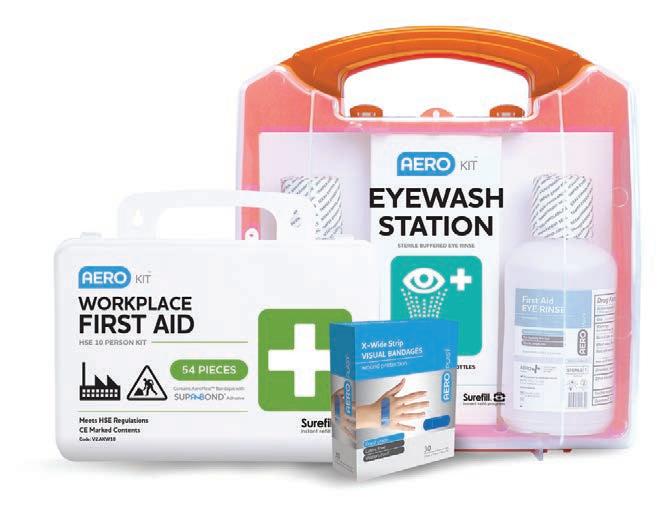
As a global first aid and healthcare leader, Aero Healthcare’s fully harmonized range and surety of supply spans the higher premium market with AeroKit™ and the economy market with the lower-cost A-care range. Committed to helping distributors drive sales and profit opportunities that really stick, Aero provides dedicated account managers to collaborate with wholesalers and merchants to deliver comprehensive category management, along with the alignment of kit for individual customer needs.
AeroKit™ is backed by a long-term launch campaign tailored to drive both trade and end-consumer awareness, with point of sale materials, catalogue material, first aid product training and eye-catching marketing initiatives designed to generate sales. Aero Healthcare really does make it better for the wholesaler and consumer.
MONTH IN FM TO ADVERTISE IN MONTH IN FM PLEASE CONTACT DANNY.GRANGE@KPMMEDIA.CO.UK OR CALL 01322 476811 APRIL 2022 58
Incorporating patented high-speed hand drying technology with a HEPA Filtration System, which
www.aerohealthcare.co.uk/products/aerokit sales@aerohealthcare.co.uk 01403 790704
MEARS GROUP HIRES EMPLOYEE DIRECTOR TO SUPPORT DISABLED EMPLOYEES
The support services group to the social housing and care sectors has recently appointed a new Employee Director, Jay Whistler. Mears is one of the few PLC companies in the UK that has a dedicated Employee Director, and has gone even further with an additional one focused exclusively on helping and supporting disabled employees within the group.
There are 14.1 million disabled people in the UK and more than 4.4 million disabled people are in work. Mears says it is committed to making positive changes in the industry and Whistler will lead the steps supporting activities that promotes the employee experience.
Speaking about the new role, Executive Director, Alan Long commented: “We wanted to create a role specific to the needs of disabled colleagues following our review of how we support our workforce. We want to be a company where individuals can get on whatever their background, and for disabled colleagues I know having Jay keeping up the momentum on this at the board will I hope lead to a fuller working experience.”
CLEANOLOGY APPOINTS NEW OPS DIRECTOR TO AID EXPANSION DRIVE



Cleanology has appointed Juliet Widdicombe to the role of Operations Director.

With over 40 per cent growth in 2021-22 alone, the commercial and o ice cleaning company, says Widdicombe will play a key part in the company’s expansion drive.

Widdicombe has joined Cleanology from Bellrock Property and FM where she was Service Delivery Manager. Widdicombe said: “It is such a privilege to have the opportunity to be in a role which is able influence the way the industry is recognised. Cleaning operatives play a pivotal role in the experiences of our everyday lives and I am excited to be back in the thrusts of this robust industry.”
DIRECTOR APPOINTMENT AT BUSINESS MOVES GROUP
O ice and commercial relocation change management company, Business Moves Group (BMG), has appointed Keith Tiltman as a Director, who will focus on sales and business development across all of the company’s core regions – London, Thames Valley, Birmingham, Leeds, Manchester and Scotland.

Tiltman has extensive experience in workplace and moves management and previously spent seven years as a Branch Manager at Business Moves Group from 1998 – 2005. Between his two stints at BMG, Tiltman has been working for a fit-out company where he delivered furniture management, workplace design, space management and relocation services to clients across the UK.
Rachel Houghton, Managing Director at Business Moves Group, commented: “I’ve followed Keith’s career closely and have no doubt that he’ll be a valuable asset to our team. Workplace design and furniture management will be right at the top of the agenda for numerous businesses in 2022. Keith is the ideal person to advise and support those businesses.”
FACILITIES MANAGEMENT JOURNAL JOBS
www.buildrec.com info@buildrec.com Ifyouarelookingtogrowyourfacilitiesteamacrosssoft services,engineeringorfacilitiesmanagement,ourFM recruitmentteamhavearapidlyexpandingnetworkofjob seekersavailablefortemporary,permanentorcontract vacancies. YOURFACILITIESSECTOR RECRUITMENTPARTNER Formoreinformationabouthowwecanhelpyourorganisation, pleasevisitbuildrec.comorcontacttheFacilitiesManagement teamon02031764793 TOTALFACILITIESMANAGEMENT| ENGINEERI NG|MAINTENANCE Weunderstandtheimportanceoffacilities managementandthosethatworkwithinit.That’s whyweplacesuchemphasisonconnectingleading FMprofessionalswithtopemployers. APRIL 2022 59 FMJ.CO.UK FM CAREERS - PEOPLE
Over the last few years, enthusiasm for switching to a four-day work week has grown. During the pandemic, several countries introduced four-day work week trials. Spain, for example, announced a voluntary threeyear trial of a 32-hour work week. Similar schemes were implemented in Japan and New Zealand.
In January, the 4 Day Week pilot collaborated with think tank Autonomy and researchers at Cambridge University to launch a trial in the UK, aiming to demonstrate that a reduction in working hours increases employee productivity, commitment and motivation. But what are the benefits and challenges associated with the four-day week, are reduced working hours su icient to increase productivity, and is a four-day week practical for the facilities management sector?
EQUAL BENEFITS
One of the key benefits for employers is that a fourday week actually boosts employee productivity through a reduction in hours spent at work. Recent studies indicate that reduced working hours can significantly increase employee productivity. In 2019, Microso Japan introduced a four-day week, without a reduction in pay. Productivity increased by an estimated 40 per cent, and researchers observed an
improvement in employee motivation.
In this trial and others, employees felt that their individual wellbeing was prioritised by employers, resulting in the cultivation of a more positive organisational culture. Studies demonstrate that positive organisational cultures improve sta engagement and foster environments conducive to e ective collaboration.
According to data collected by Health and Safety England, around 1.7 million employees su ered from work-related illnesses in 2021. Almost 50 per cent of absences were due to work-related stress, depression or anxiety. Every year, companies across the UK lose thousands of pounds to absences. Work-related stress is particularly prevalent within the FM sector, with employees frequently faced with unpredictable
in employment work part-time. For context, only 13 per cent of men in employment work part-time. A reduction in working hours could significantly lower the cost of childcare for many parents, allowing women to prioritise their careers.
CHALLENGES FOR FM
Thus far, the successful implementation of the four-day work week has been limited. Opponents argue that a reduction in working hours would be impractical for certain industries, including that of FM. There is some concern, for example, that customer engagement and service quality may be negatively impacted by a four-day week. Others worry that employees would be less adept to deal with emergency situations with increased time spent away from the workplace. We maintain, however, that the four-day work week has the potential to enact positive, tangible change in the FM sector.
Salary: £45,000
challenges, dwindling resources and the pressure to meet budgets. Many employees attribute their stress, depression and anxiety to continuous burnout, an unhealthy work/life balance, and little opportunity to socialise, exercise or prepare healthy meals. A reduction in working hours, no matter how minimal, could help to remedy this, benefitting both the employer and employee.
GREATER EQUALITY AND DIVERSITY
In 2013, FMJ published research indicating a lack of diversity and equality in the facilities management sector. According to the research, very few women attained managerial positions and were underrepresented in many companies.
Inequality continues to blight the industry today, although numerous organisations, such as MACE, So’SPIE Ladies Network and Women in ENGIE, are working hard to advocate for gender parity. A four-day work week, if implemented e ectively, could aid the promotion of equality and diversity. Women are statistically more likely to sacrifice work to fulfil childcare responsibilities than men, with many struggling to a ord childcare five days a week. Statistics suggest, in fact, that 41 per cent of women
FM encompasses an extensive variety of roles and responsibilities, and managers implementing a reduction in working hours must not be tempted to take a homogenous approach to change. For some roles, it may be practical to condense working hours into four consecutive days, with a three-day weekend. Employees in other roles may work more e iciently with a short mid-week break, or by working slightly shorter days.
A commitment to cohesion, communication and collaboration, however, is crucial, particularly for those managing large teams. Facilities managers must demonstrate innovative thinking and a readiness to adapt to change, supporting clients if they decide to implement shorter working hours.
Many facility managers are responsible for coordinating a rapid and e ective emergency response. A reduction in hours must not impede their ability to do this. It may be prudent, therefore, for organisations to assign a deputy, although this will not be financially feasible for small businesses.
The four-day week should not be considered a panacea for low productivity, motivation and commitment, but should instead be implemented alongside other initiatives. Managers should consistently communicate the “bigger picture” to employees, emphasising long-term organisational goals. Training should be prioritised, with a focus on individual and collective development.
If the facilities management sector is to thrive, it must continuously evolve. The four-day week may provide a fantastic way to do this.
FACILITIES MANAGEMENT JOURNAL JOBS
FM? As new trials of the four-day work week are launched in the UK, Hannah Jackson of Henley Training asks, is this style of working beneficial for the FM sector? LATEST JOBS ON FMJ HEAD OF ESTATES ASSET MANAGEMENT
FOUR DAYS FOR
per annum +
FACILITIES SITE SUPERVISOR
Salary: Up to £90,000
Location: UK Wide https://bit.ly/3iTWFBE
Salary: £30,000 to £39,999
AND SITE MANAGER
Location: North London https://bit.ly/3NC5H4b PROPERTY
per annum +
jobs.fmj.co.uk Over 250 jobs live on site FM CAREERS - RECRUITMENT APRIL 2022 60
Location: South London https://bit.ly/3NMQ0r8
AI ACADEMY
Baker, VP Group Sales and Account Management

learning and development to the next level
With increased digitalisation comes an increased need for adaptation. As the world moves online, businesses need to ensure they keep pace, or they risk being le behind in a paperfilled frenzy. Artificial intelligence (AI) has been slowly making its way into all sectors of the business world. From enabling companies to measure Environmental, Social and Governance (ESG) factors, to allowing banks to detect fraud more e iciently. This infiltration of AI is also making its way into learning and development, allowing companies to further invest in their greatest asset – their people. Reskilling and upskilling employees allows companies to be more flexible, adaptable and e icient, however the standard ‘classroom technique’ is, quite frankly, outdated in today’s working world. Employees crave a learning experience that is personalised and in line with their own career aspirations, and AI provides just that; a hyperpersonalised people development platform that can tailor individual learning journeys within an organisation.
INDIVIDUAL EXPERIENCE
Manually curating individual training programmes for each employee is no longer a feasible task for humans alone. Collating this information from each employee and keeping their individual programmes up to date with the latest materials is simply too mammoth a task. Luckily, artificial intelligence and machine learning exist to ease this burden. Placing trust in tech by leveraging an AI-powered platform would not only remove this pressure but would also put employees’ growth and development into their own hands. Rather than waiting for the next round of training sessions or having to continually request to be placed in specific training programmes, employees will have all the growth and development materials they need, anytime, anywhere, at the click of a button.
Employees can create their own profiles on the platform, detailing the skills and competencies they have as well as those they wish to gain. Then, AI can help to match specific learning materials to the individual, enabling them to grow and develop in their

desired areas. No longer are job roles defined by a given skillset, rather they can become fluid according to the skills of the person in the role. Not only does this empower employees with accountability for their career development, it also gives employers a clearer insight into the wider skillset of their company. Leaders will be able to clearly spot any skills gaps as well as identify the appropriate people to fill them.
THE MORE SKILLS THE MERRIER
This digitalised, AI-powered approach to learning and development lends itself perfectly to roles which encompass numerous skills, such as those within the facilities management sector. This sector is known for requiring a number of di erent competencies, such as property strategy, building maintenance and supervising teams, making training di icult to standardise. Leaders also face the challenge of training employees whilst on a client site, which can mean balancing the training of the individual with the needs of the client. But, if FM leverages AI, it would mean that the
relevant training materials are available on all devices, allowing employees to have the flexibility to learn and grow according to their own schedules and be able to build on their skills wherever they are.
Placing employees’ growth and development into their own hands can result in many benefits for the wider business. Employees will feel more empowered with their newfound control over their career and personal goals, resulting in a more motivated and productive workforce. With the potential for career advancement clearly in sight, this encourages internal mobility and eradicates the notion that career development can only be achieved by moving to a new company. Essentially, businesses will be able to train and retain the best talent. This will not only result in huge cost savings from external recruitment but will also allow companies to stay more competitive in the dynamic working world of today.
TIME TO REAP THE REWARDS
AI solutions are cross-functional, and the interpretations they provide can also be used to gain understandings about the wider business. The algorithms used by the platform can uncover patterns, for example, real-time market trends around key skills. This knowledge could then be used to make wider decisions on how to improve departments within the business. Essentially, your company could be sitting on a wealth of untapped skills and introducing a digital career platform would reveal where these skills have been hidden, and where they would be best placed. Furthermore, digitalising processes can give deeper insights into how employees are feeling. A survey conducted and analysed electronically will not only be done faster, but it will be able to draw far more specific insights, than if analysed by humans alone. This will allow leaders to target areas for improvement, making employees feel truly heard.
Businesses who don’t digitalise processes simply will not be able to stay competitive. Leveraging an AI-powered platform would revolutionise the way your team’s function. Letting tech do the heavy li ing will streamline processes, give deeper insights, as well as empower employees to take charge of their own employability.
(i) www.cornerstoneondemand.com/uk/
FM CAREERS - TRAINING APRIL 2022 61
Michael
FACILITIES MANAGEMENT JOURNAL JOBS
EMEA at Cornerstone(i) on how AI can take your sta
Half of employees think parental leave policies are inadequate
Over half (57 per cent) of employees in a new poll think their company's parental leave policy and attitude to new parents is inadequate — with paternity leave for male employees (59 per cent) and maternity leave for female employees (55 per cent) both falling short.
The 2022 Parental Leave Study conducted by Fertility Family, experts in supporting those trying to conceive also found almost a quarter of employees (23 per cent) said that the stress of work a ected their ability to have children.
Glassdoor research shows patchy job satisfaction amongst UK employees
In its anonymous reviews on what employees across the UK really want from work Glassdoor reveals the cities of Bristol, Brighton, London and Manchester plus the Greater London region are the only areas to score above the UK average.
Employees in London are some of the most satisfied in the country, with the UK’s highest scores for 7 of the 8 Glassdoor workplace factors - and over two-thirds of employees (67 per cent) are positive about the region's business outlook.
Companies in the North West topped the scores for diversity, equality and inclusion (3.92) with the South East and Greater London close behind (both 3.91). But it is the cities of Brighton and Manchester that stand apart with an individual rating of 4.01 and 4.00 for this workplace factor. Oxford and Nottingham ranked lowest at 3.88.

Revamped apprenticeship widens career options
A key technical apprenticeship has been revised and updated to improve career development opportunities across the building engineering sector.

The Building Engineering Services Association (BESA) and the Technical Apprenticeship Consortium (TAC) have worked together to enhance the Level 3 Building Services Engineering (BSE) Technician Apprenticeship (2022) so that it better reflects the needs of employers and gives apprentices a more streamlined route to higher level qualifications.

The new BSE Technician apprenticeship now creates a direct route through to Level 4 BSE Senior Technician which has also been recently reviewed by employers, with revisions set for publication later this Spring and gives installers and design engineers the potential to progress to Level 6.
New strategy by Novus Property Solutions aims to increase inclusivity
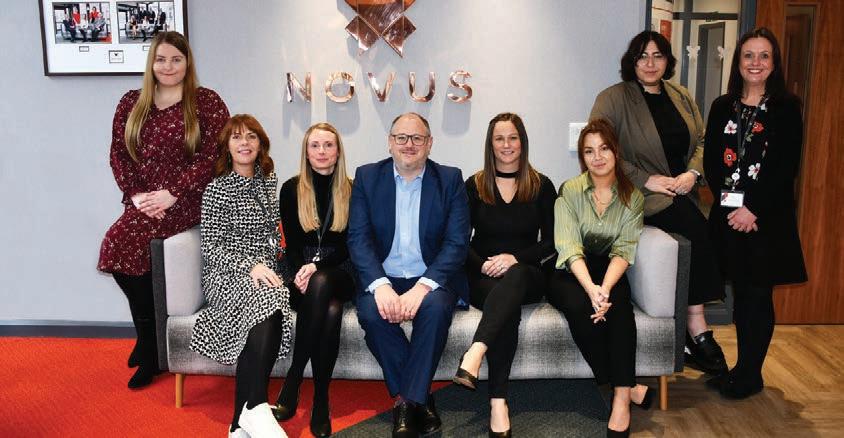
Maintenance and compliance contractor, Novus Property Solutions, has implemented a dedicated strategy aimed at increasing its inclusivity – with a new menopause policy and an enhanced Family Friendly policy.
Novus’ recently launched Menopause Policy will ensure that those experiencing perimenopausal, menopausal, and postmenopausal symptoms are given additional support and flexibility. The enhanced Family Friendly Policy provides enhanced benefits for maternity, paternity and adoption leave, and
the enhancements made regarding health and wellbeing have opened up Flexible Benefits for all colleagues regardless of role. Thanks to the work of the Women in Novus network – which brings together female sta and allies from across every strata of the business to raise women’s profile and work together to create change – Novus has committed to ensuring that every one of its live sites has adequate sanitary disposal bins in toilets, and that clothing and PPE are suitable for both men and women, including pregnant people.
Inclusion, said: “Last year, we set ourselves the challenge of fully embodying Novus’ position as a 21st century employer: this included growth and development targets, but also placed a great emphasis on making our workplaces forwardthinking, inclusive, and supportive environments.
“That means creating an environment where colleagues feel welcome and understood whatever their gender, race, sexuality, or age.”
Elior gifts over £450k to support training and development of future talent
Contract caterer, Elior, has announced its commitment to donate £480,000 of its Apprenticeship Levy to fund apprenticeships in hospitality, healthcare and education over the next three years. It will collaborate with Total People - part of the LTE Grouplocating and appointing apprentices across its portfolio.

The first £100,000 of funding has already been released for Total People to allocate across its extensive network of UK SMEs, with a number of recipients already identified to receive funds to support apprenticeships in the care and hospitality sectors.
Justin Johnson, HR Director at Elior UK said: “The hospitality industry su ered a real blow as a result of the pandemic. We’re keen to help kickstart growth, providing work opportunities in organisations where they’re most needed.
“Working closely alongside clients in education and healthcare, we’ve witnessed firsthand the challenges these immensely valuable sectors have overcome over the last few years. It’s an honour to be able to invest in their regeneration moving forwards.”
FM CAREERS - NEWS FACILITIES MANAGEMENT JOURNAL JOBS
Lee Hartley, Executive Director and Board Sponsor for Equality, Diversity, and
APRIL 2022 62











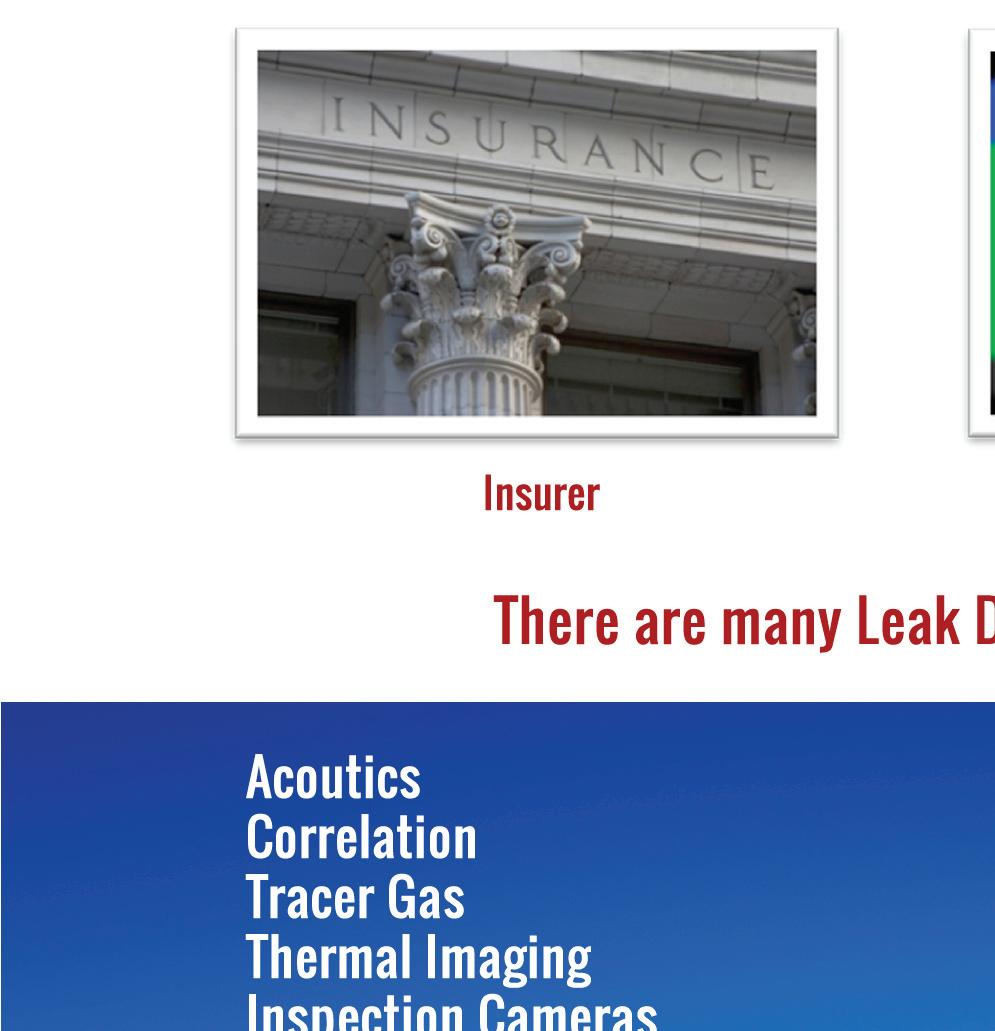

LDS 280x210 bleed.indd 2 LDS 280x210 bleed.indd 2 14/12/2017 12:56 Acoustics Correlation Tracer Gas Thermal Imaging Inspection Cameras Dye and Salt Testing Moisture Detection For more information please contact LDS Tel: 0344 809 4968 www.ldsleakdetection.com info@ldsleakdetection.com


MAGNETIC FILTER AVAILABLE FEBRUARY 2022 HIGH CO2 AND ENERGY USE HIGH CO2 AND ENERGY USE DECREASED PERFORMANCE DECREASED PERFORMANCE ENHANCED PUMP PROTECTION ENHANCED PUMP PROTECTION ENHANCED PUMP PROTECTION IMPROVED WATER QUALITY IMPROVED WATER QUALITY IMPROVED WATER QUALITY SIMPLE MAINTENANCE SIMPLE MAINTENANCE SIMPLE MAINTENANCE IMPROVED PERFORMANCE IMPROVED PERFORMANCE LOWER CO2 USE LOWER CO2 USE LOWER CO2 USE LOWER ENERGY USE LOWER ENERGY USE LOWER ENERGY USE DECREASED PERFORMANCE THERMAL DISCOMFORT THERMAL DISCOMFORT SYSTEM DAMAGE SYSTEM DAMAGE POOR WATER QUALITY POOR WATER QUALITY Y-MAG INTERVENTION